Georgia
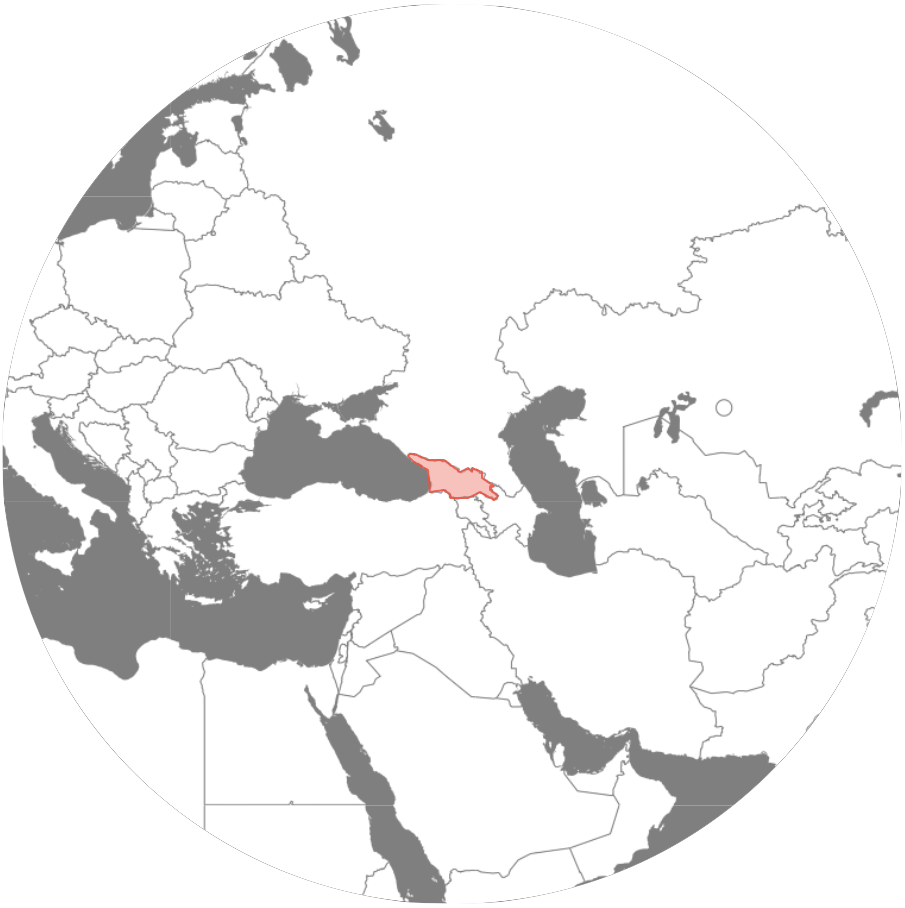
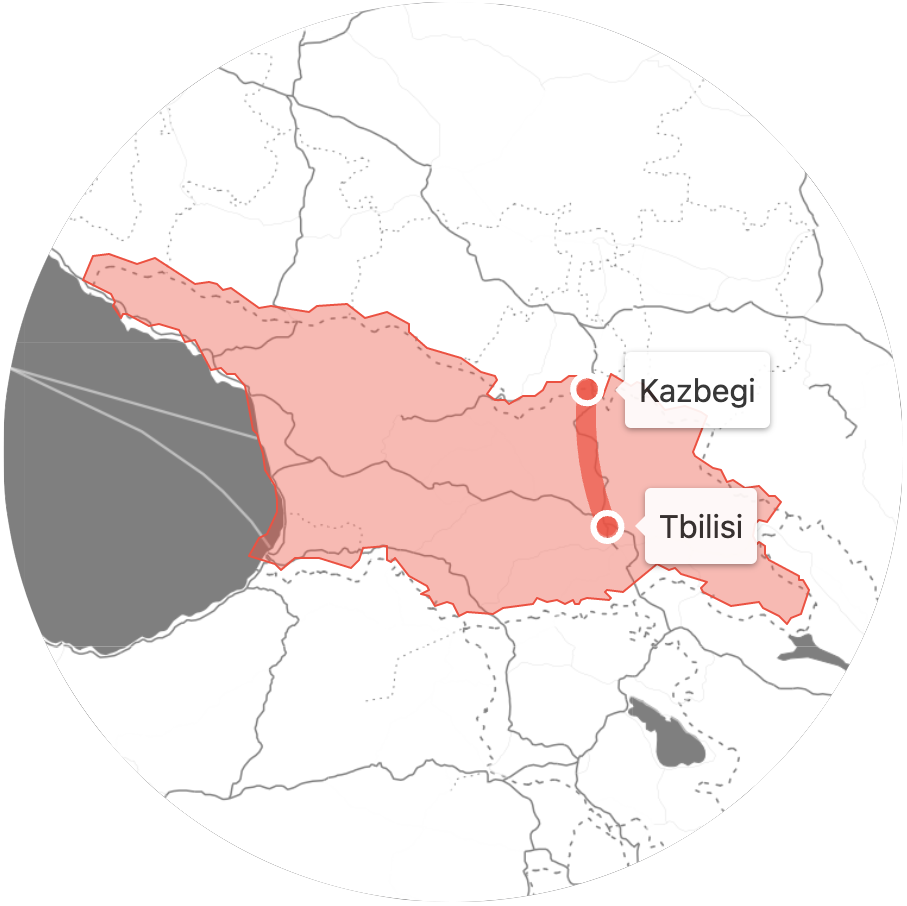
Georgia is in a region called the Caucasus, or Caucasia.01
Caucasus apparently might mean shimmering with snow, or frozen mud, or mountain of the seagulls. Or maybe it was a mythical ancient guy.02 To this day, I do not know how to pronounce it, and so will go to great lengths to avoid using it in a conversation.
Technically, I think it’s sort of Eastern Europe, and sort of Western Asia. It felt somewhat unique. It’s a cool area. I’d like to go back and see more of Georgia and its neighbors.
Tbilisi
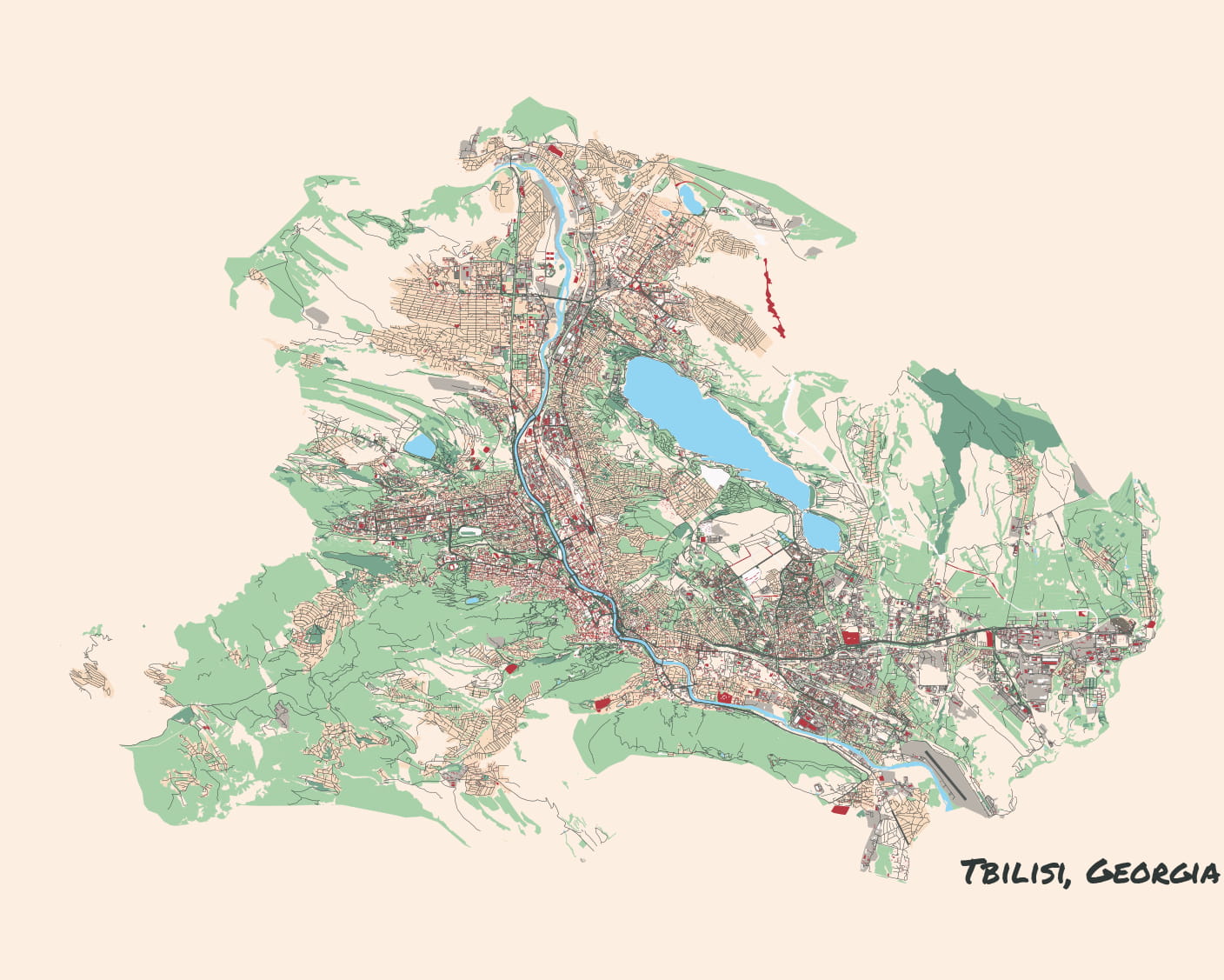
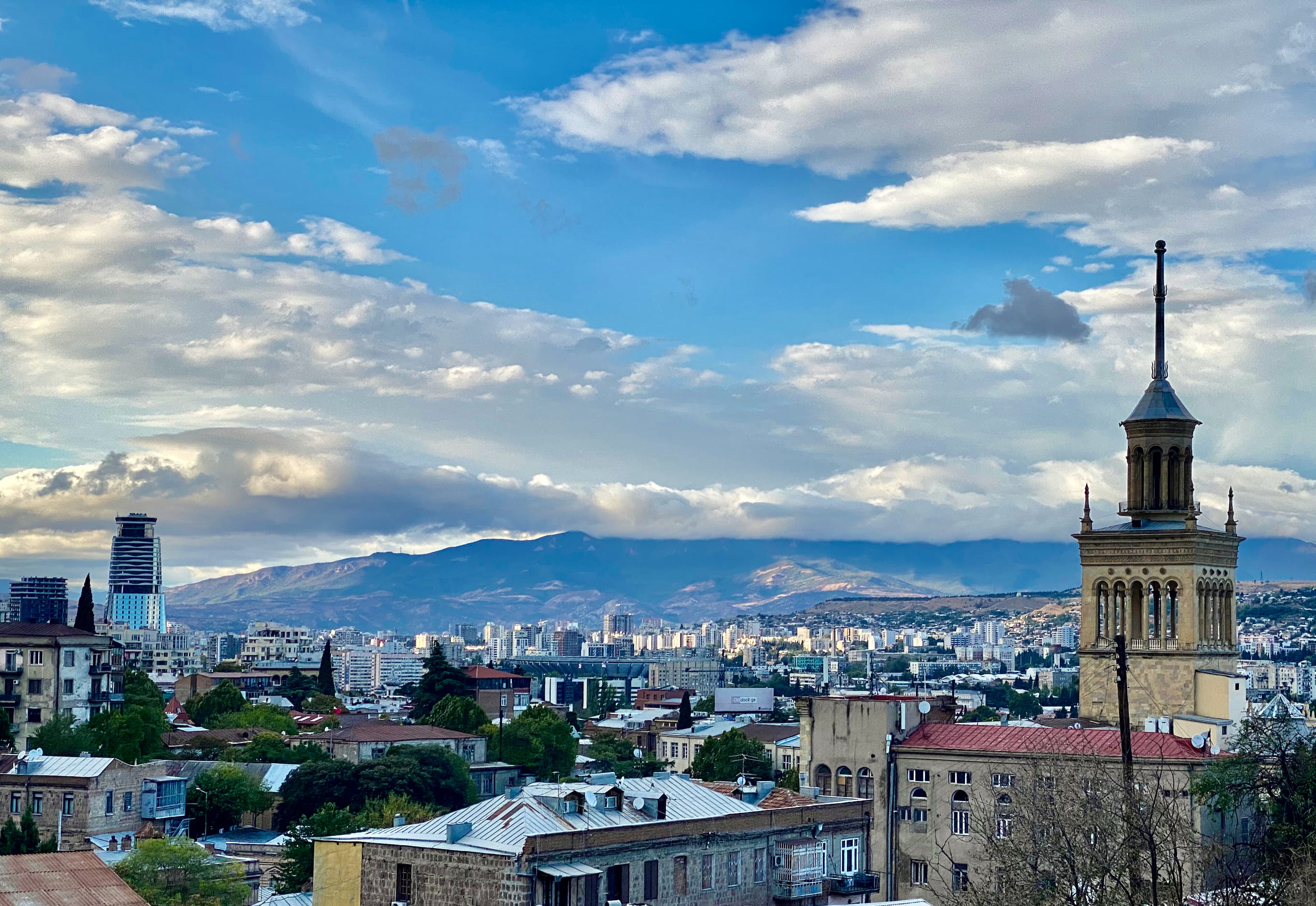
Taking the bus into town in Tbilisi, Georgia’s capital, I was struck by how much beautiful modern architecture there was.
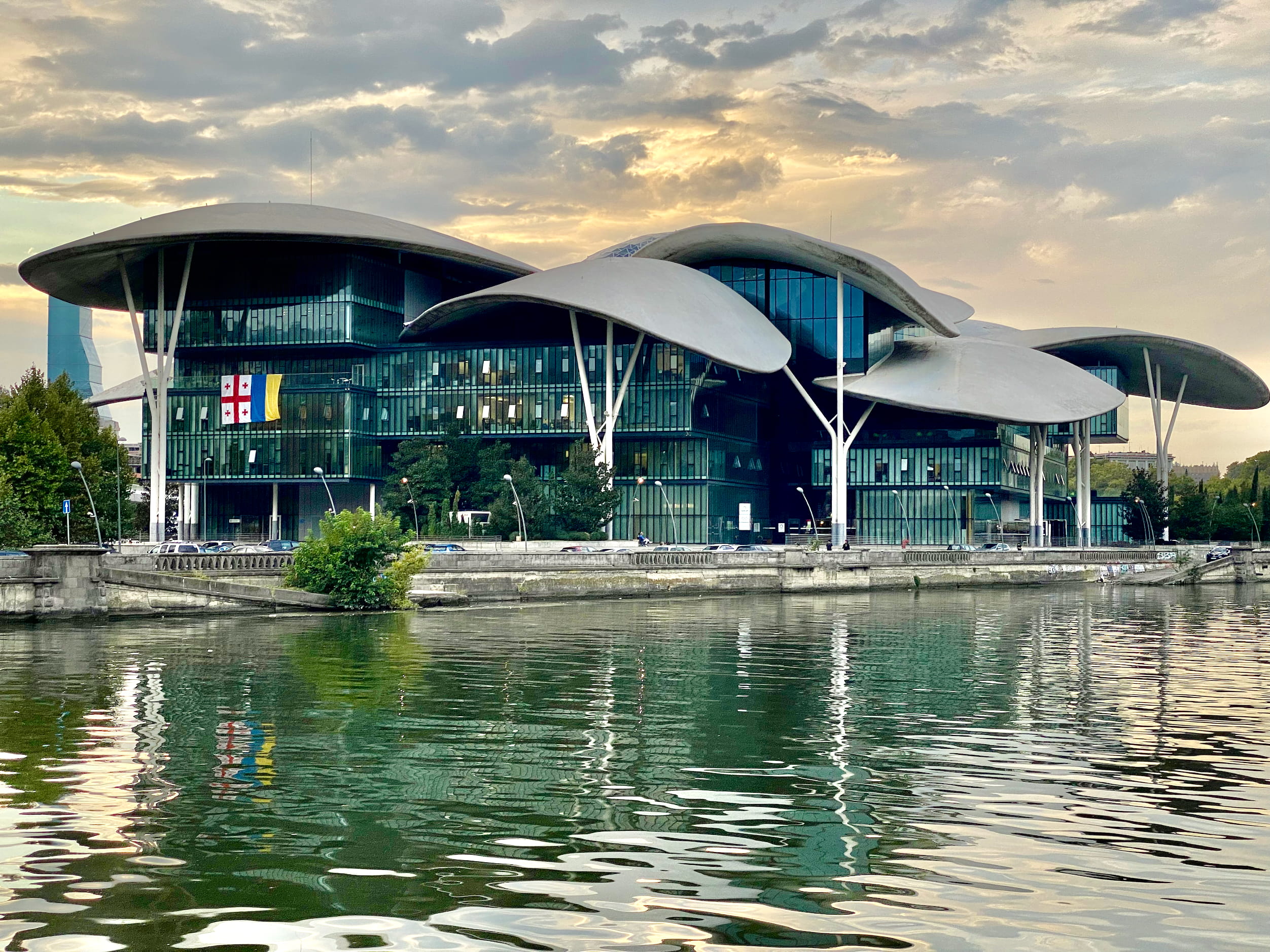
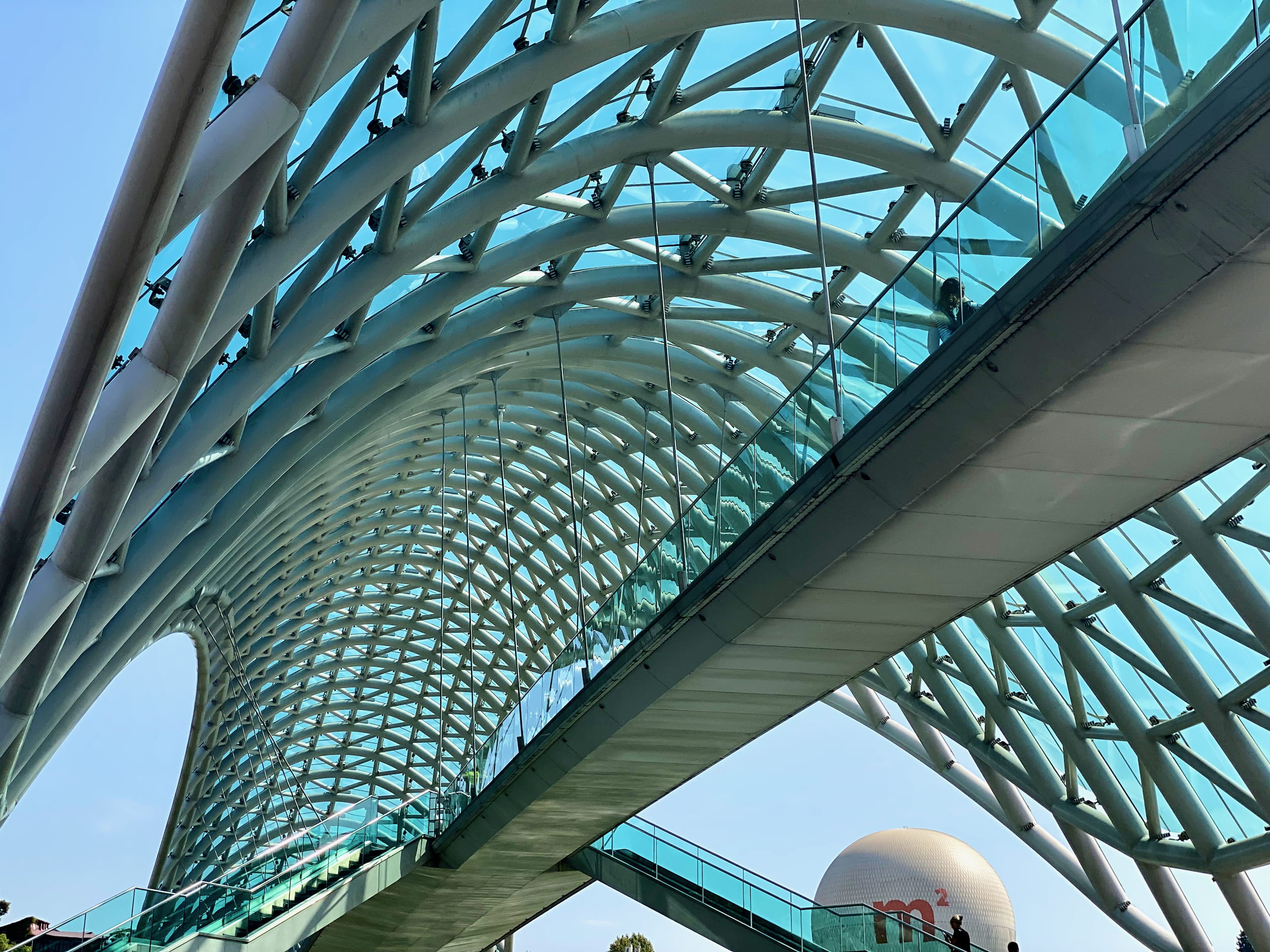
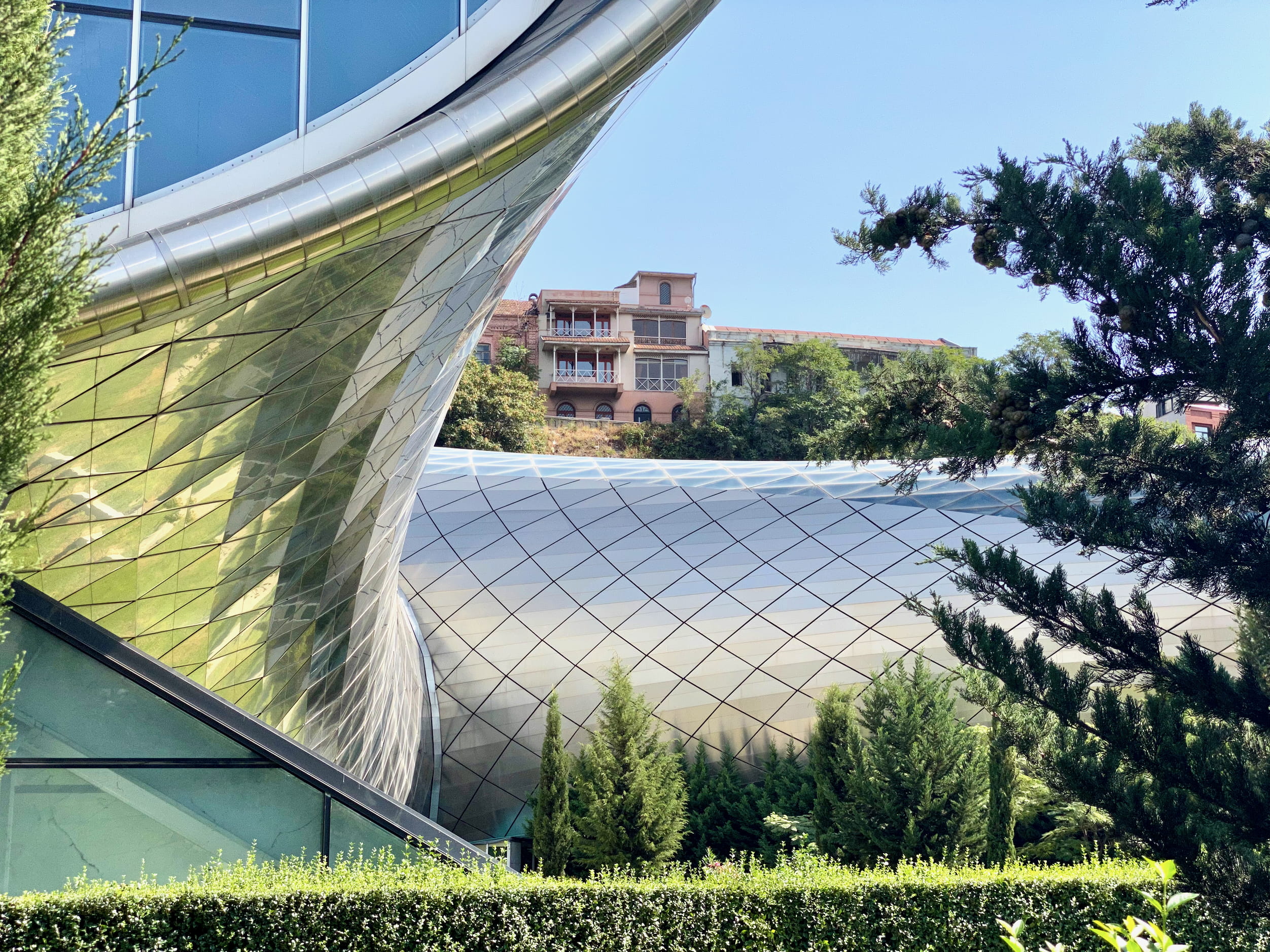
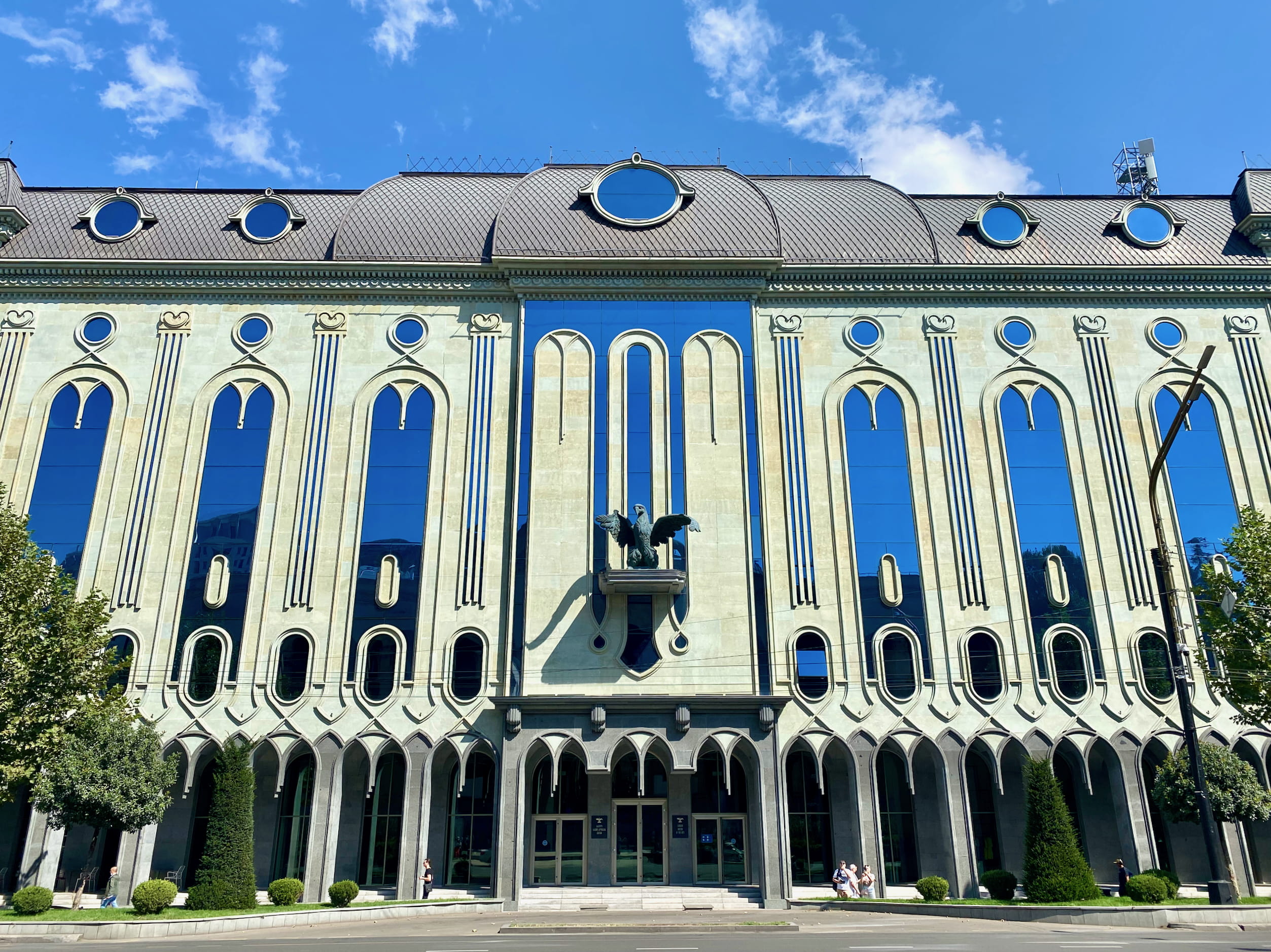
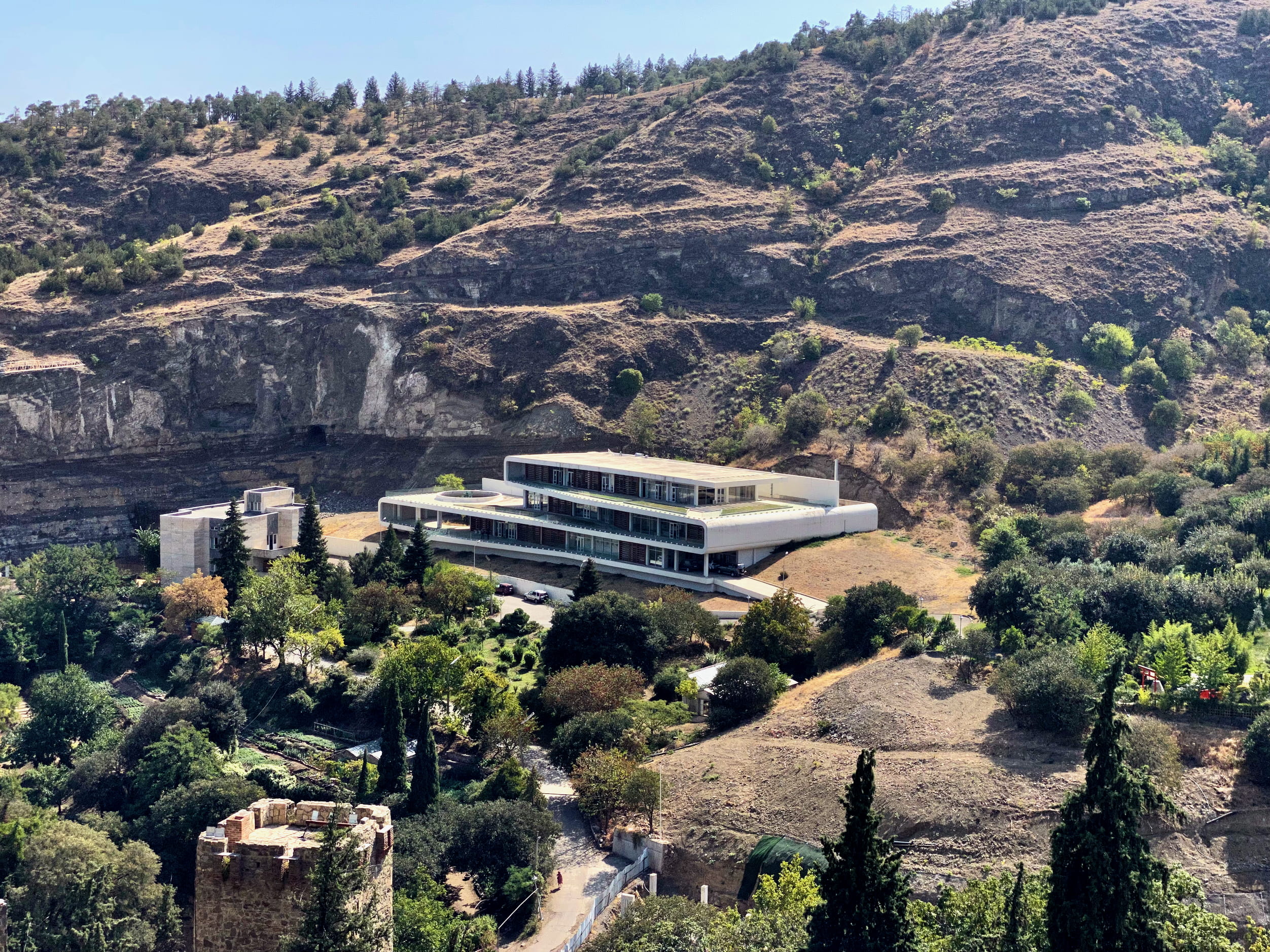
The last one had has evil mountain base vibes, right?
There’s a thrill to not researching a place before you visit. Arriving in a new country and having very little idea what the economic situation is, what the customs are, what’s been going on lately. You could call it temporarily willful ignorance. I find it’s one easy way to get into a spirit of discovery when traveling.03
Georgia is the first—and so far, only—post-Soviet state I’ve been to. I’ve had a vague fascination with USSR era stuff for years, with no genesis I can recall.
If you start looking around, you can find hints of what it’s been like post-USSR. Crumbling buildings on what ought to be prime hilltop real estate. Cavernous museum rooms filled with paintings from a single local artist.04 A rusting but glorious comms tower in an ancient half functioning amusement park. And a subway whose platforms are carved so deep underground that you must ride bulky lumbering escalators for a small eternity to make it to their depths. More things are painted red than normal.
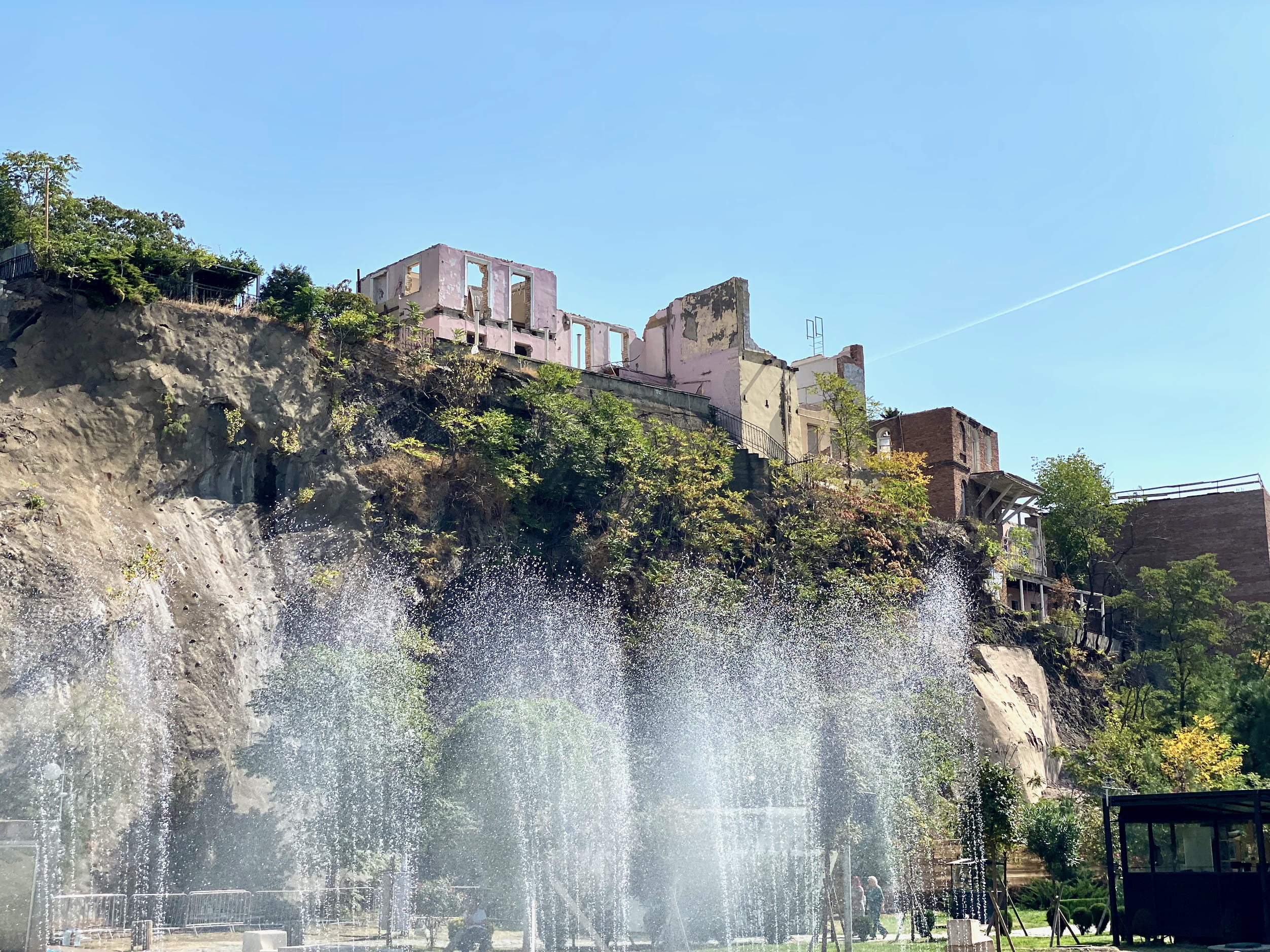
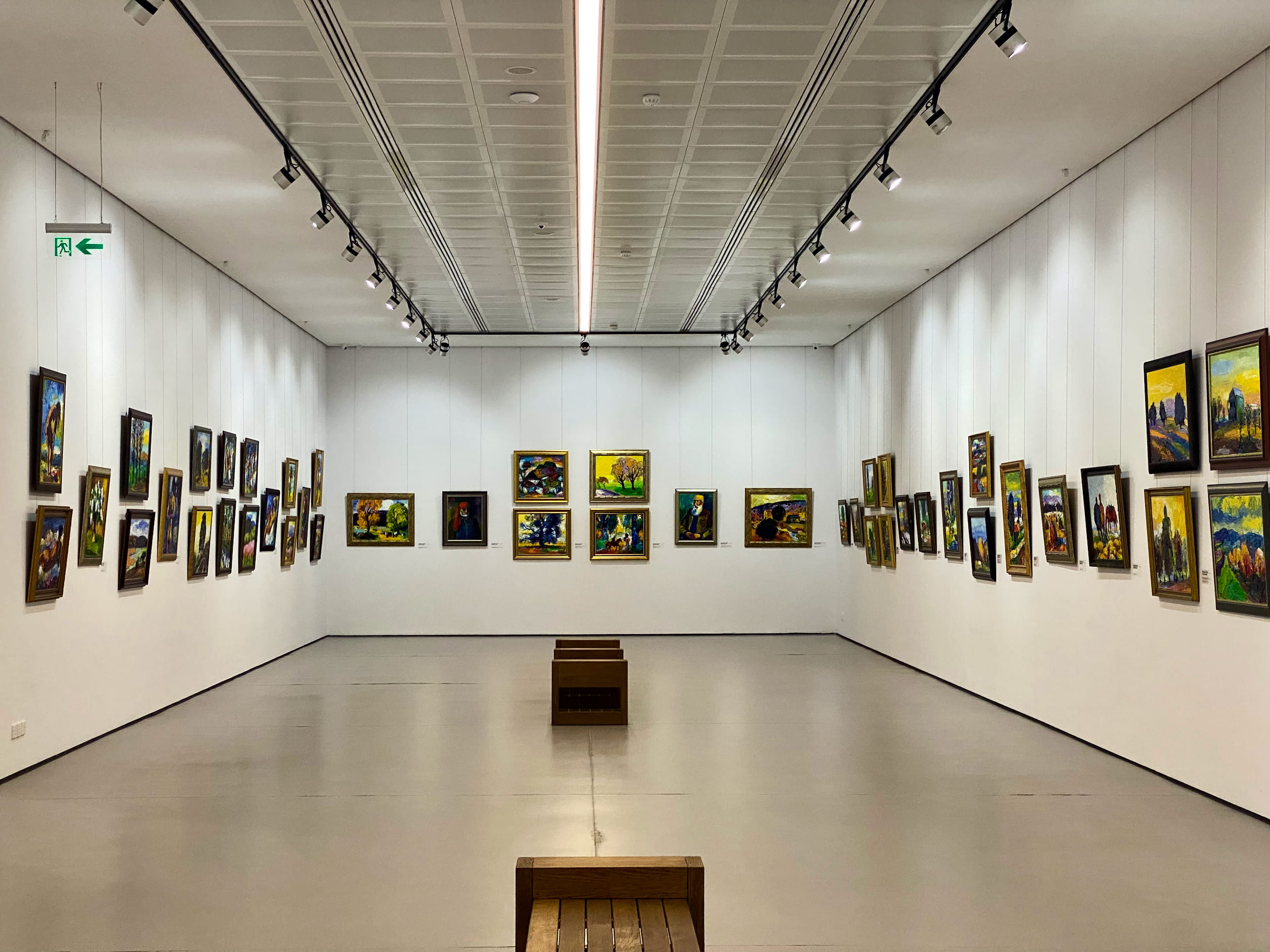
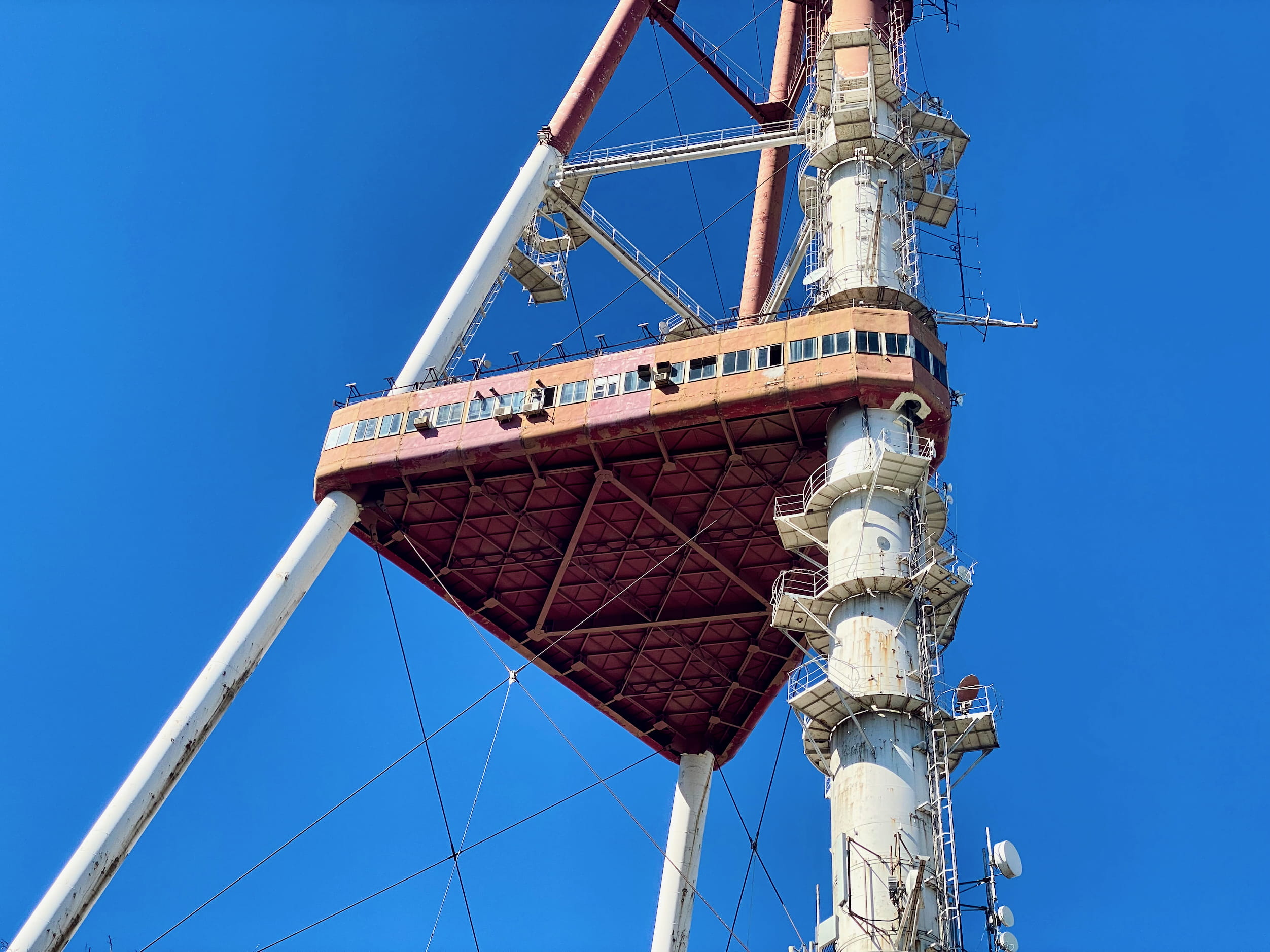
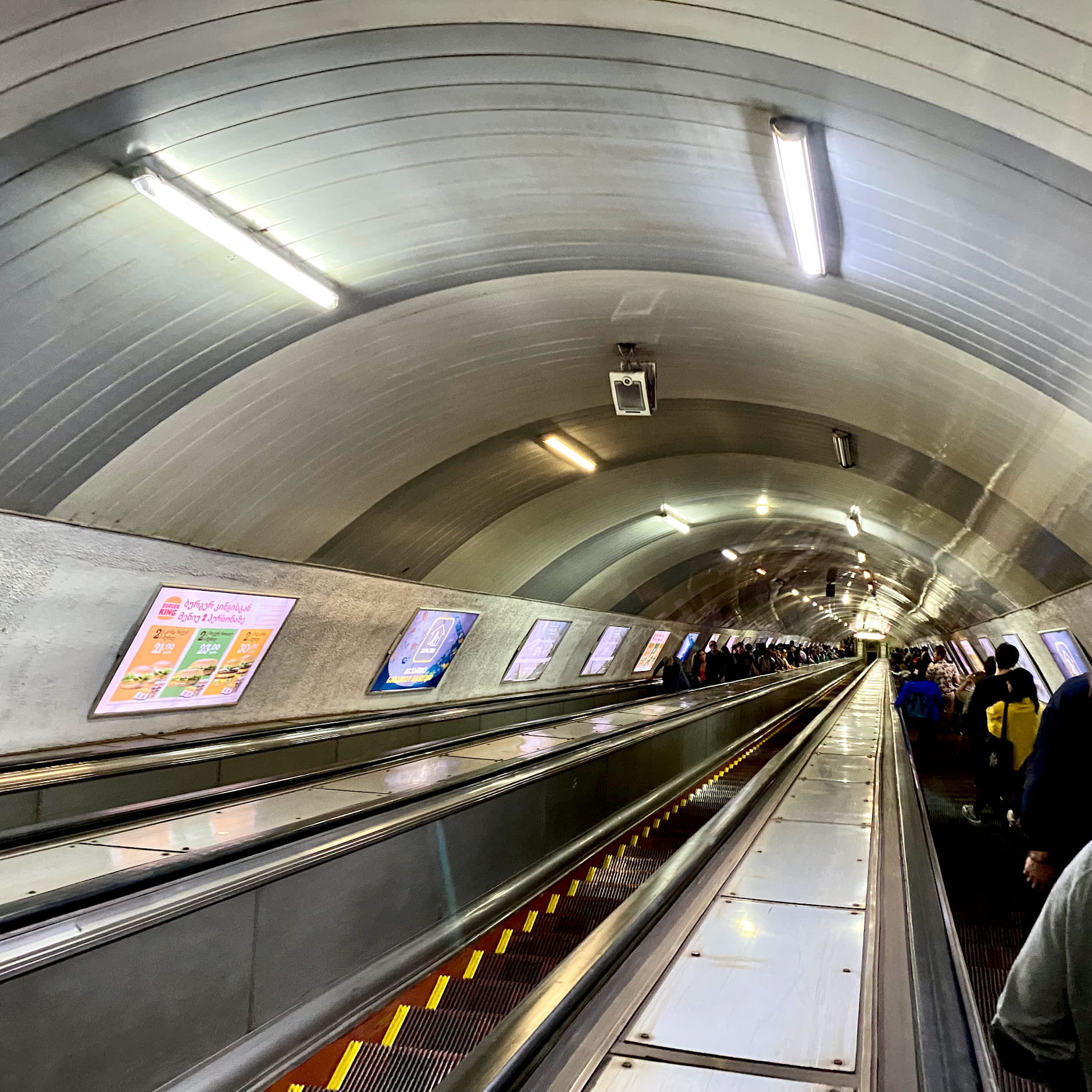
I spent hours making a voxel model of this massive escalator, it enthralled me so. It’s nearly done but still looks crappy. Hopefully I’ll share it anyway.
Seeing this all made me realize that to really understand a city’s infrastructure, one should include the tangent to its improvement curve. In other words, is it repairing and improving, or crumbling and decaying? When you look at a place, you only see its state at a moment in time. But you can’t tell without learning more whether the trajectory is up or down.05
Speaking of post-USSR,06 you might remember that before Russia invaded Ukraine, there was a big hubbub as Russia occupied about 20% of Georgia in '08. They still have it. Given that, it’s not too surprising the kind of public sentiment you see around town.
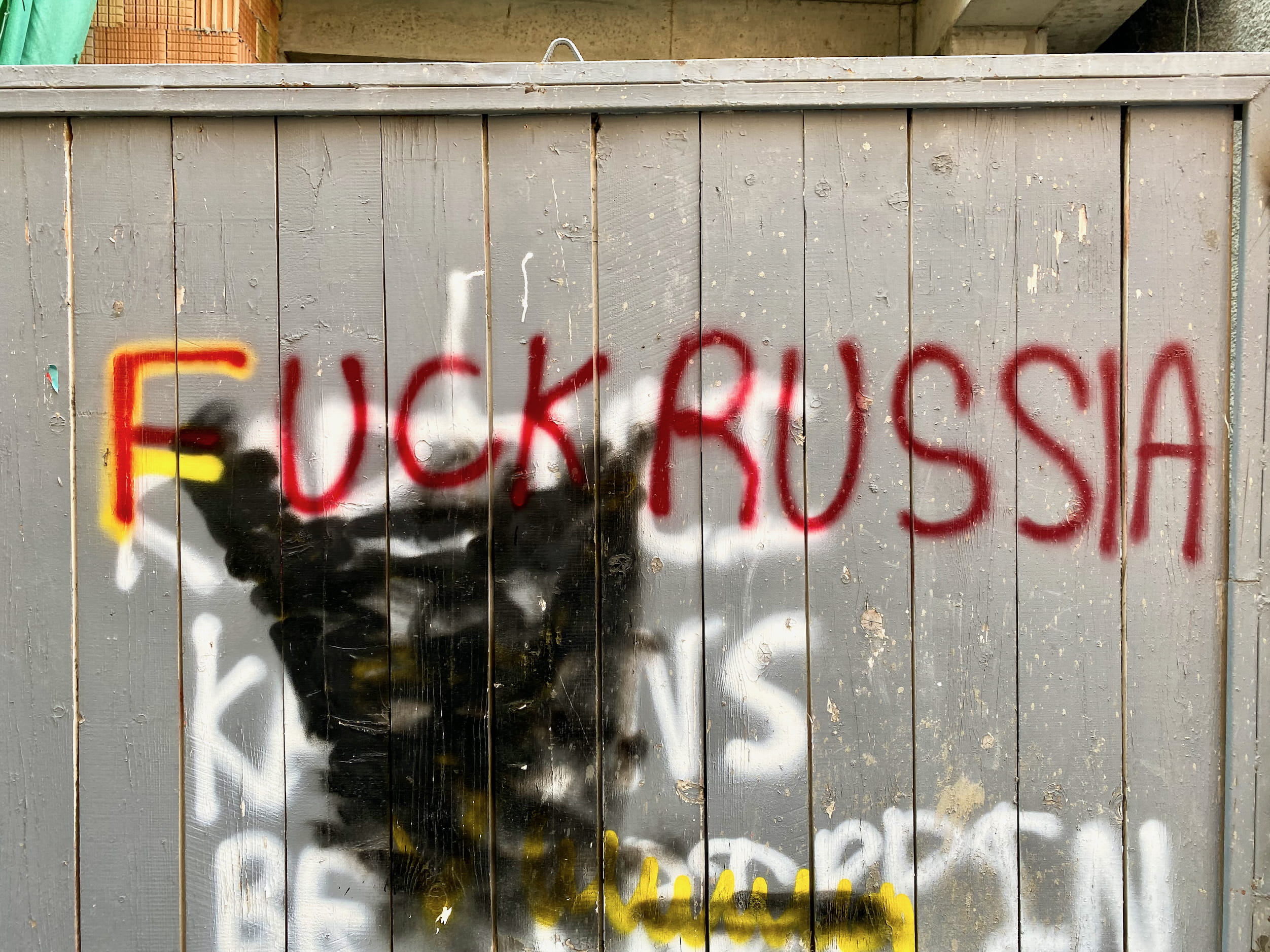
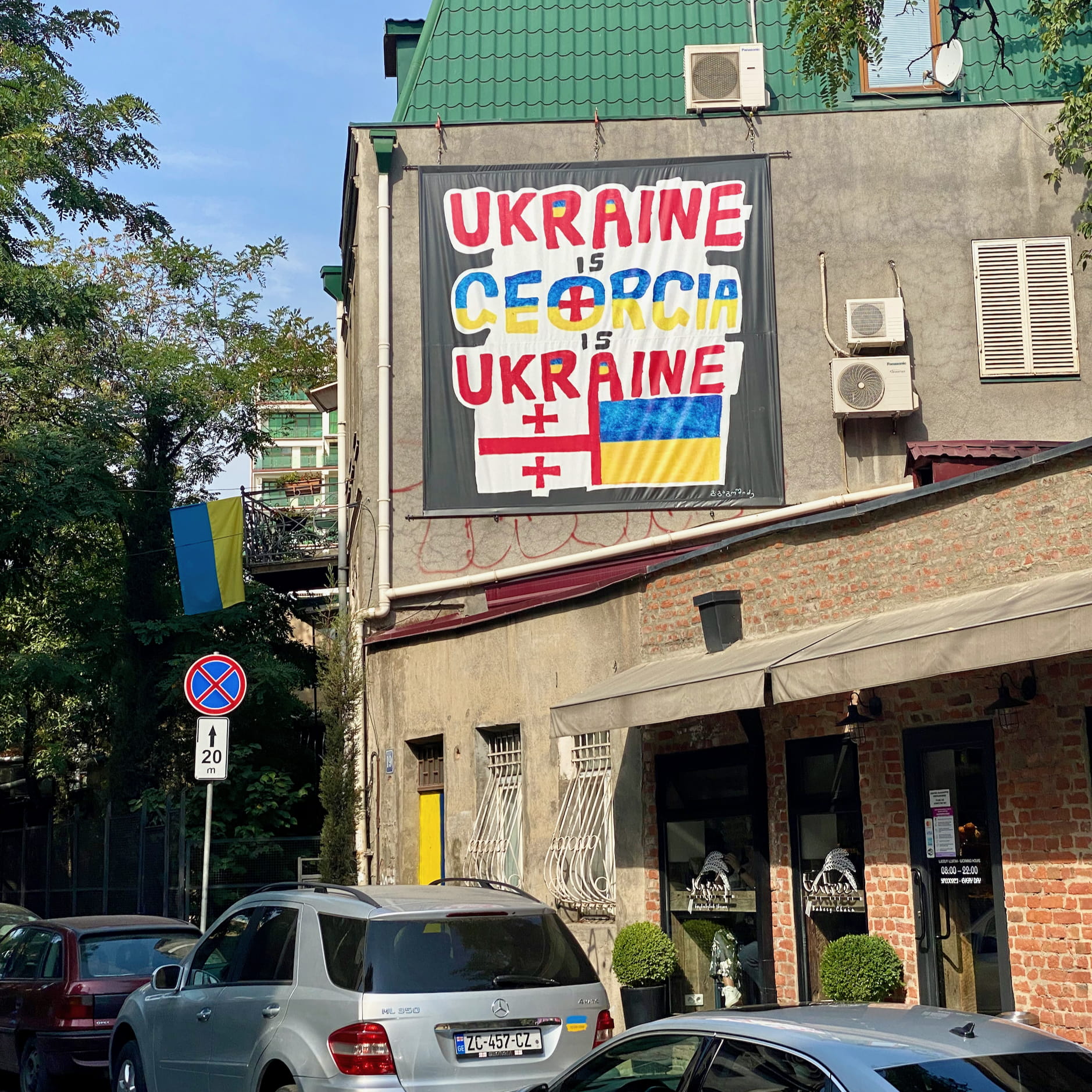
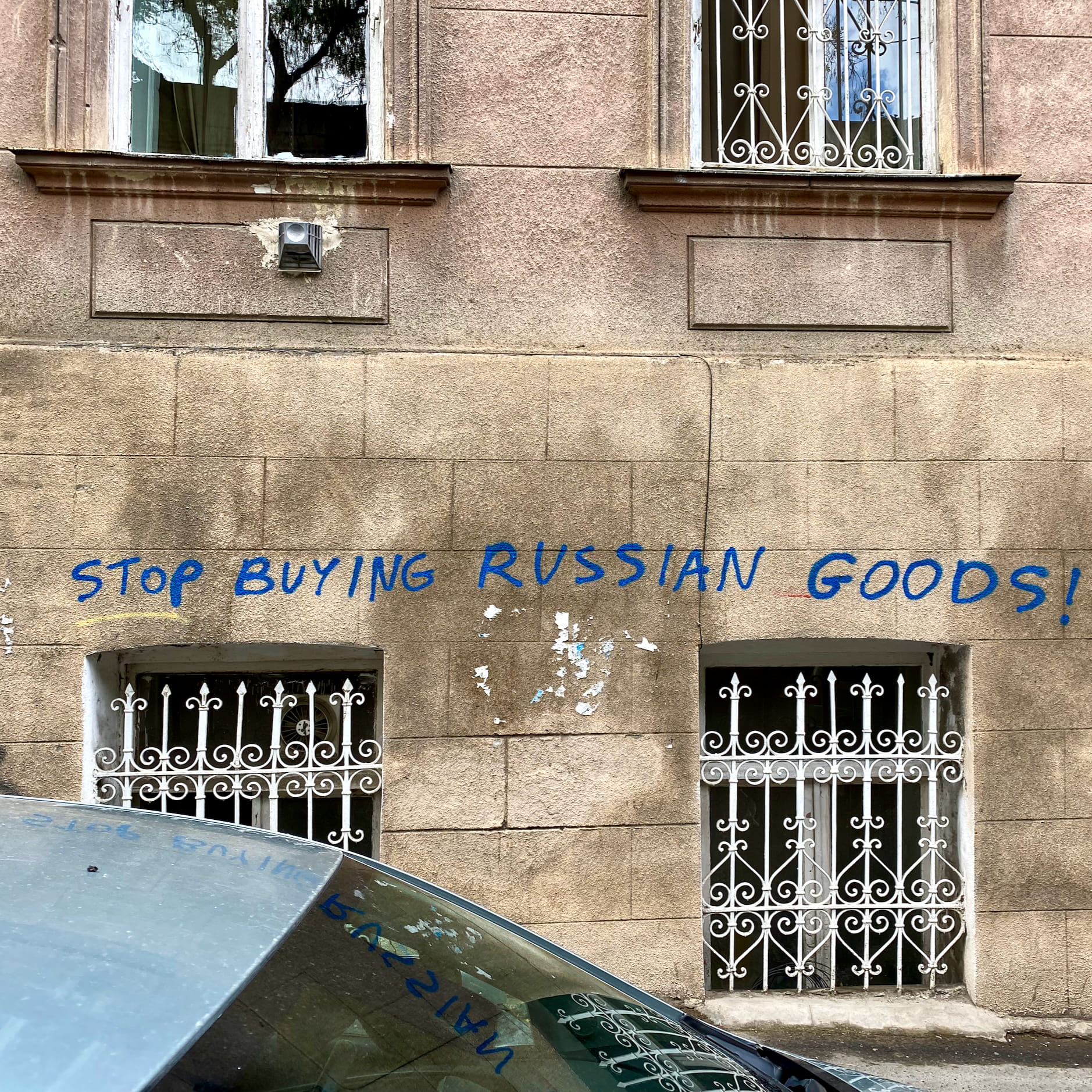
Not huge fans of Putin here.
Given the above, it was surprising to still find a huge Russian presence in town. We crossed path with many Russian tourists, and there was a decent amount of written Russian.
But the most interesting interaction with Russia would happen a few days later, when we were staying in northern Georgia only seven miles from the Russian border, and Putin instituted the draft for the Ukraine war. More on that later.
Here’s some more photos of around Tbilisi.
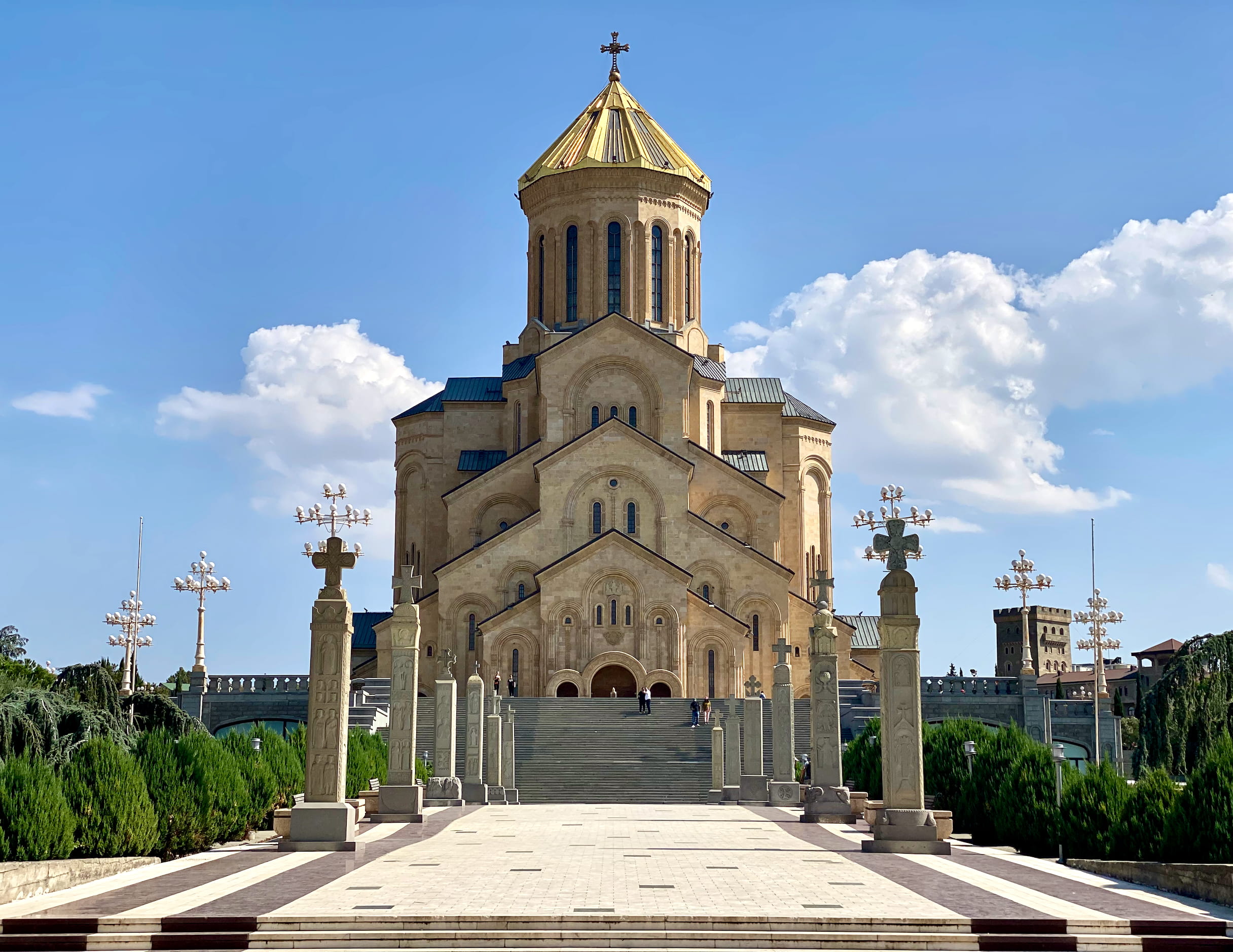
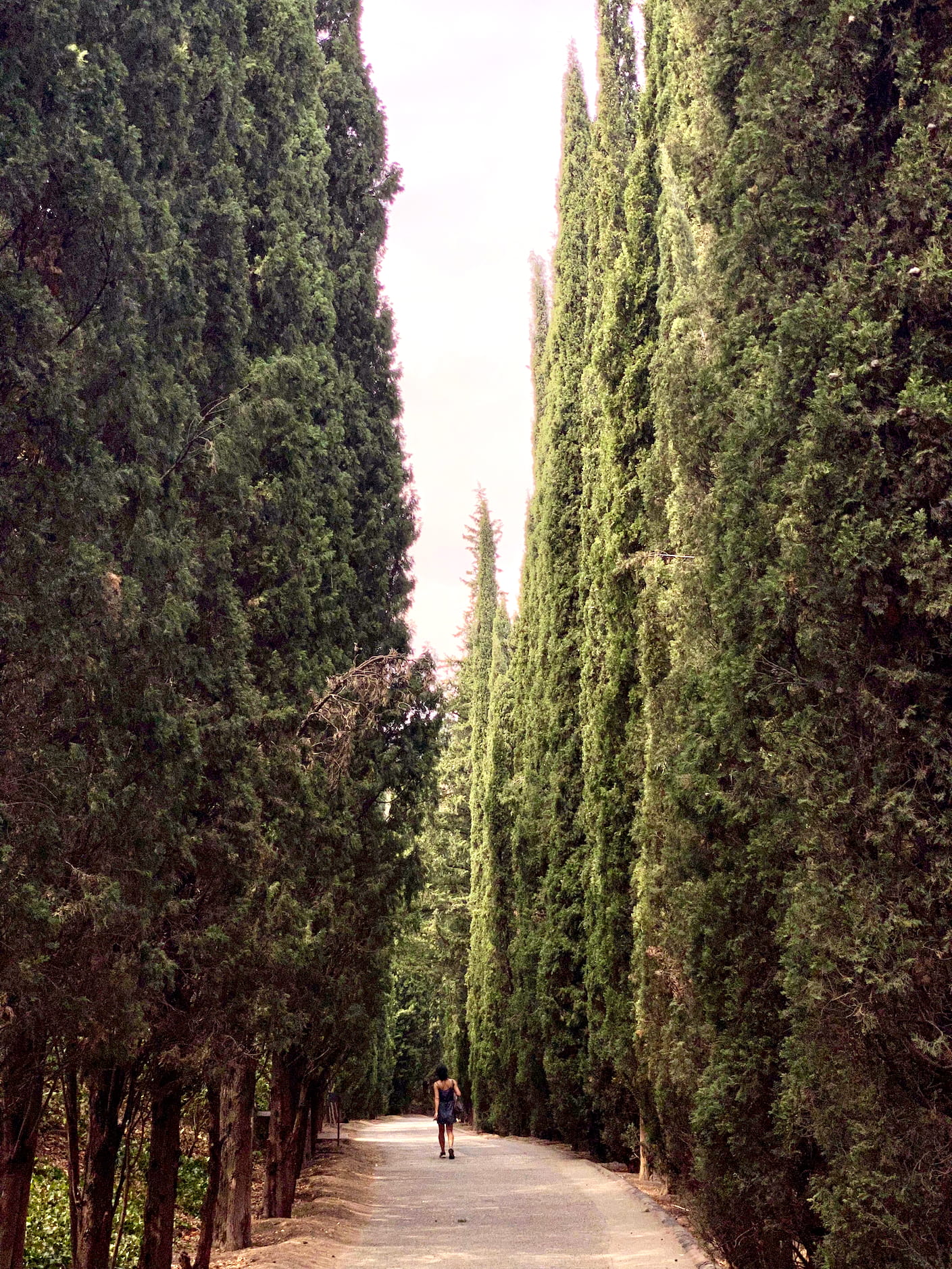
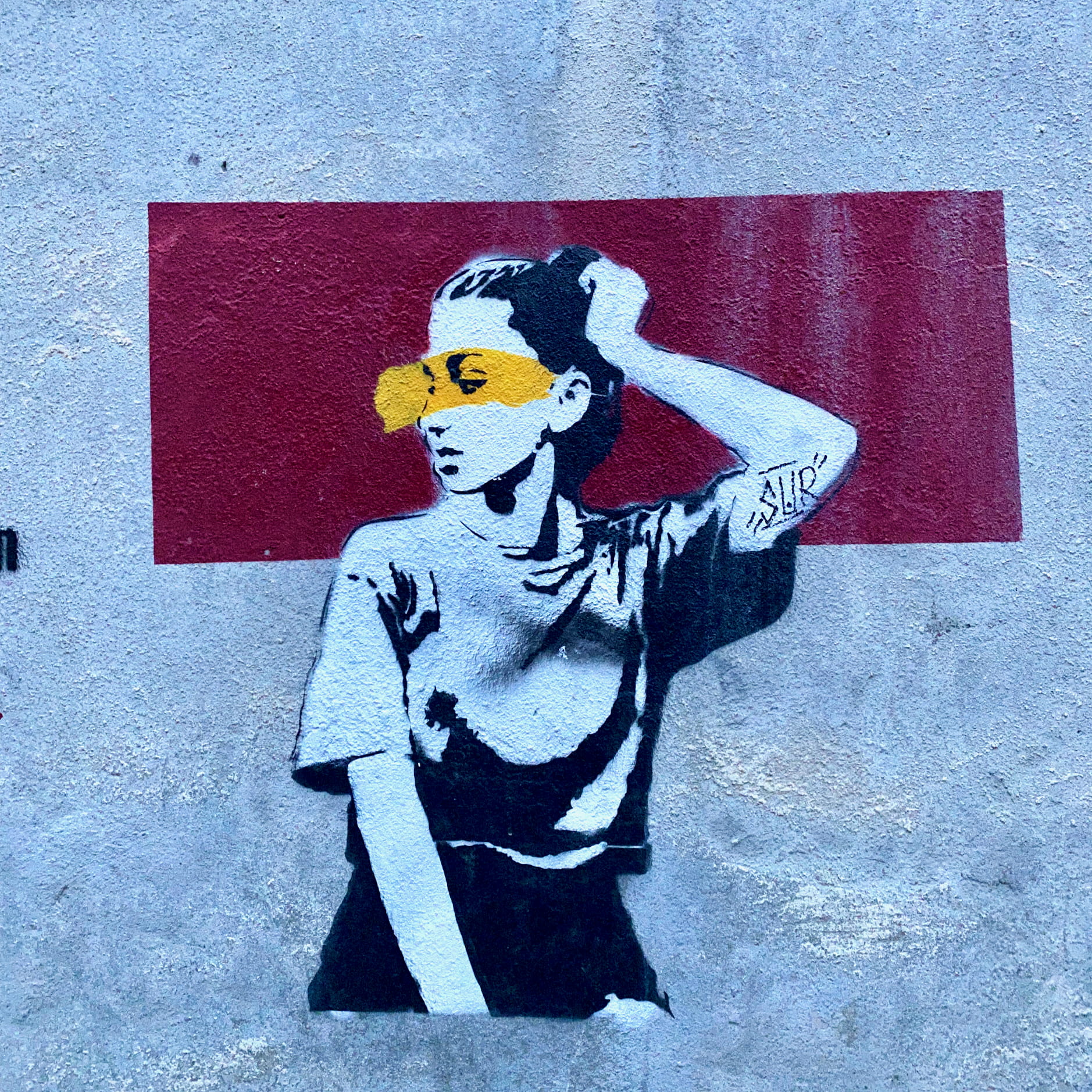
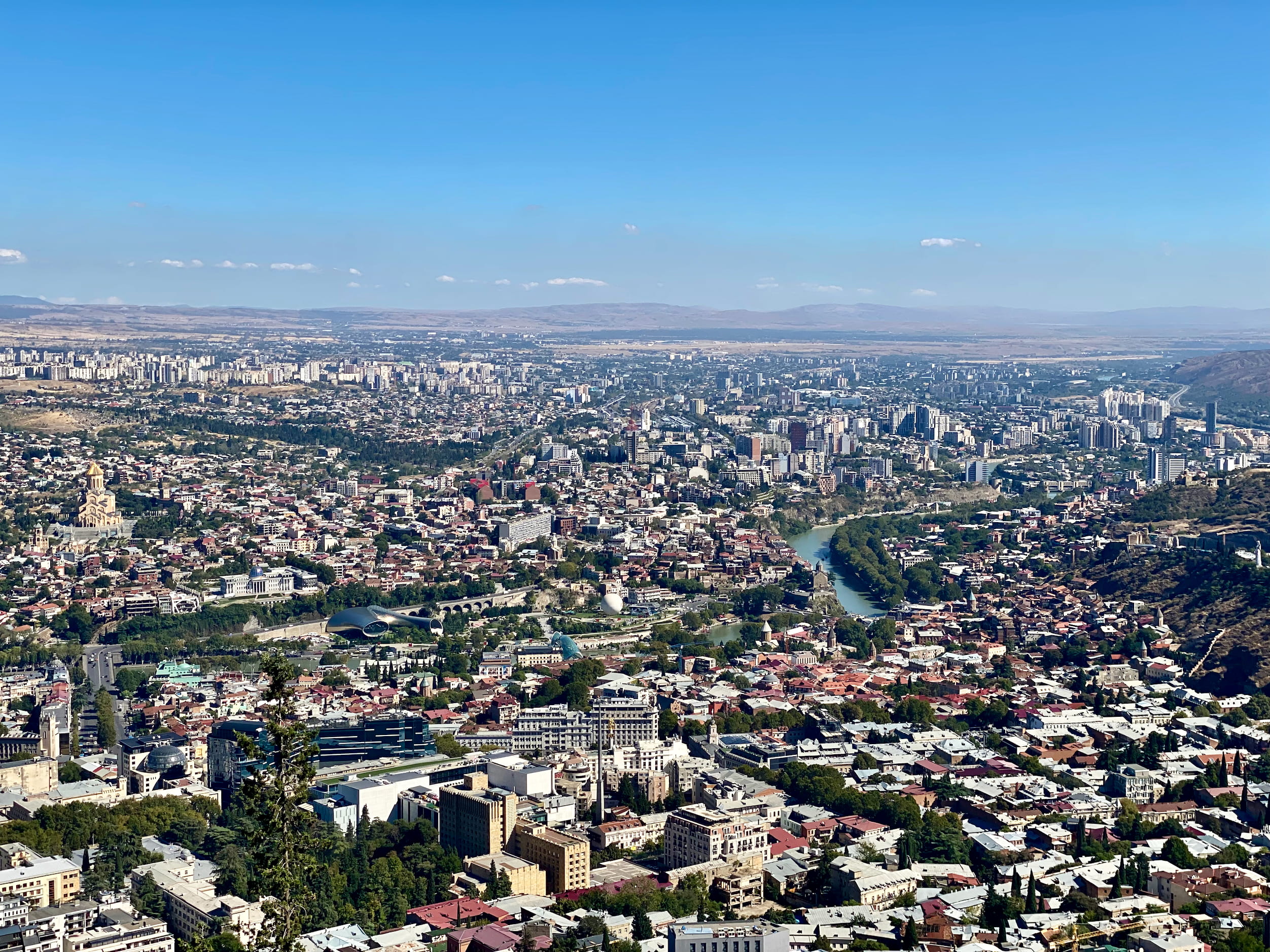
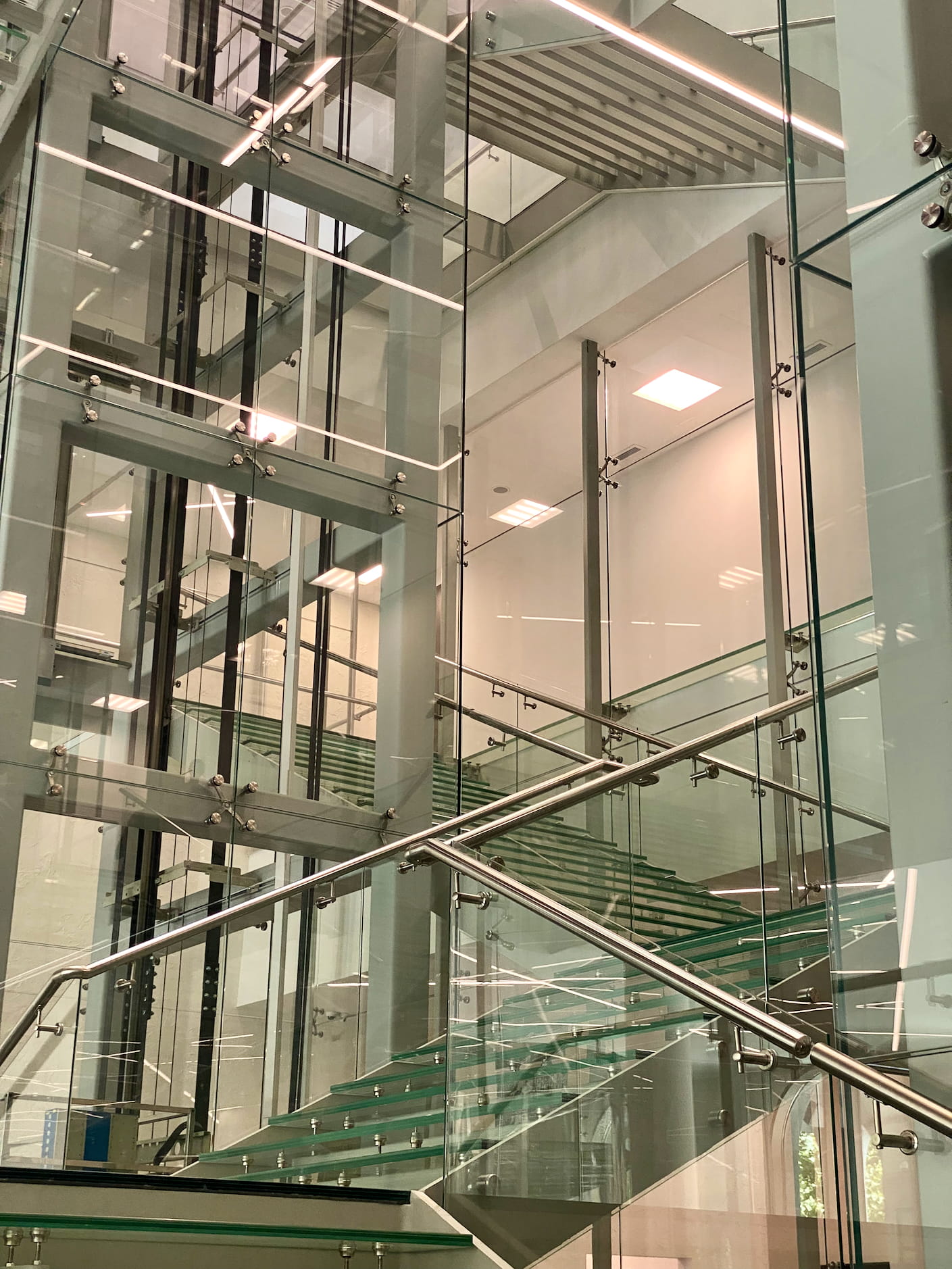
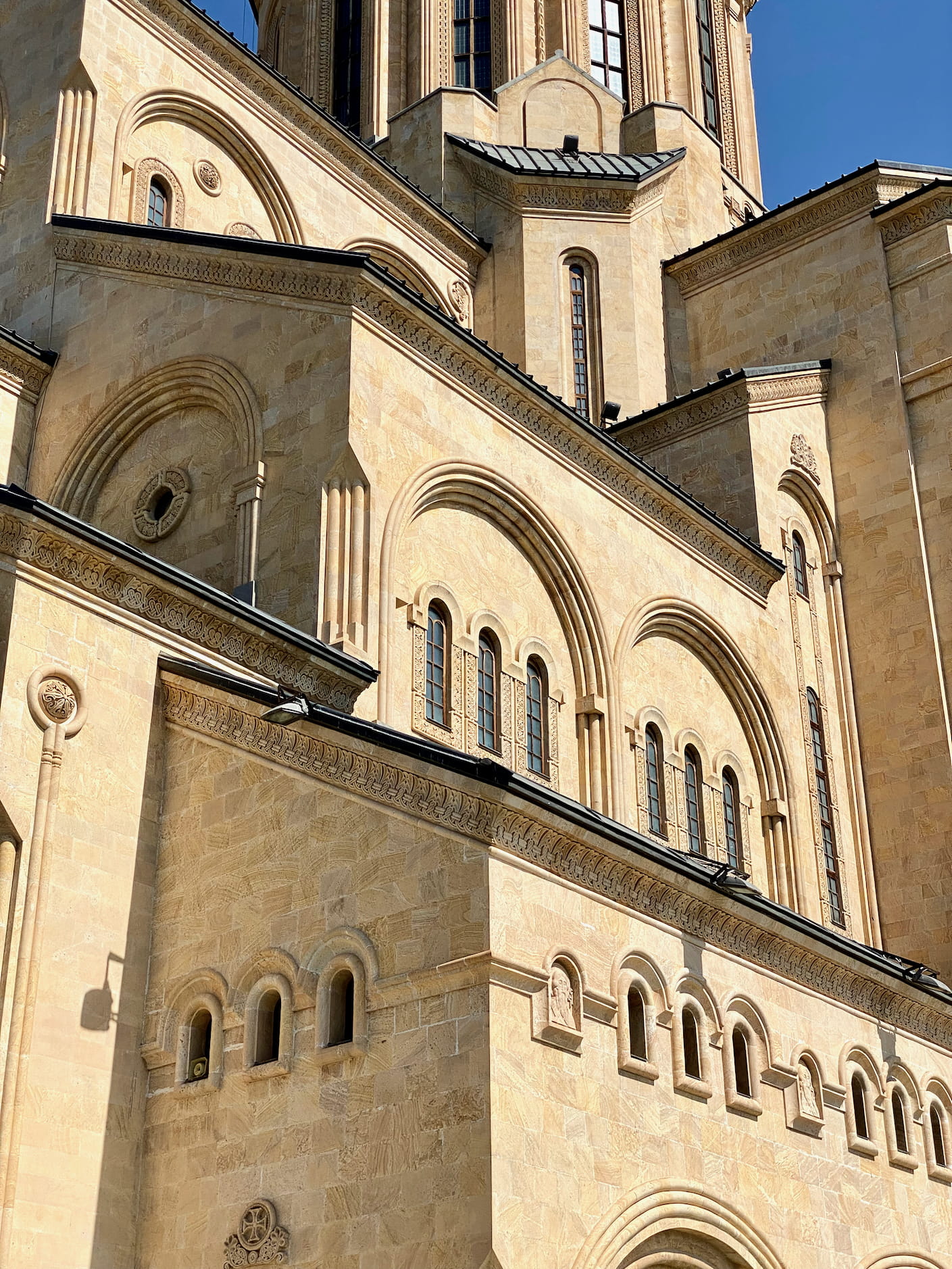
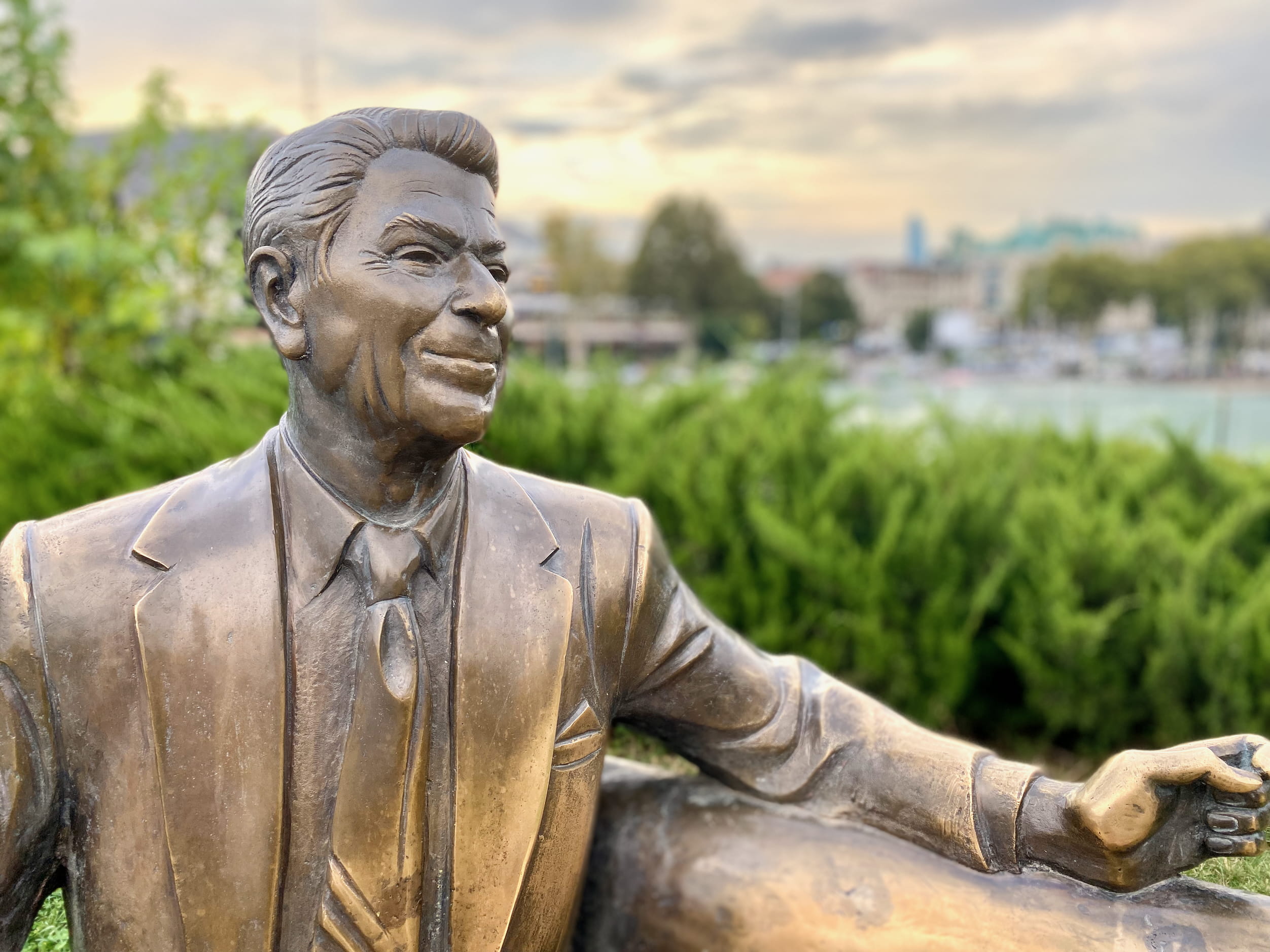
Big double take here. Wait… that can’t be… Ronald Reagan? Yes it is. How bizarre.
We tried out a Georgian bathhouse that uses the natural sulfuric hot springs. The city name Tbilisi actually comes from Old Georgian T’bilisi, “warm location,” referring to them.
The barren worn pipes in the entry rinsing room kind of gave more prison than spa vibes, but the pools in the soaking room had a friendlier ambiance. We paid to have a guy come in and scrub and dump water over me.
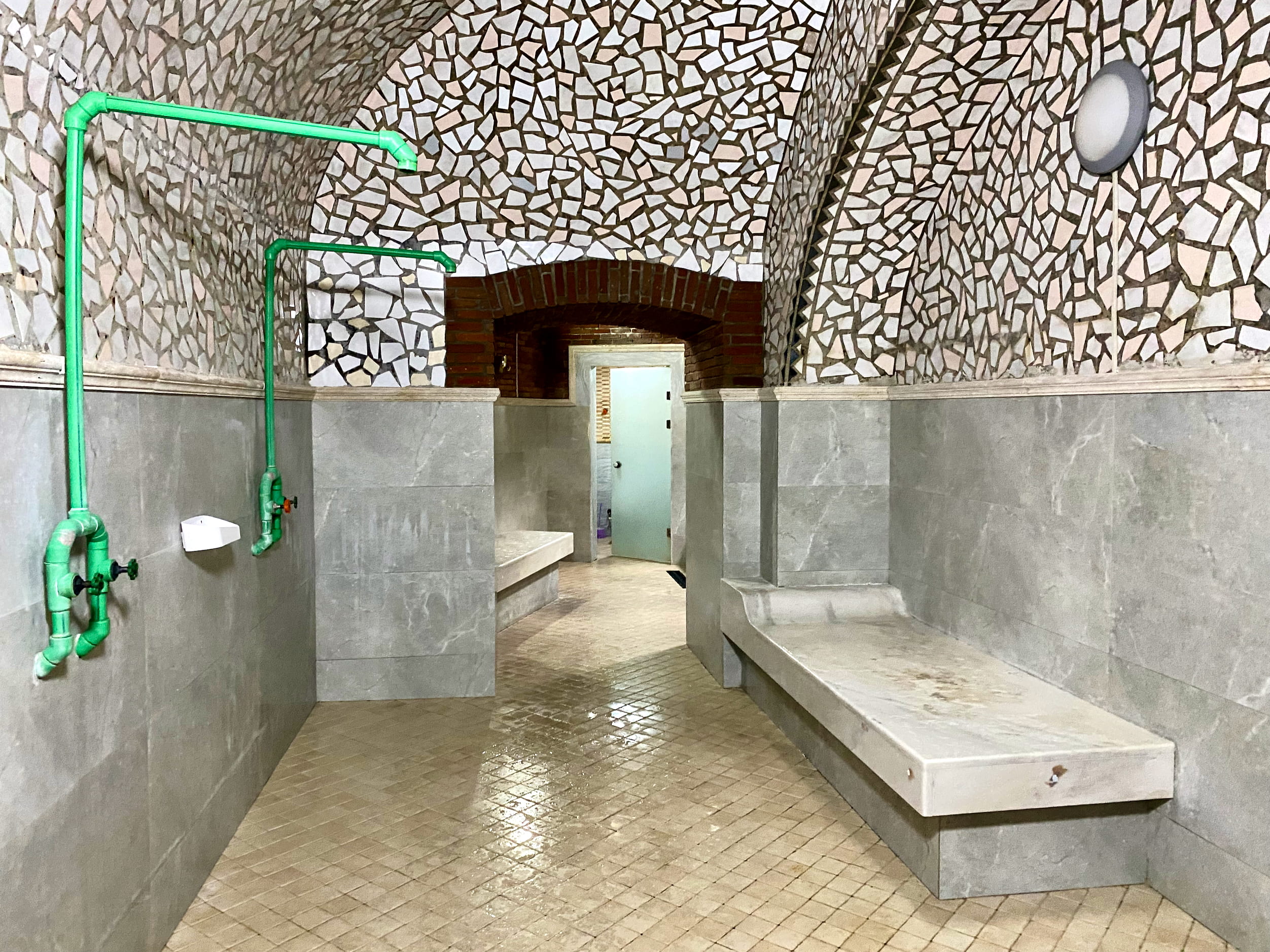
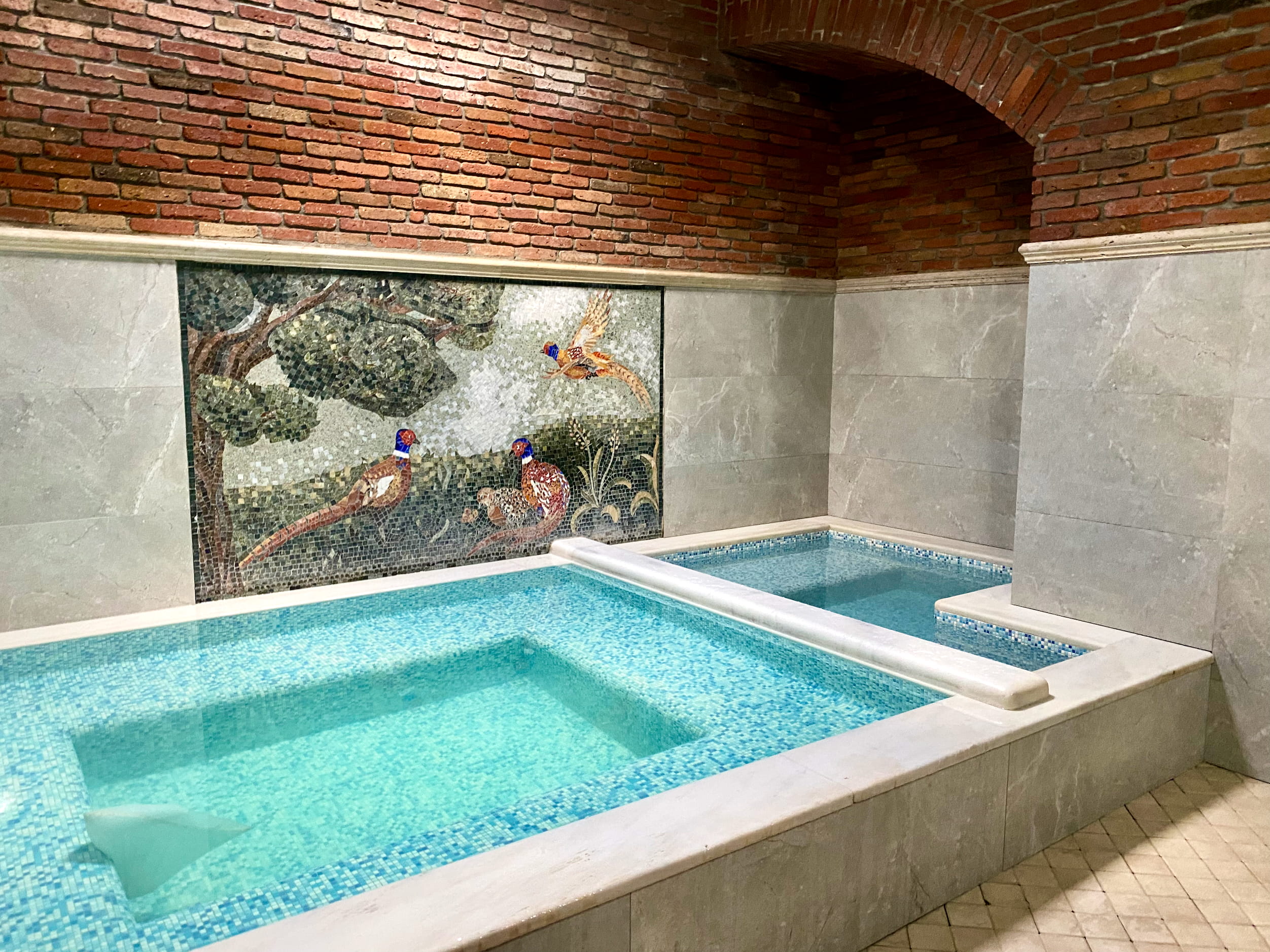
In a room by us was a whole gang of Indians (one or two dozen people), which is such a great idea for a group activity.
My favorite visual motif all over Georgia is the tall extended arch. I first started seeing it in architecture, but it makes its way into art as well.
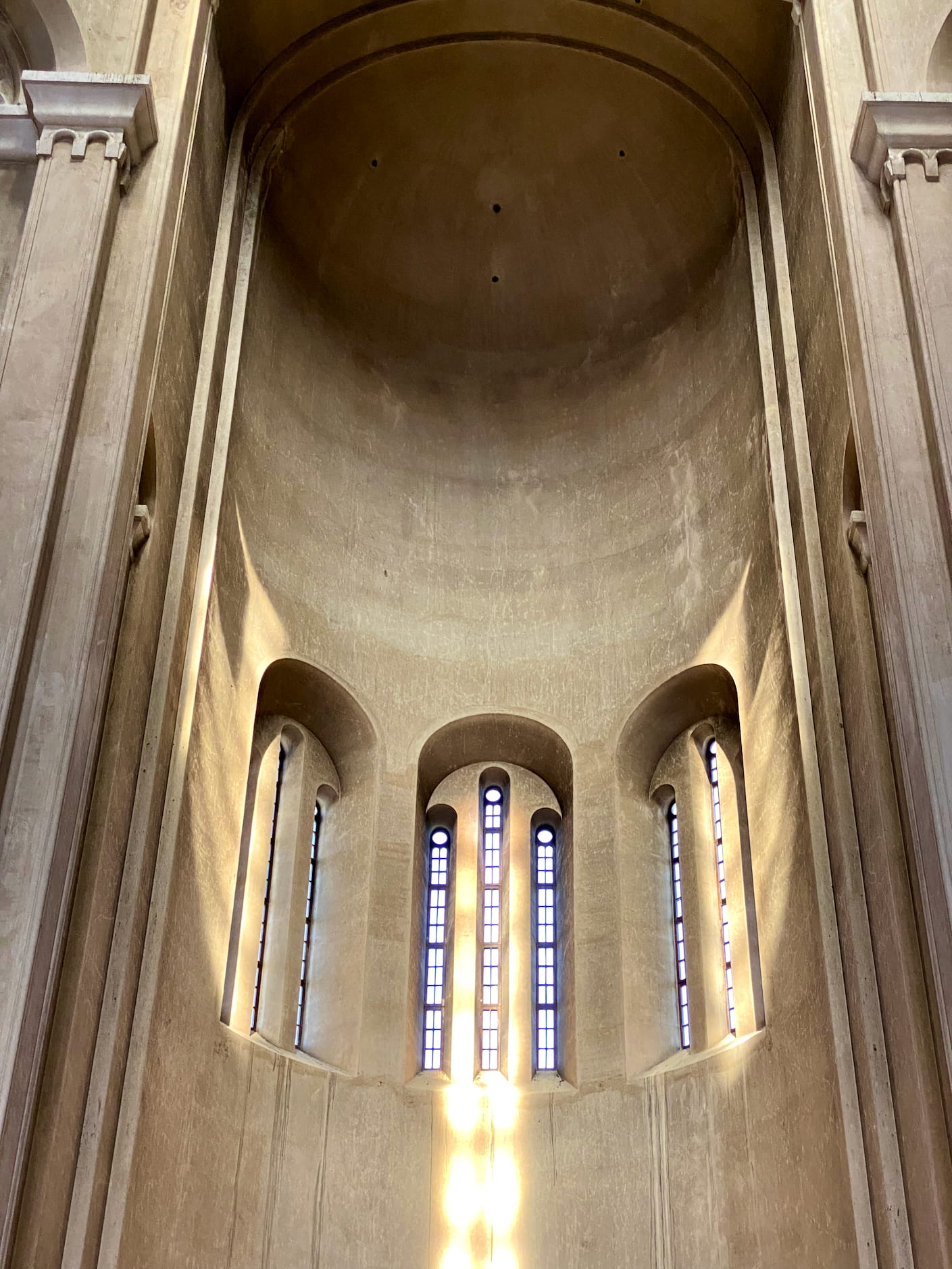
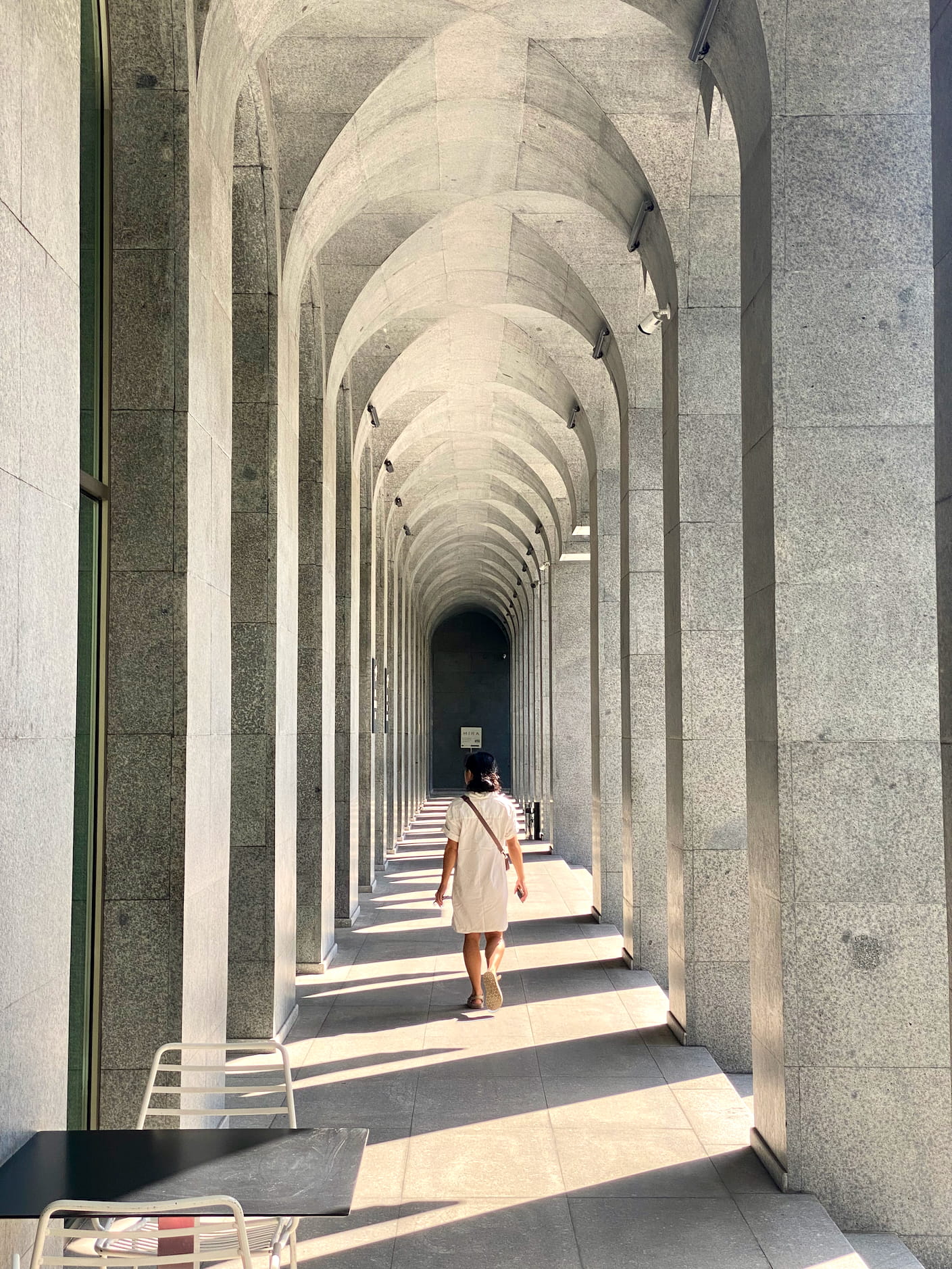
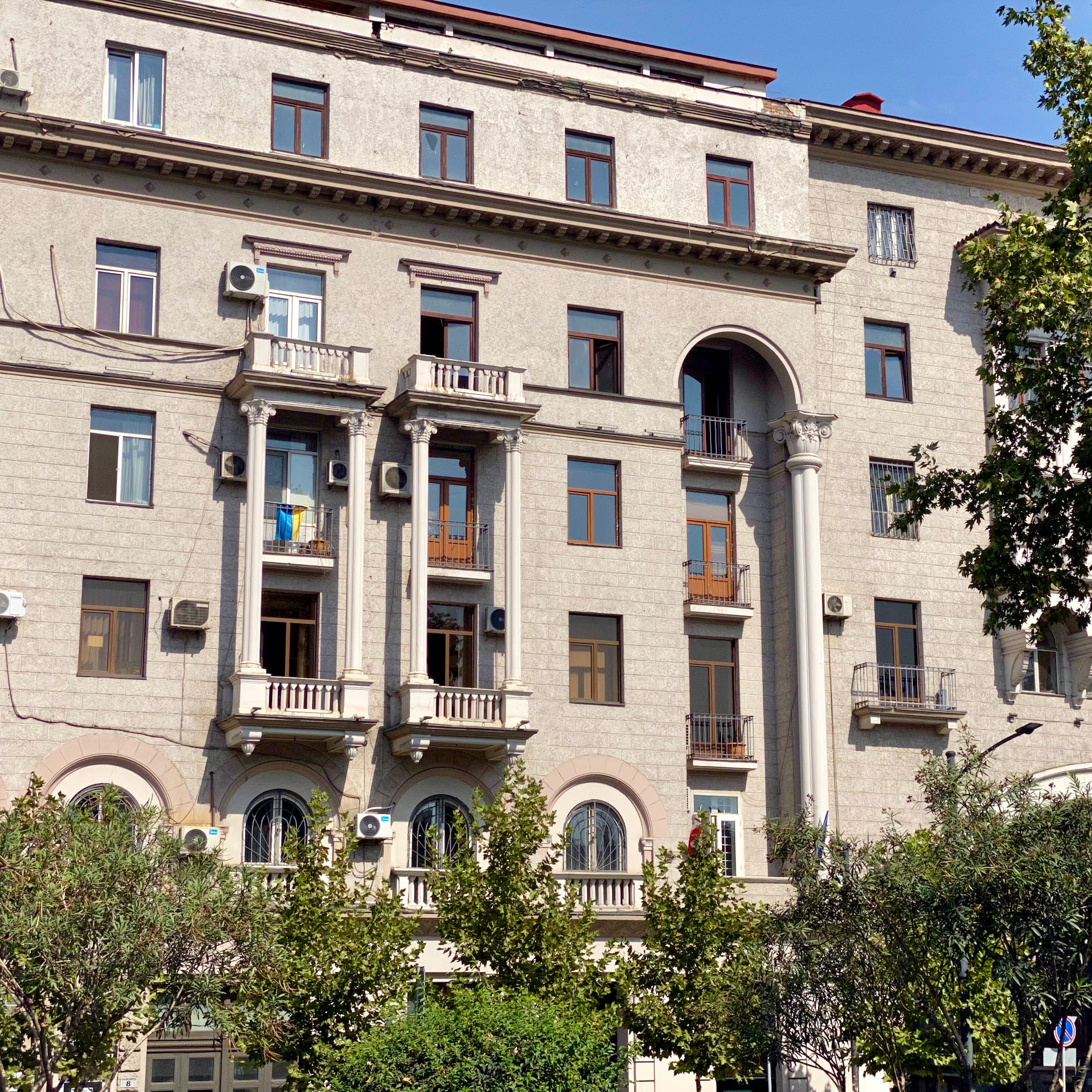
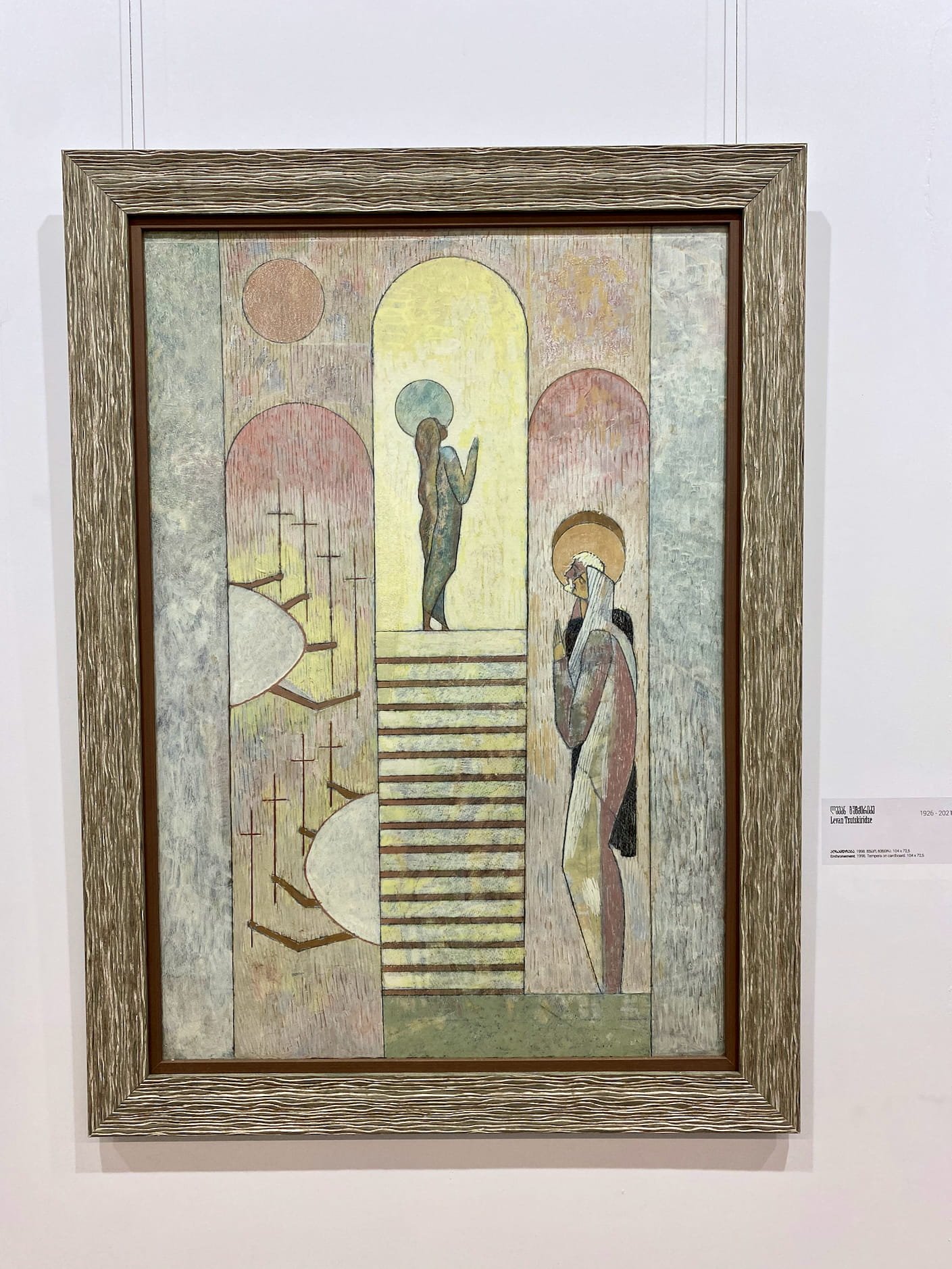
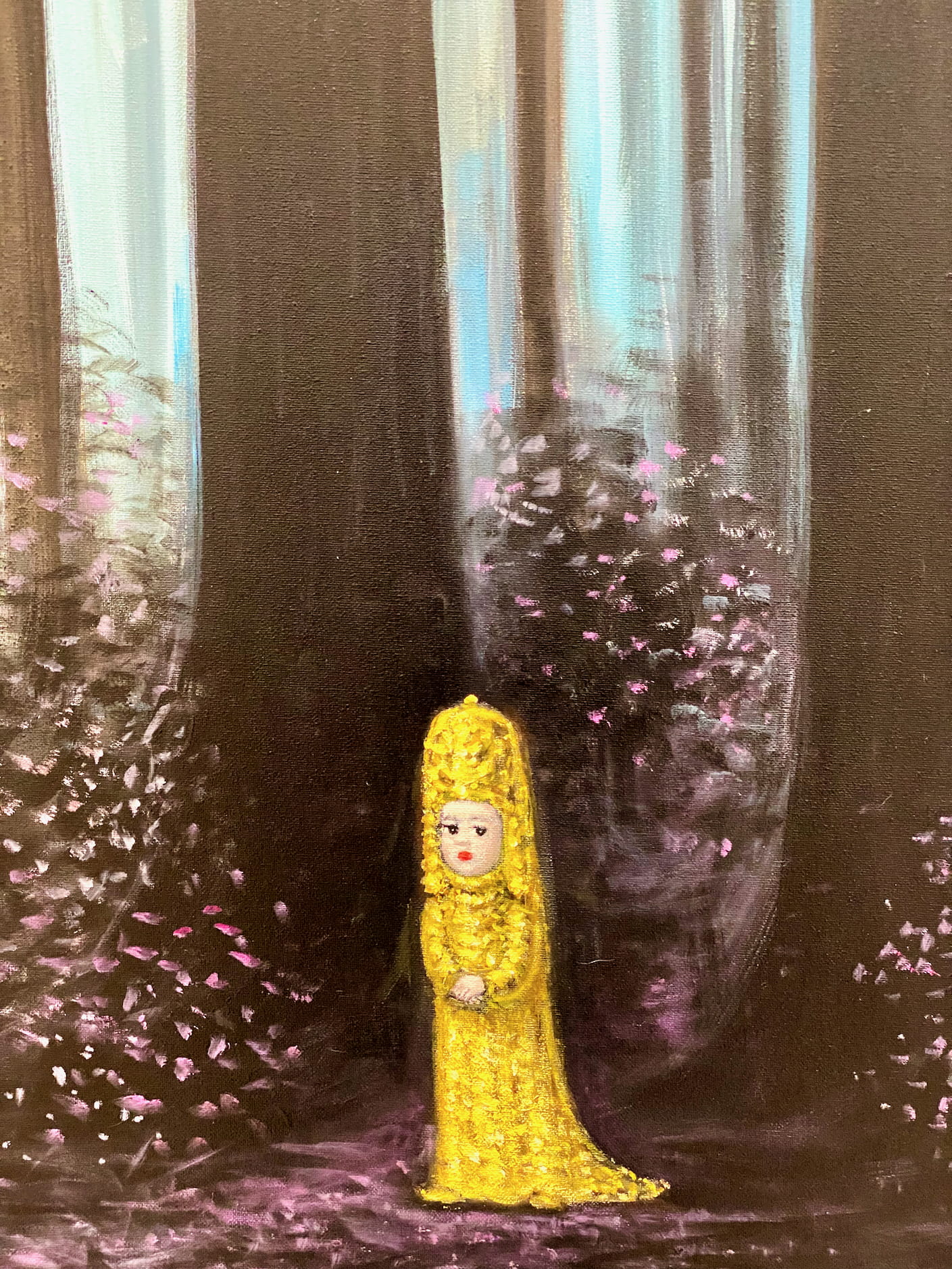
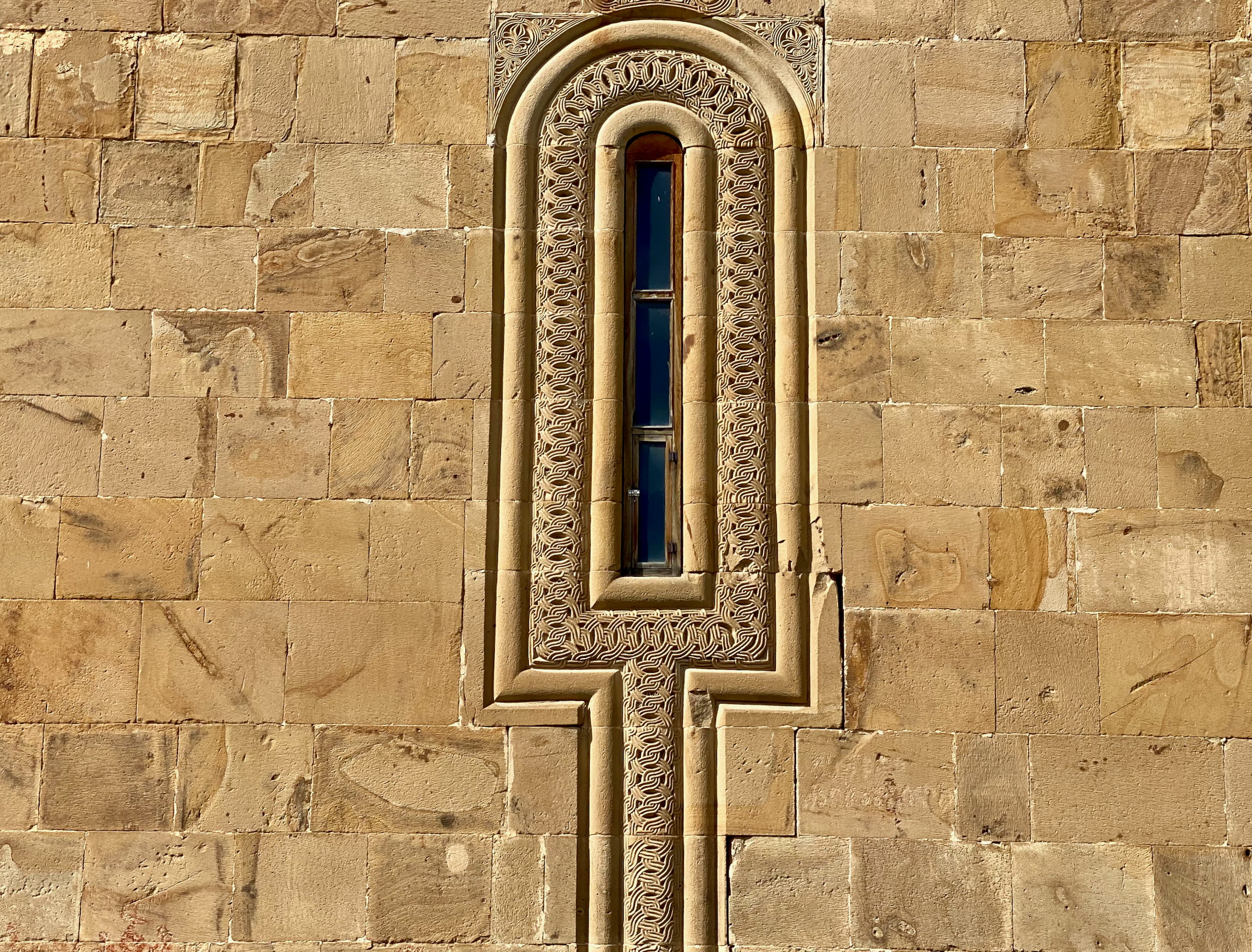
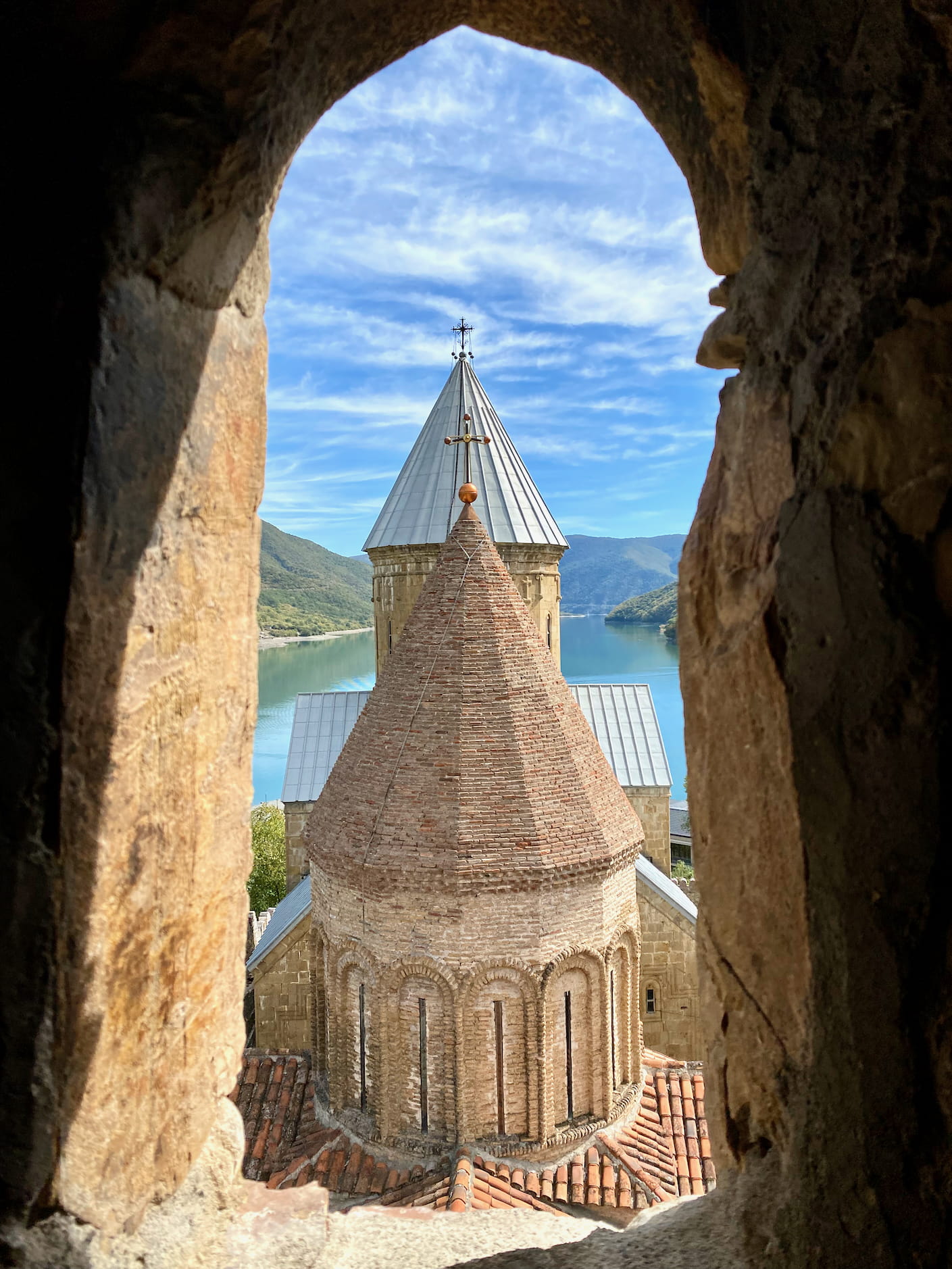
Seeing that girl in gold clothes made me wonder which came first, the outfit or the long arch? And was one inspired by the other, or is it a coincidence?
The whole reason we came to Georgia was because of what we affectionately call cheese boats. The dish’s real name is khachapuri. It is a mouth-shaped hunk of dough with a shallow opening in the middle, filled with cheese and eggs and butter, and maybe the closest thing to heaven on earth.
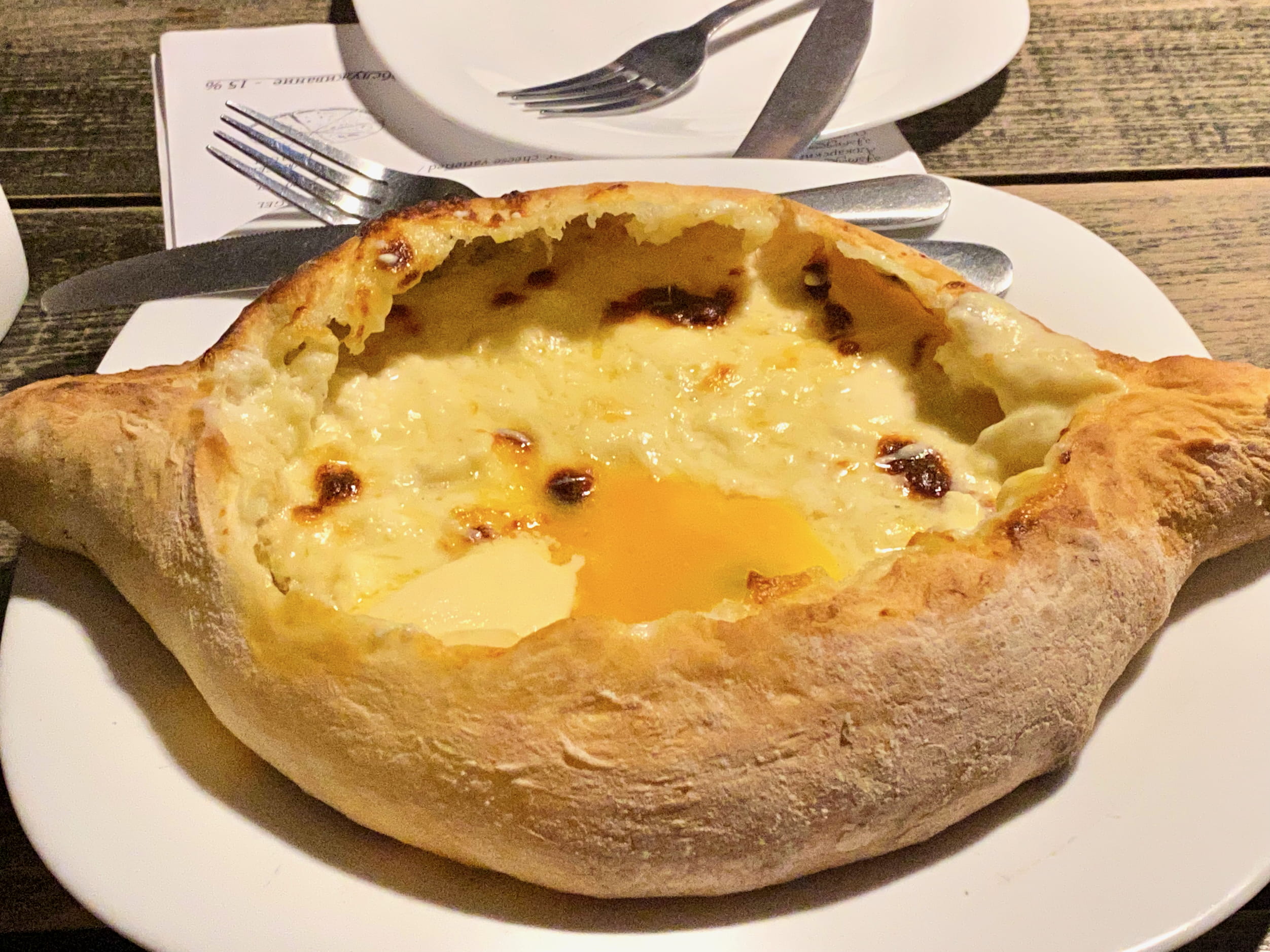
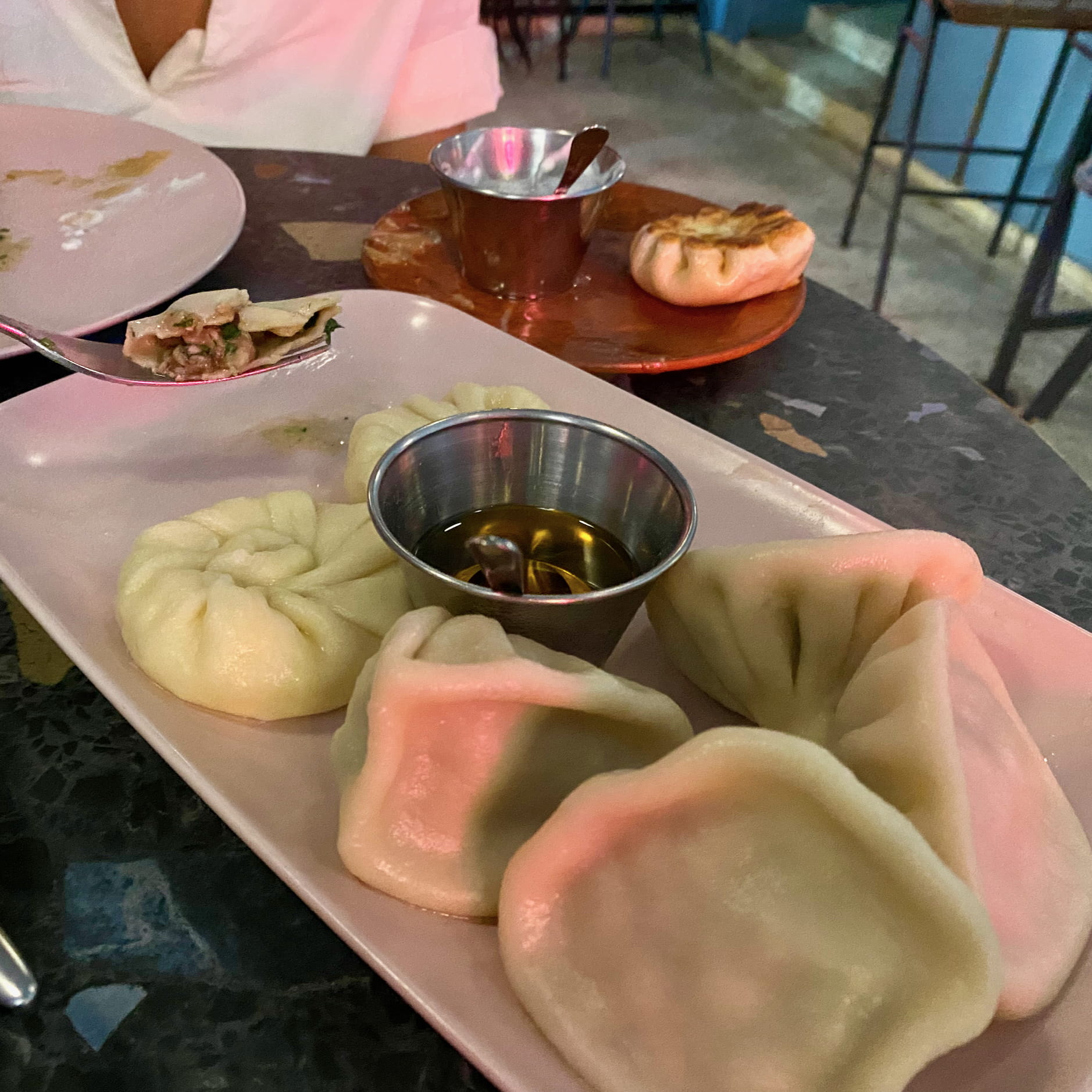
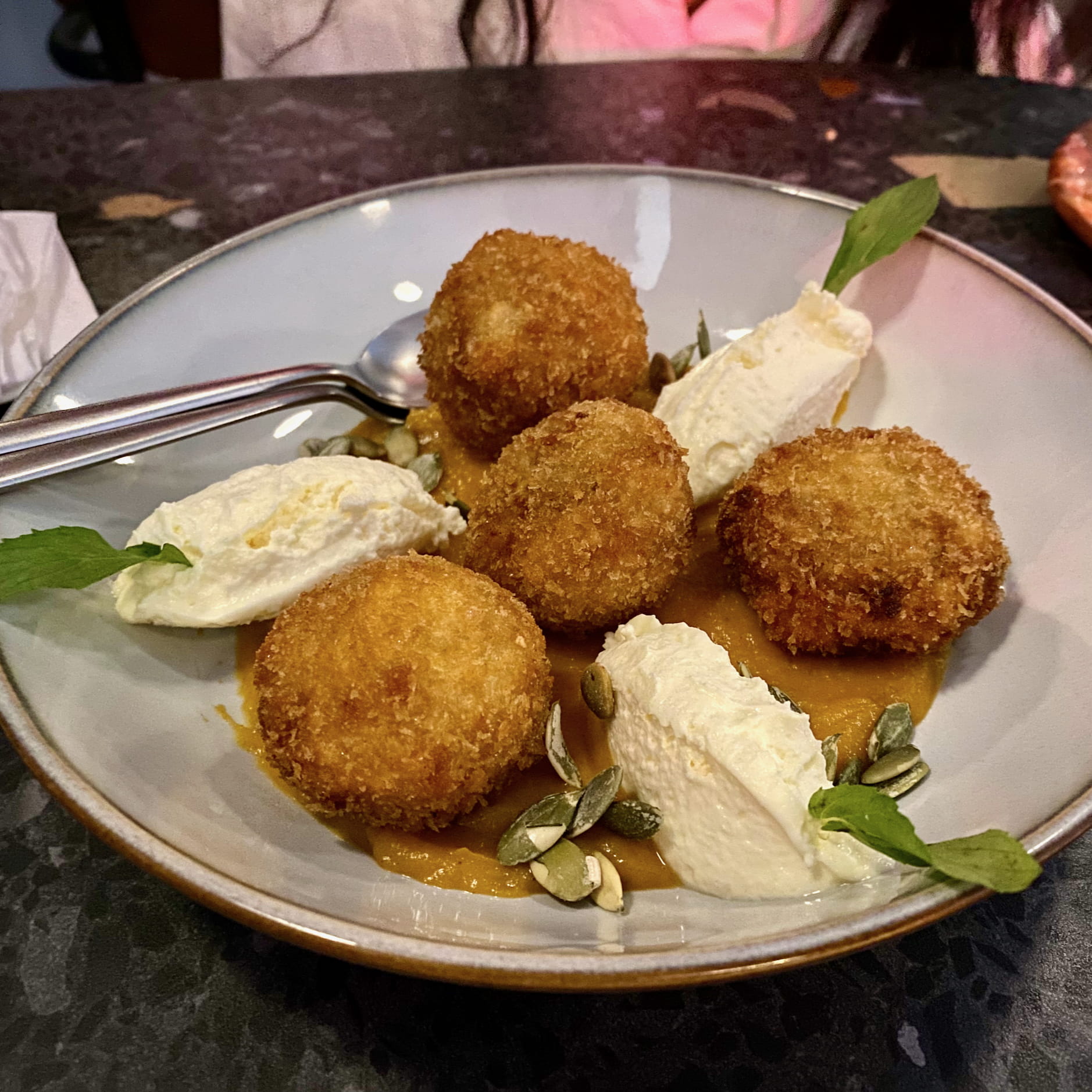

Last photo: tasting both Georgian and western wines. The darker yellow one is a Georgian style white wine. Sorry, I haven’t introduced Georgian wines in the body text yet, but the photo went better in that arrangement so I put it there. I’ll do it in the next paragraph.
But Georgia is also known for wine. They have their own process, which involves huge clay vats underground, and leaving everything in—stems, seeds, and skins. This turns the white wines amber, and the red wines dark. They call these Georgian wines, and distinguish them from Western wines, which are basically all the wines I’ve ever drunk. This complication makes being a sommelier in Georgia especially challenging, as you have twice07 the stuff to memorize.
The sommelier guiding our wine tasting told us that wine making is so common in Georgia that you’re almost made fun of if you don’t make your own wine. This explained what happened when we first arrived at the apartment we were staying at. After airing out the gas leak,08 the host’s brother excitedly gestured us into his wine zone beneath the apartment, and had us taste the wines in progress he was brewing from grapes on the property’s hill.
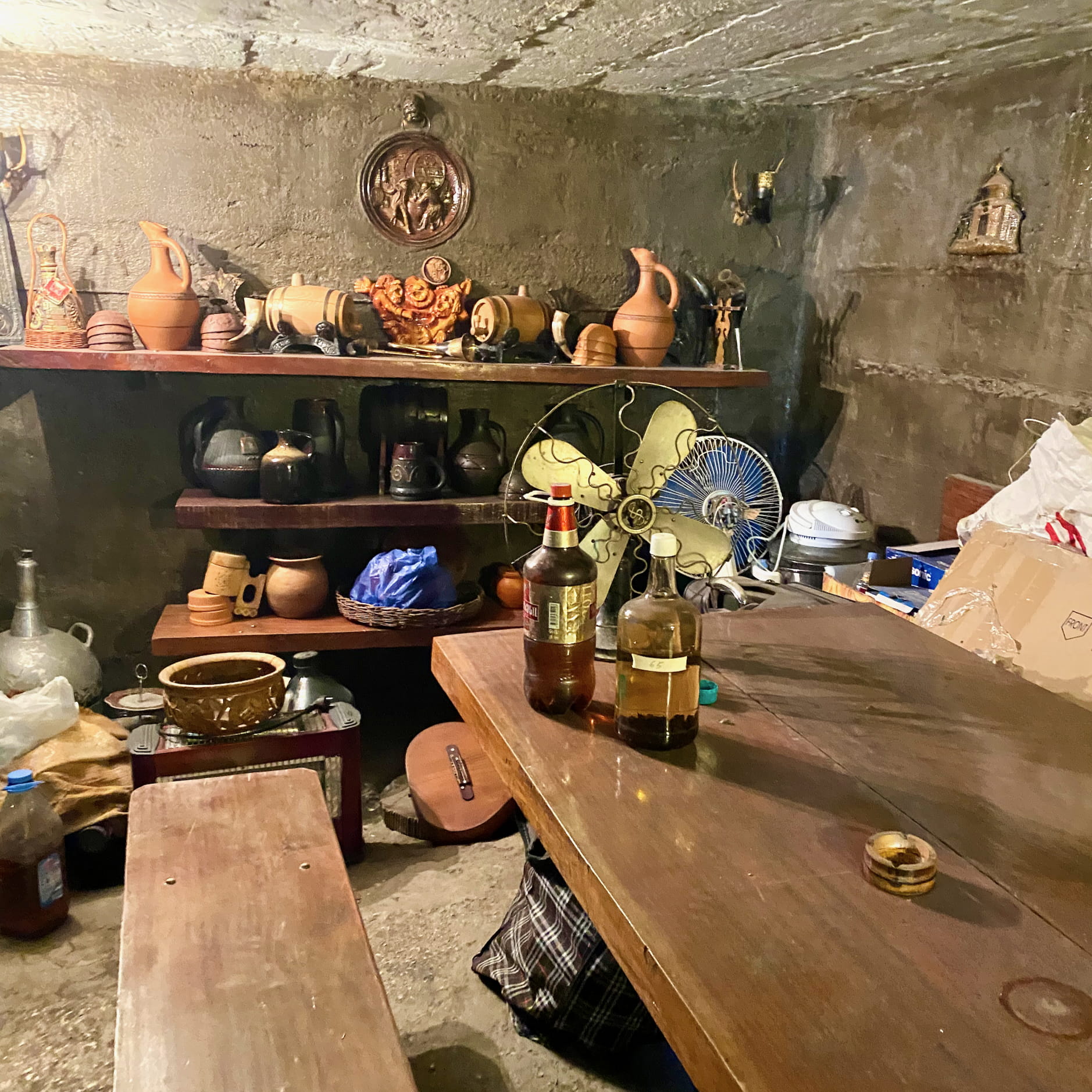
Here’s the back of his wine cave. He was a delightful guy. Old enough his second language was Russian and not English (schools now teach English), but he made up for the language gap with bold and elaborate gestures.
Tbilisi only had a few downsides, and they were all related to cars. For one, the traffic was absolutely madness, and in places you wouldn’t expect. To walk from our apartment to the nearest place for groceries (a measly micro Spar), we had to walk up a long, single lane, winding side street that was absolutely jammed with cars at every hour of the day and night.
Second—and I guess this is more broadly motorized transport than just cars—is we had a hell of a time trying to catch busses around. Sometimes it would work fine, and other times busses simply would never arrive. There were reroutes and cancellations we couldn’t understand. And judging by the hoards of other confused-looking people waiting at the supposed bus stop with us, we were not alone. One time we were an hour late for a reservation because a 20-minute bus ride took two hours when the bus never came, and we instead sat in an Uber09 in traffic for an hour.
Third—and I guess this is more broadly pedestrian infrastructure than just cars—we got completely stuck walking along side a freeway for forty minutes.
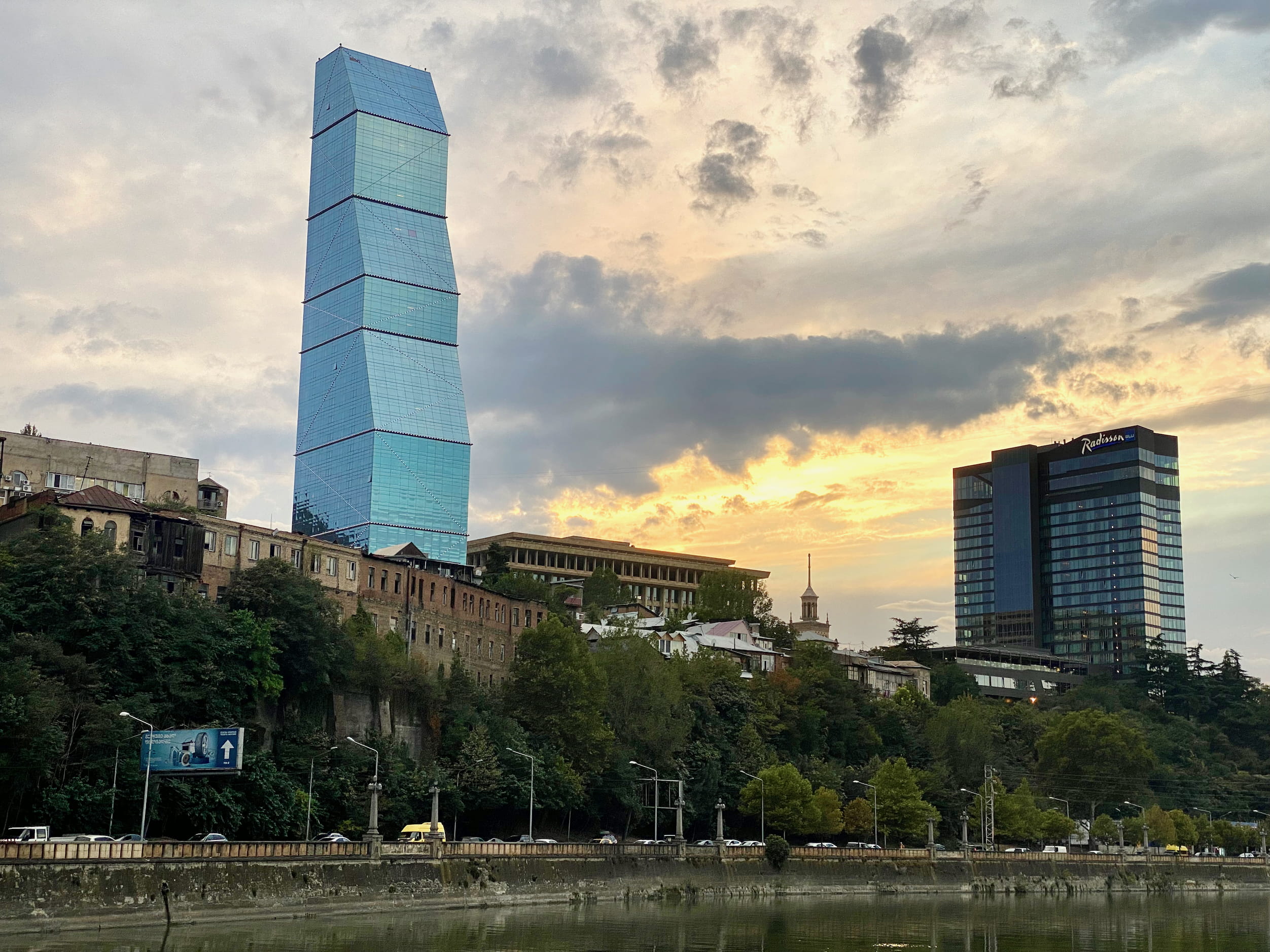
Don’t believe the nice view. The waterside is not a good place.
Silly me sees a nice long river and a pedestrian path along side it and thinks it would be a great spot for a stroll. But as we keep walking, it becomes apparent that emissions standards here are not what they are elsewhere, because the car exhaust is heavy, chemically, and nauseating. We start looking for escapes, but there are literally none. The six-lane road never lets up. The rare lights don’t give any breaks where we could even run for it. And the bridges10 that connect to the path? They only go above, and there are no stairs up.11
All this to say, we eventually learned to just take the subway everywhere. It’s weird and cool and loud and Soviet and dystopian and awesome anyway.12
Driving North to Kazbegi
The only other place in Georgia we’d visit is Kazbegi, this mountainous region in the northern tip of the country only seven miles from the Russian border.
Getting there, we’d pass a monastery that was refreshingly still active,13 a Georgian/Russian unity monument that everyone found kind of funny, cows and horses and donkeys on the road, and countless sharp peaks towering all around.
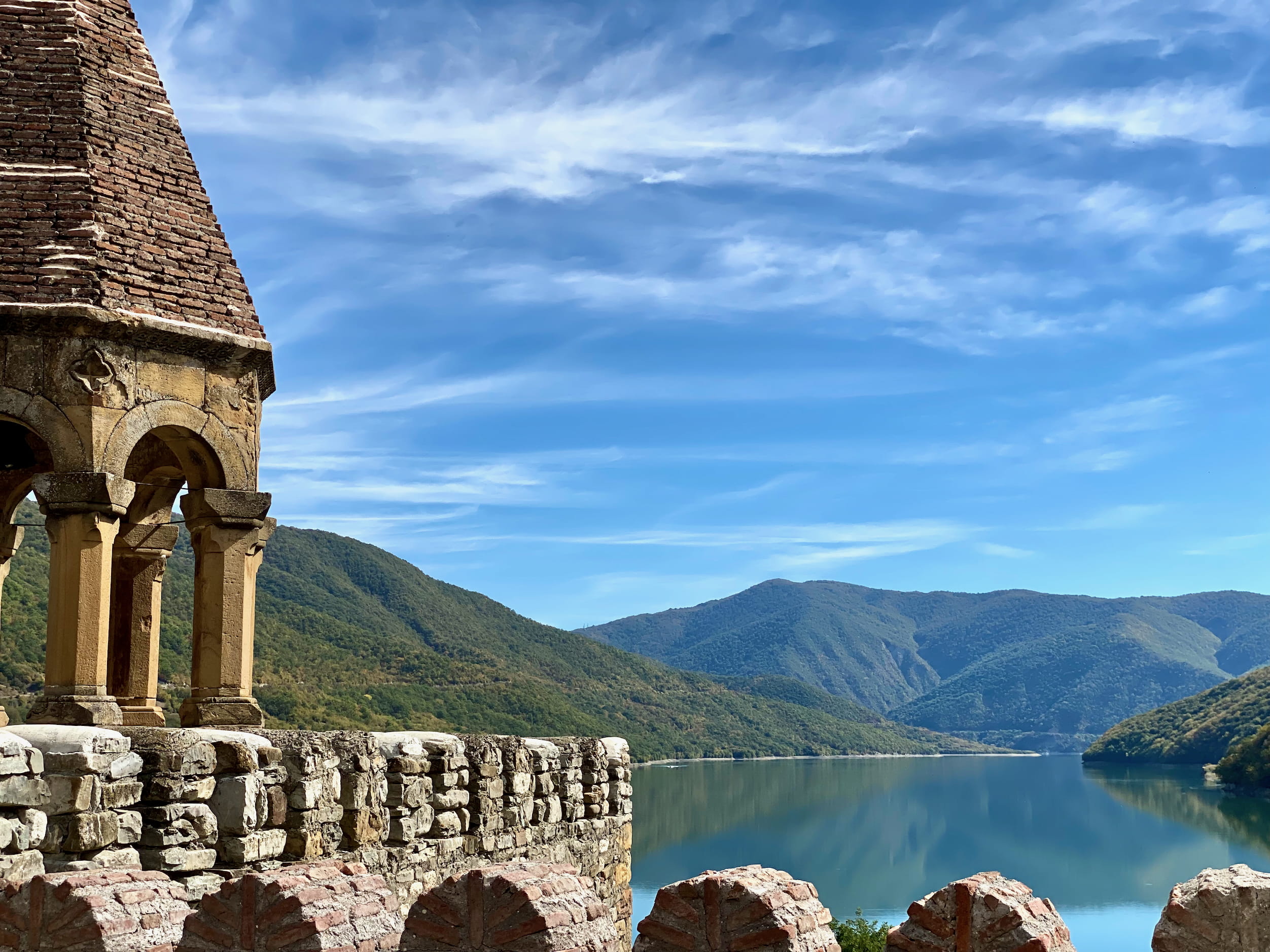
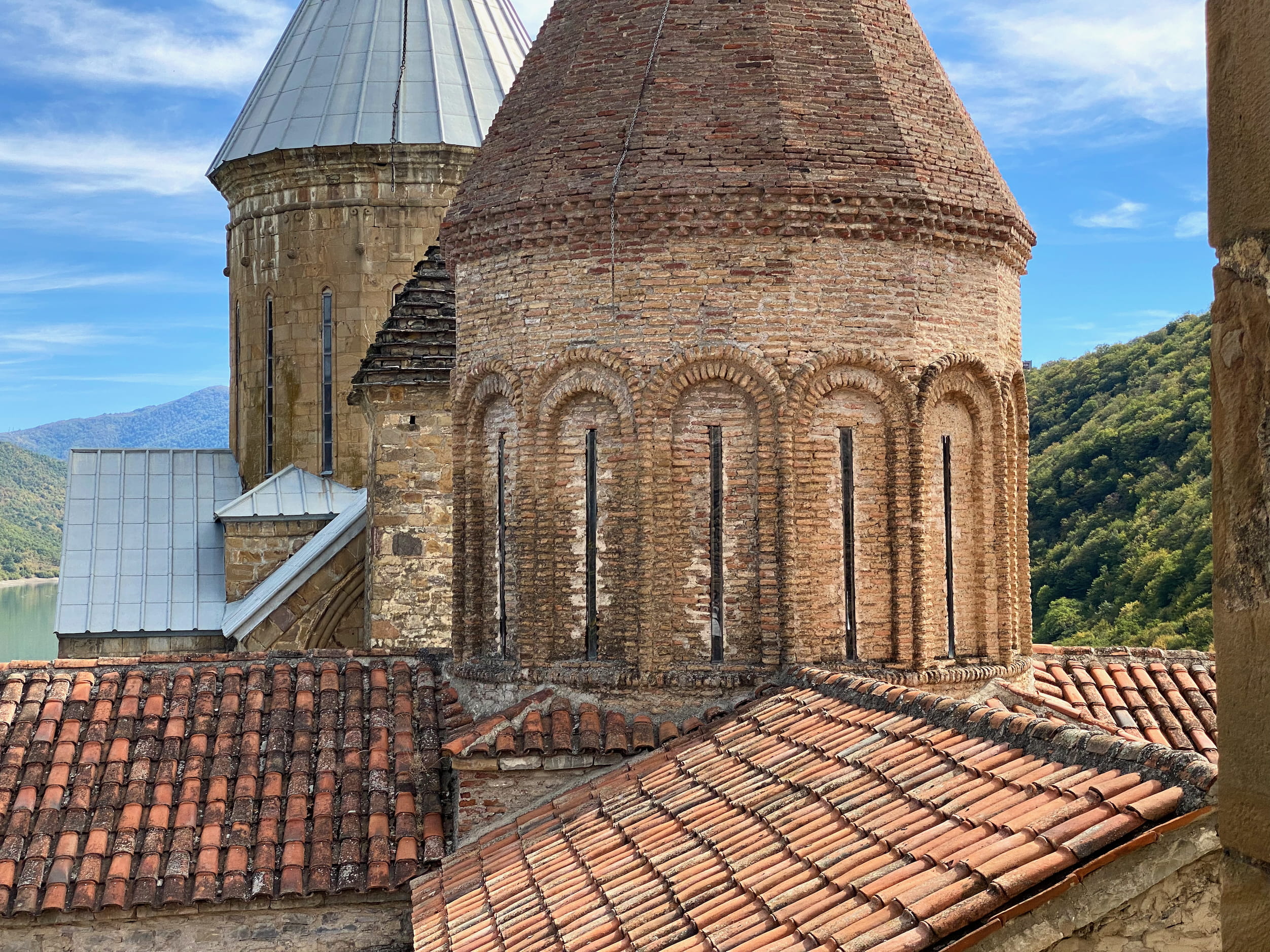
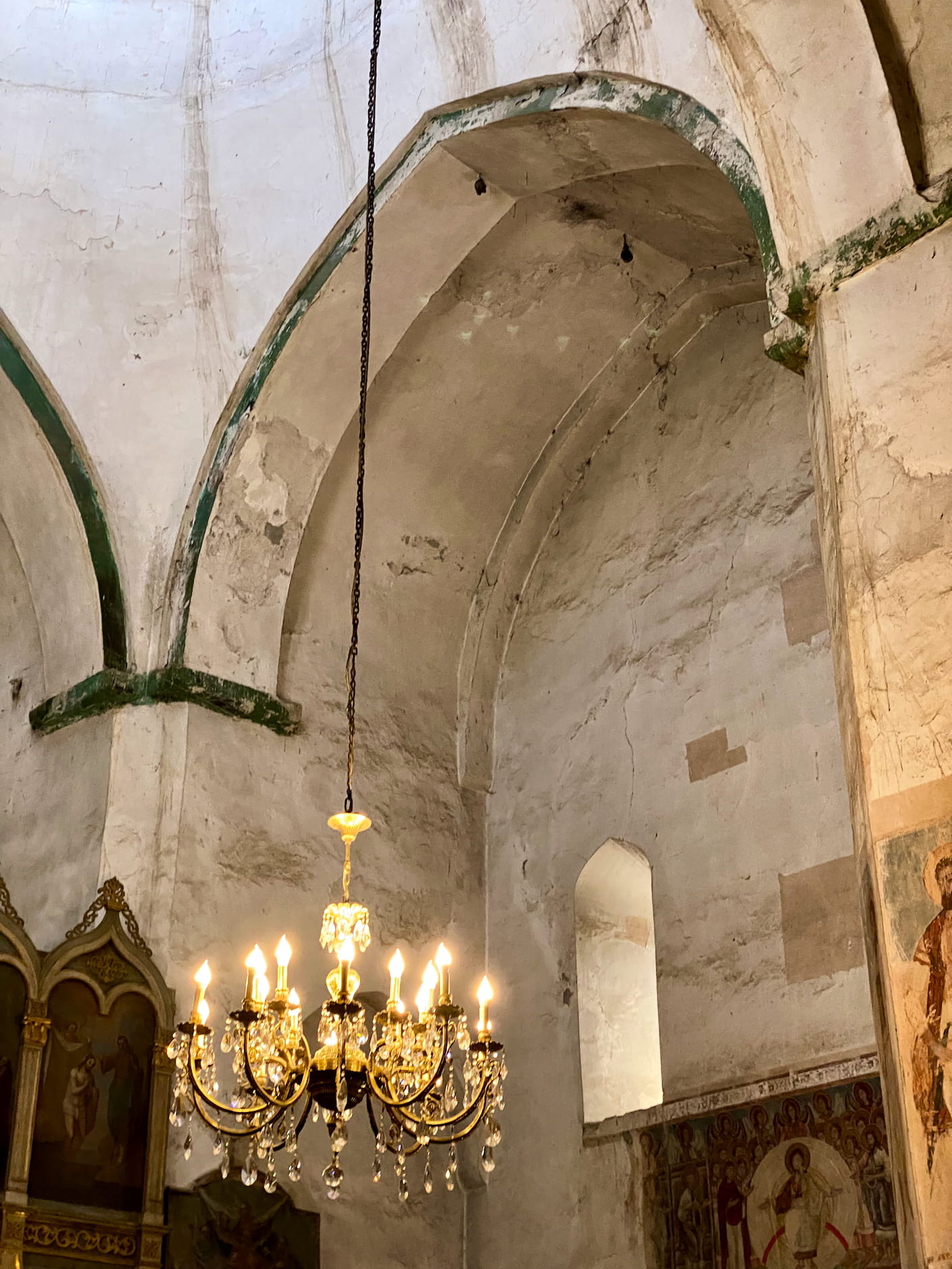
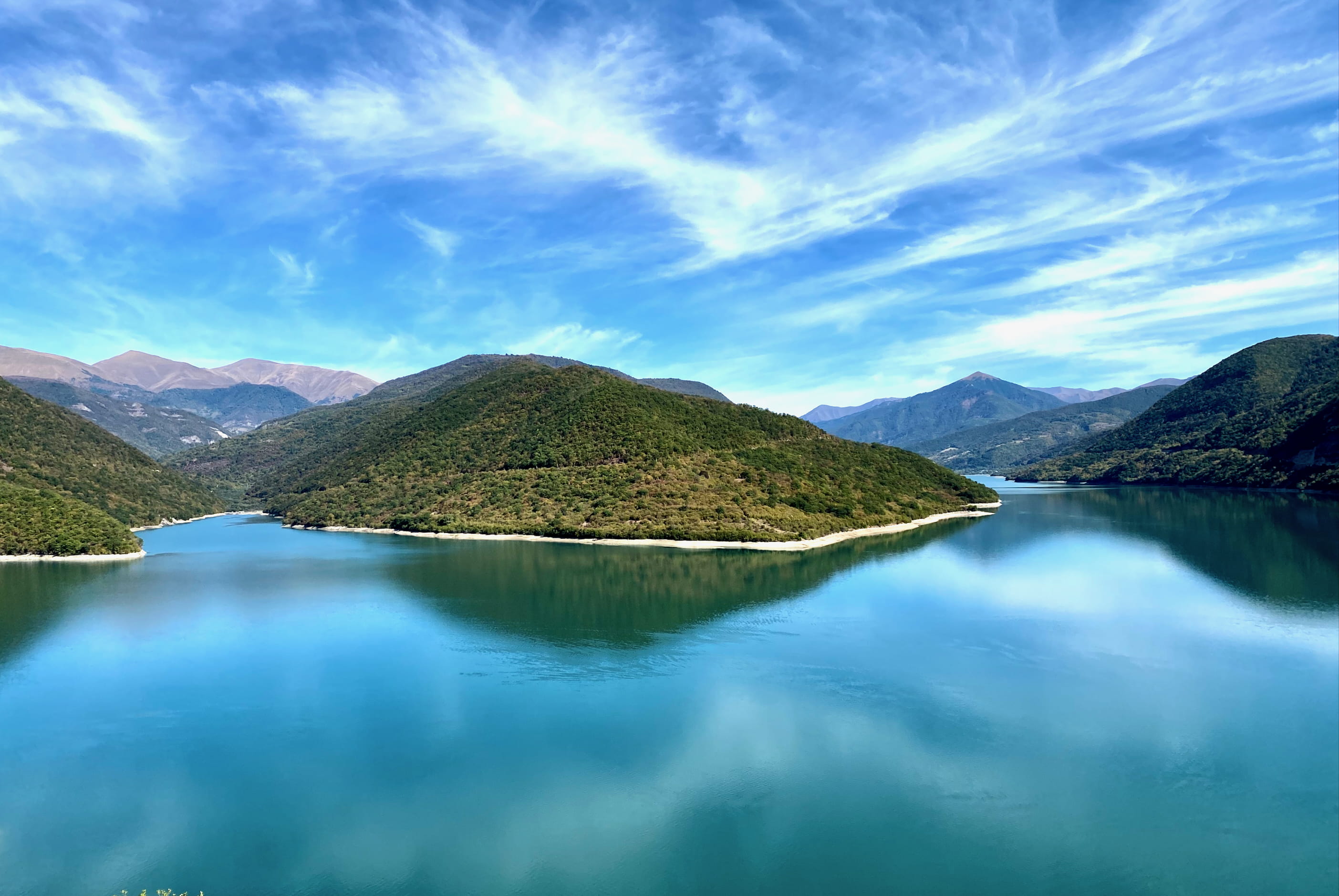
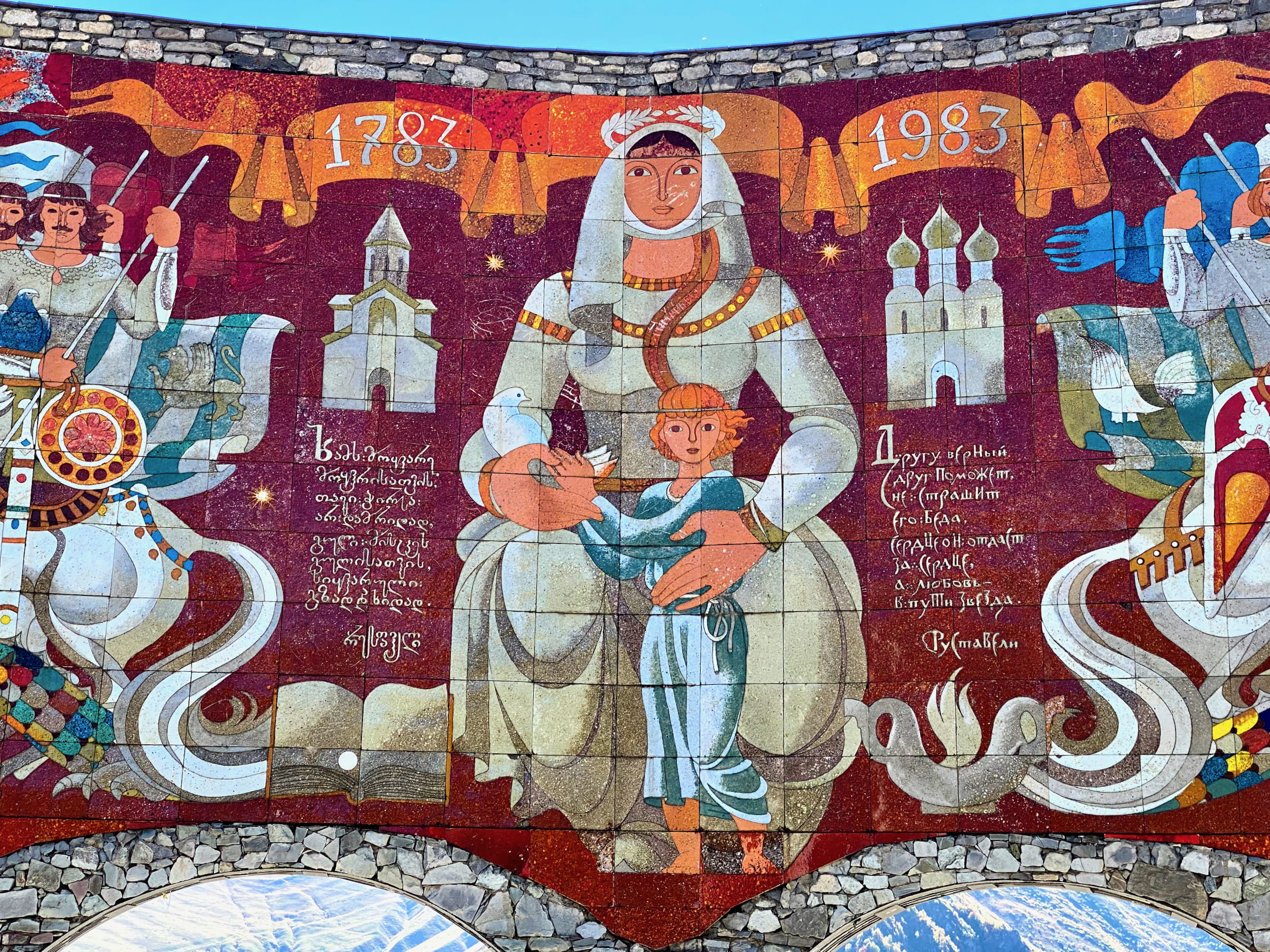
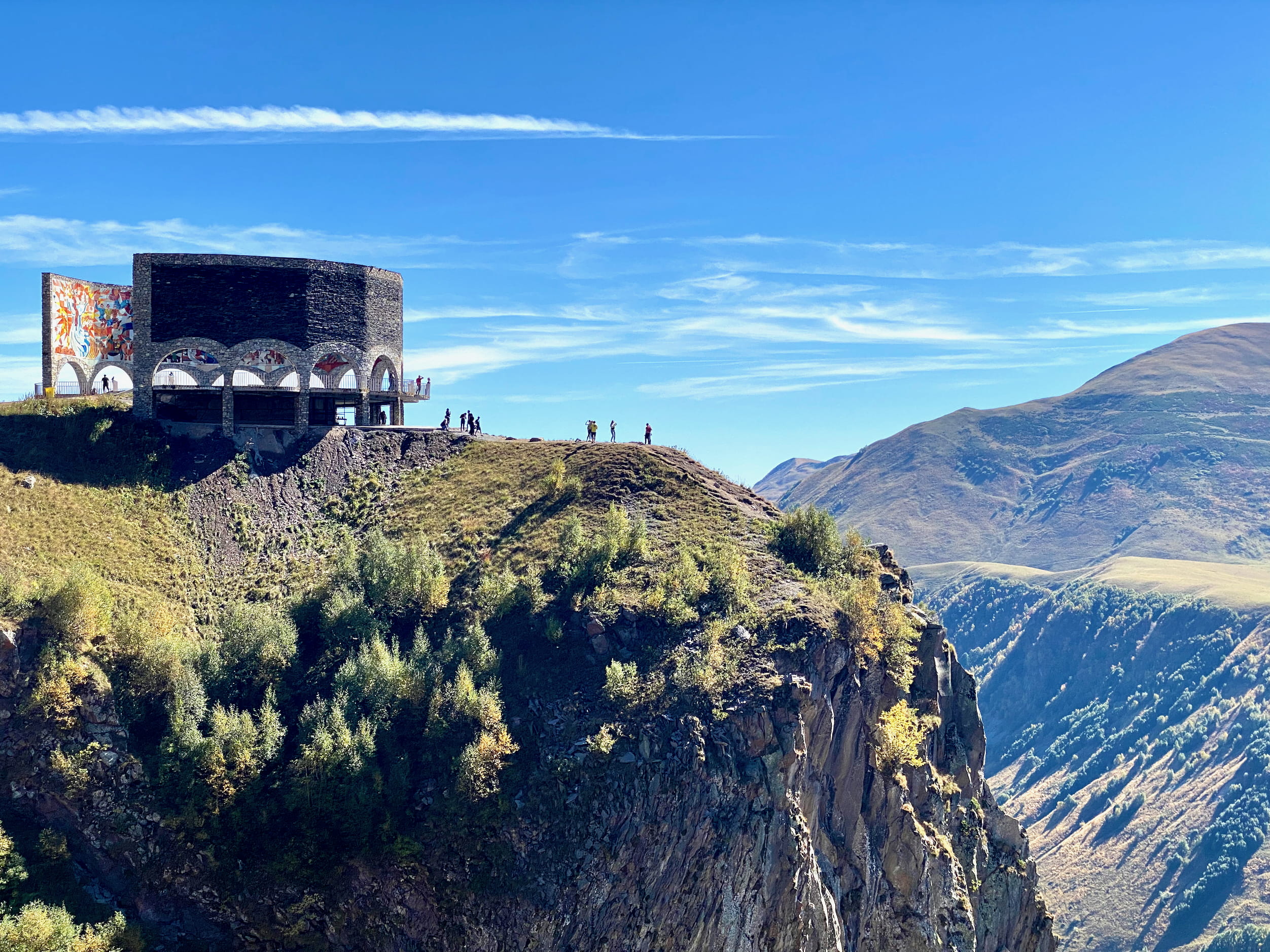
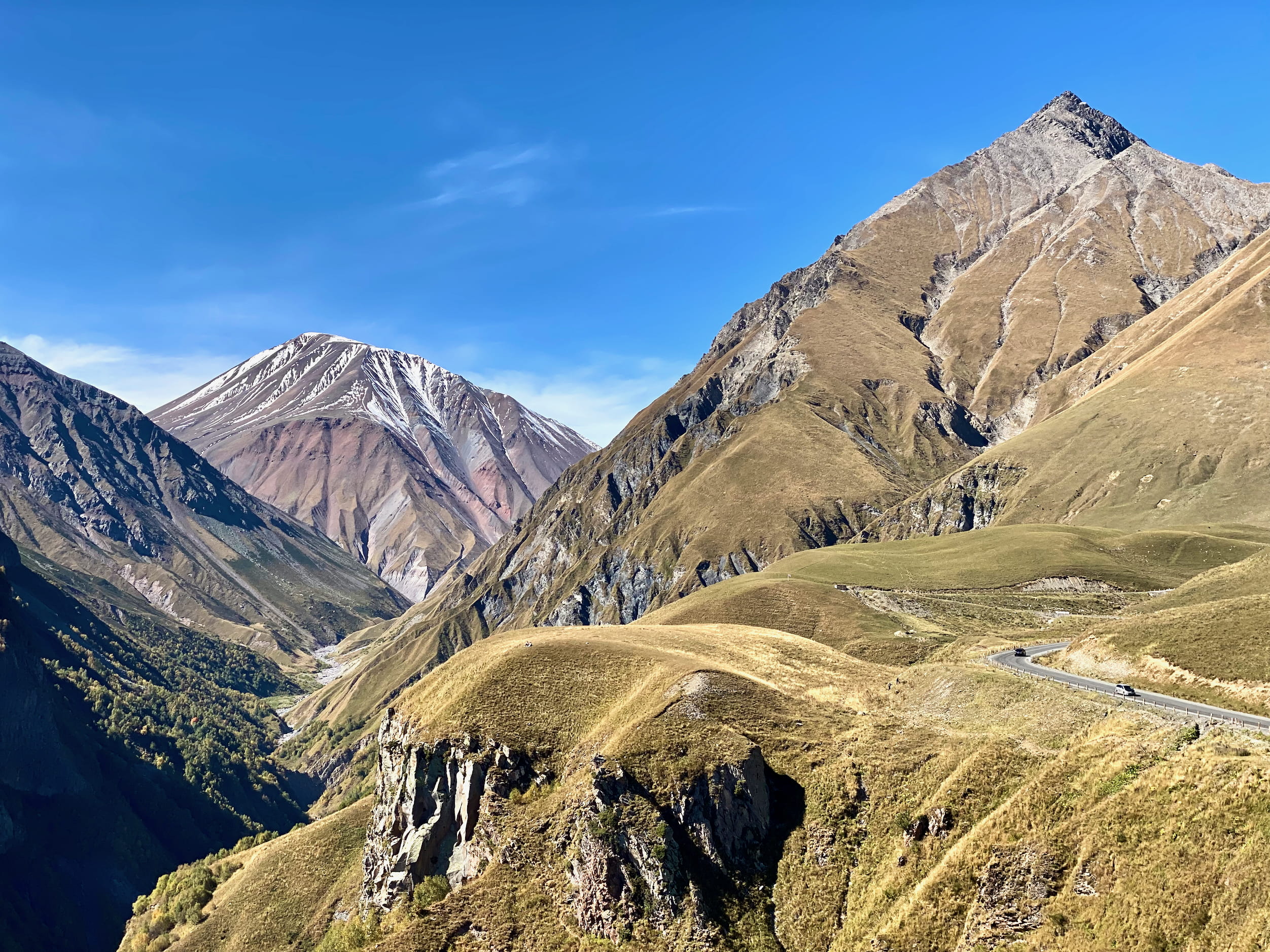
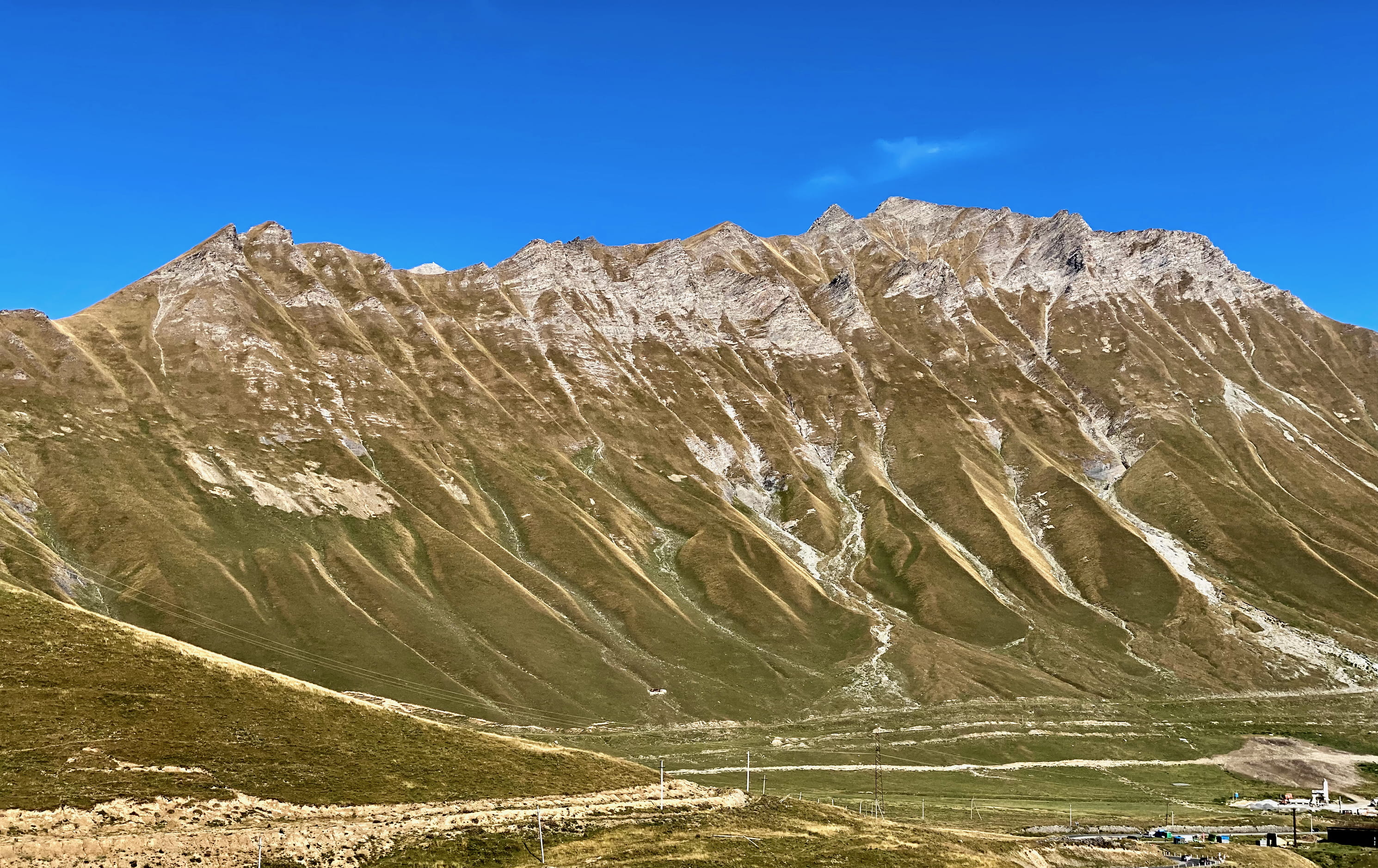
I was most engrossed by the license plates. See, the road up to Kazbegi is so narrow that trucks all line up on the side of the highway for hours14 and then all cross the mountain pass together at night. And there are a completely wild number of trucks—we passed hundreds, if not thousands. Why so many trucks? Check out where Georgia is positioned.
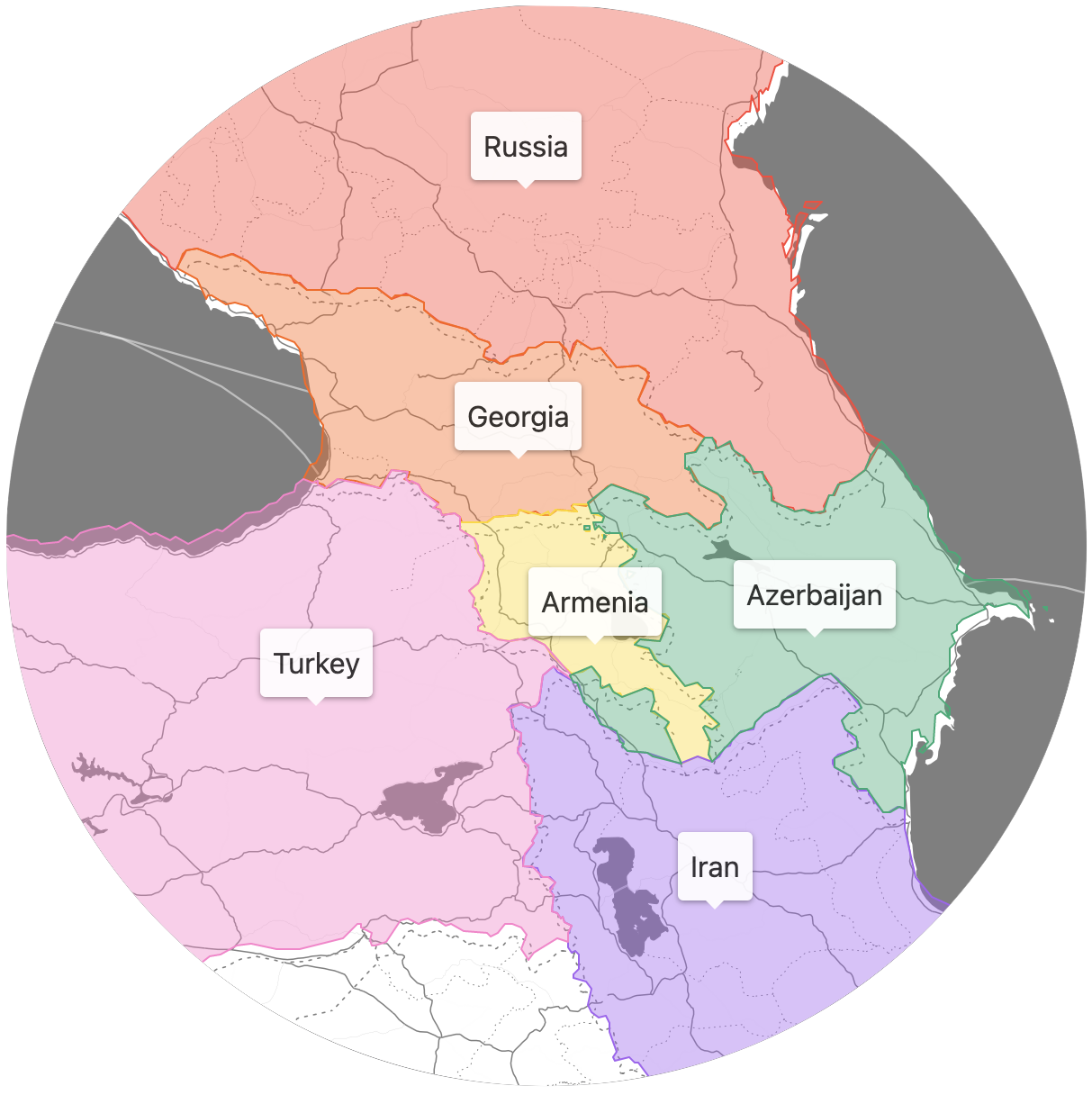
Georgia is a main transport route into Russia. I saw license plates from all the countries on that map, plus Bulgaria. For some reason, seeing Iranian and Russian license plates was especially cool for me. The USA having such poor relations with those countries gives them kind of a mythical, forbidden status in my mind.15
A huge number of trucks were from Armenia. Armenia is in a crappy local situation, with Turkey and Azerbaijan bullying them from the left and right. So the only routes in and out are down (Iran) and up (Georgia). One of our drivers was an Armenian Georgian. He said Iran isn’t appealing for most Armenians, so they go north. There’s a huge Armenian presence in both Russia and Georgia.16
Kazbegi
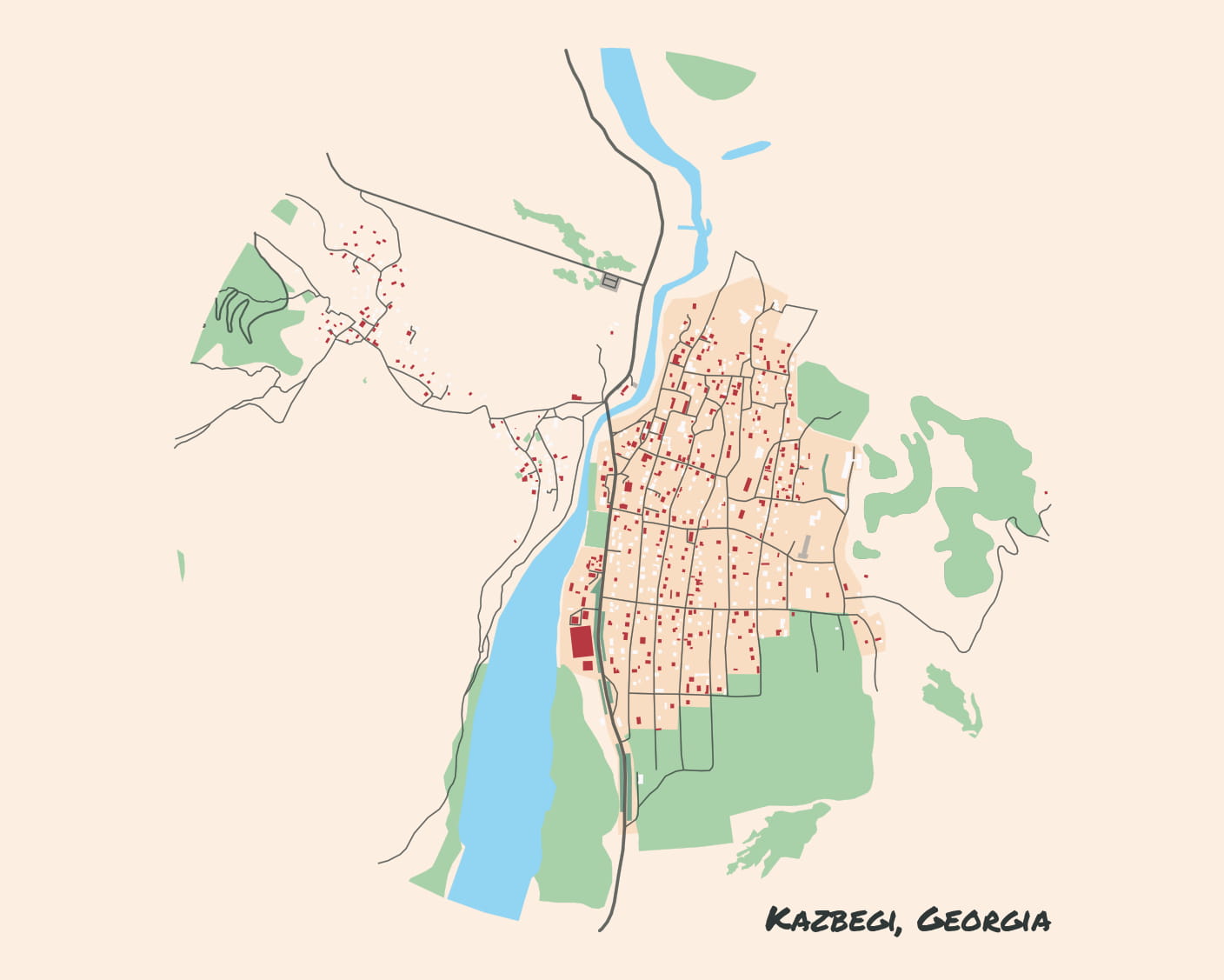
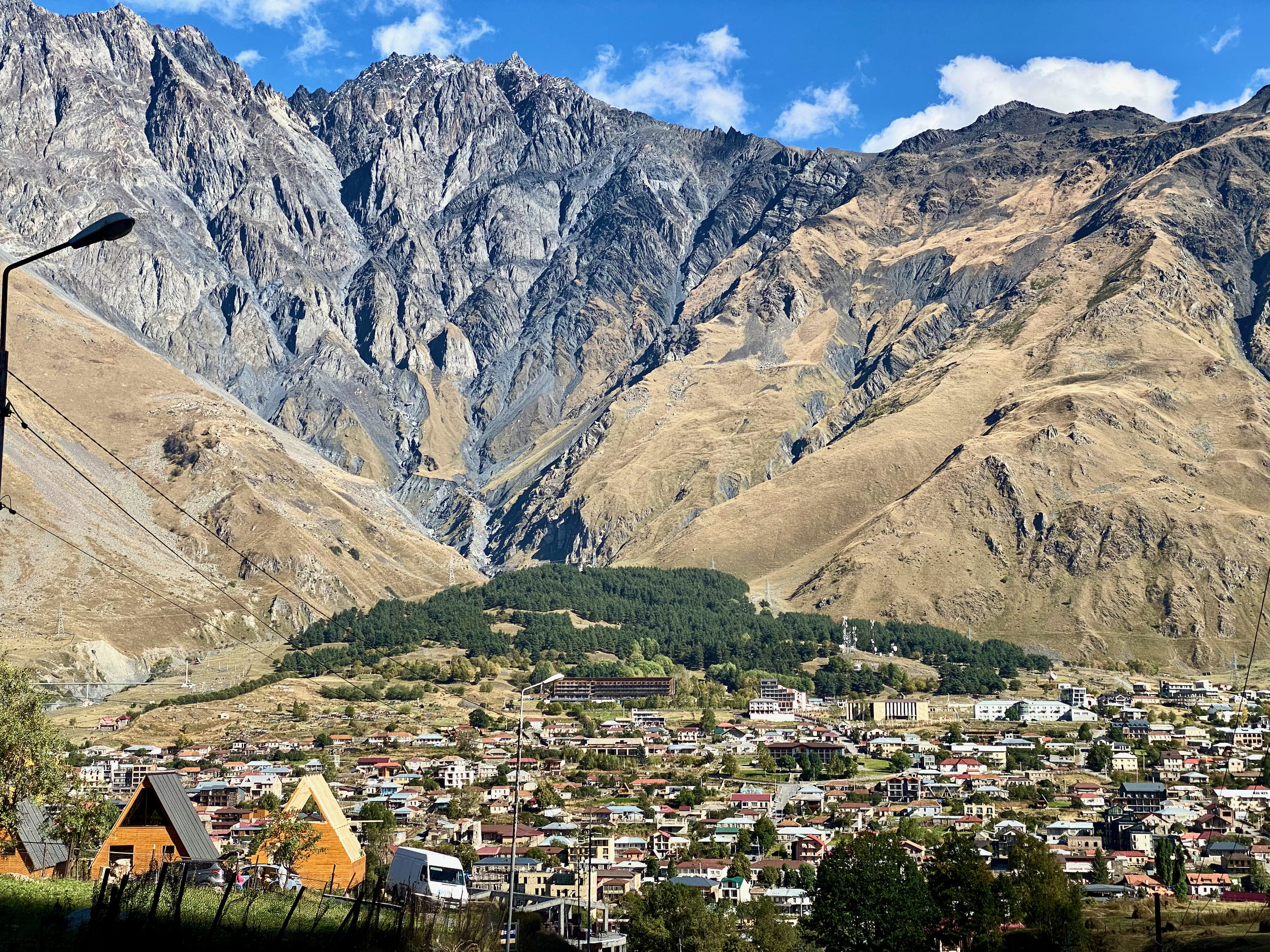
I think the town here is technically called Stepantsminda, population ~2k. Dramatic landscape. Excellent spot to go off on day hikes.
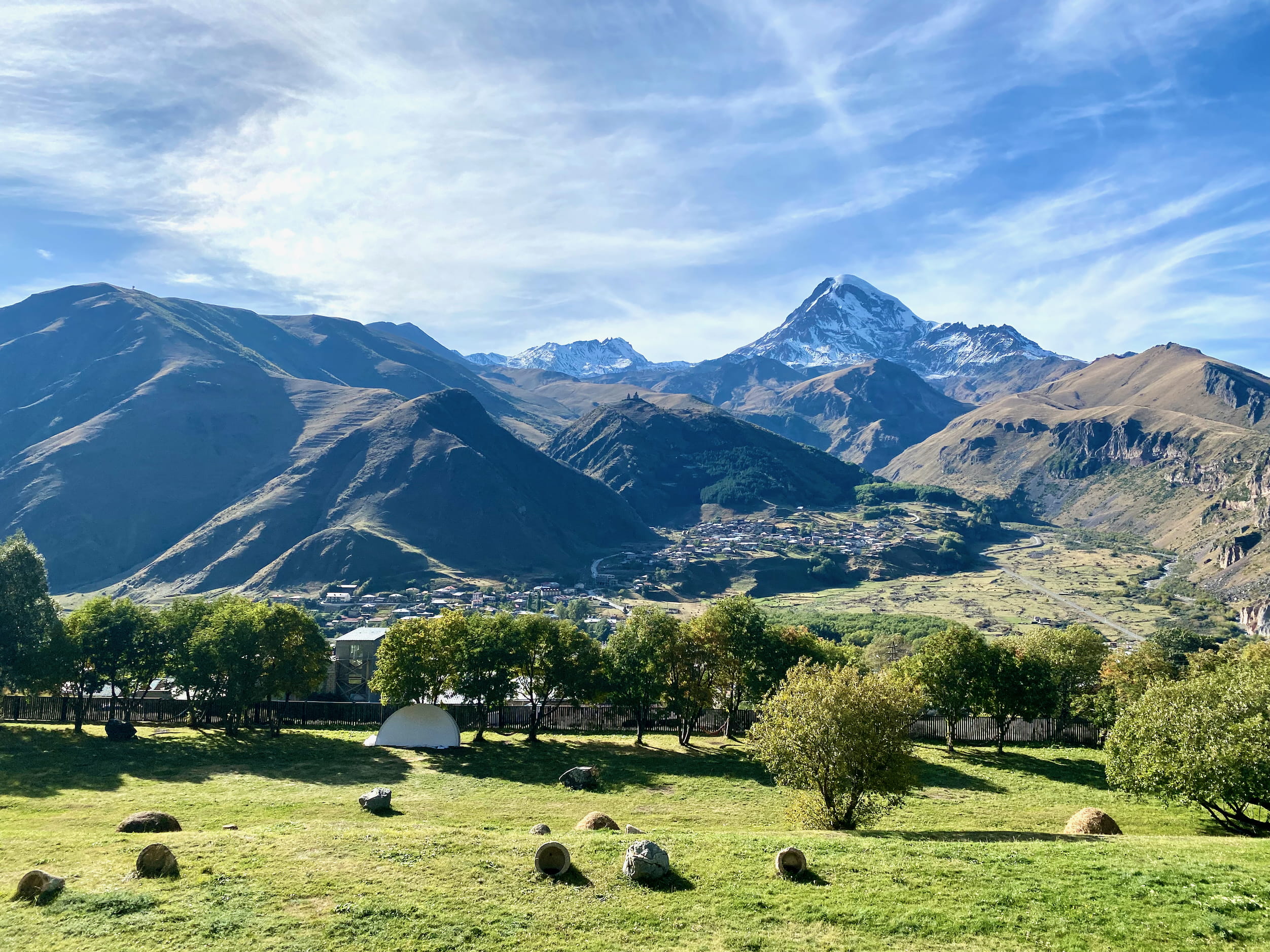
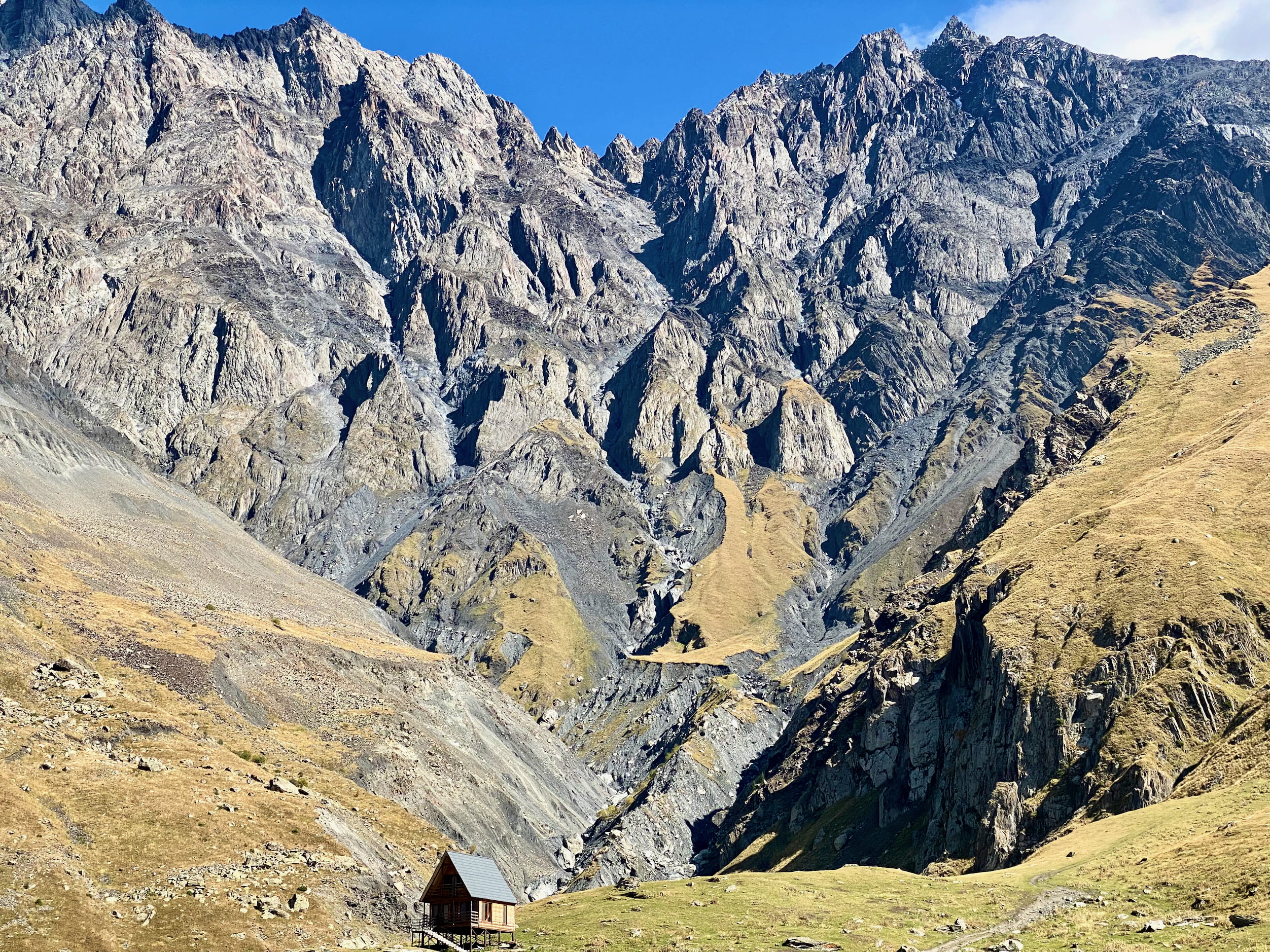
You could tell the tiny town was growing fast to support more tourism. Lots of construction, and lots of rusty ruins and crumbling abandonments.
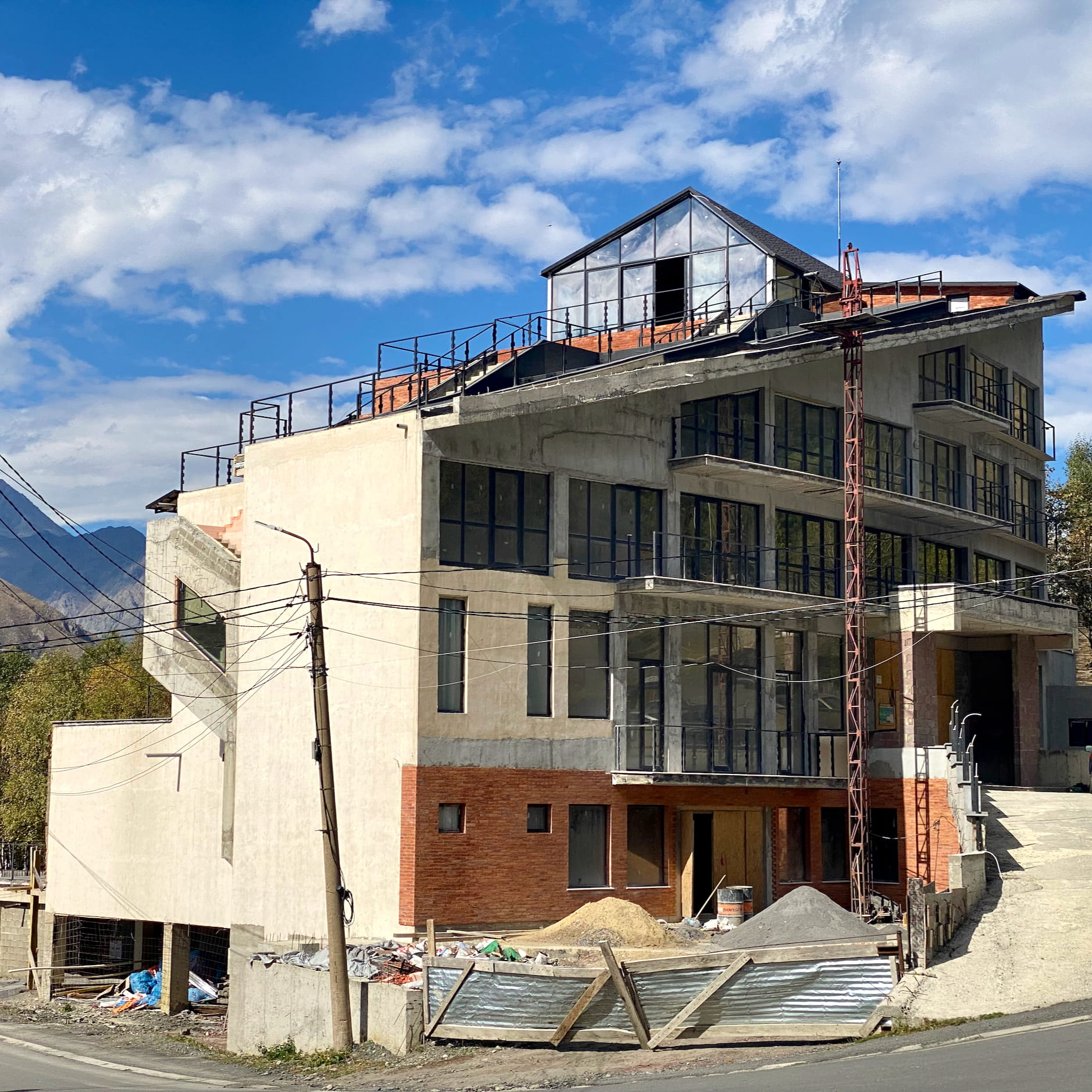
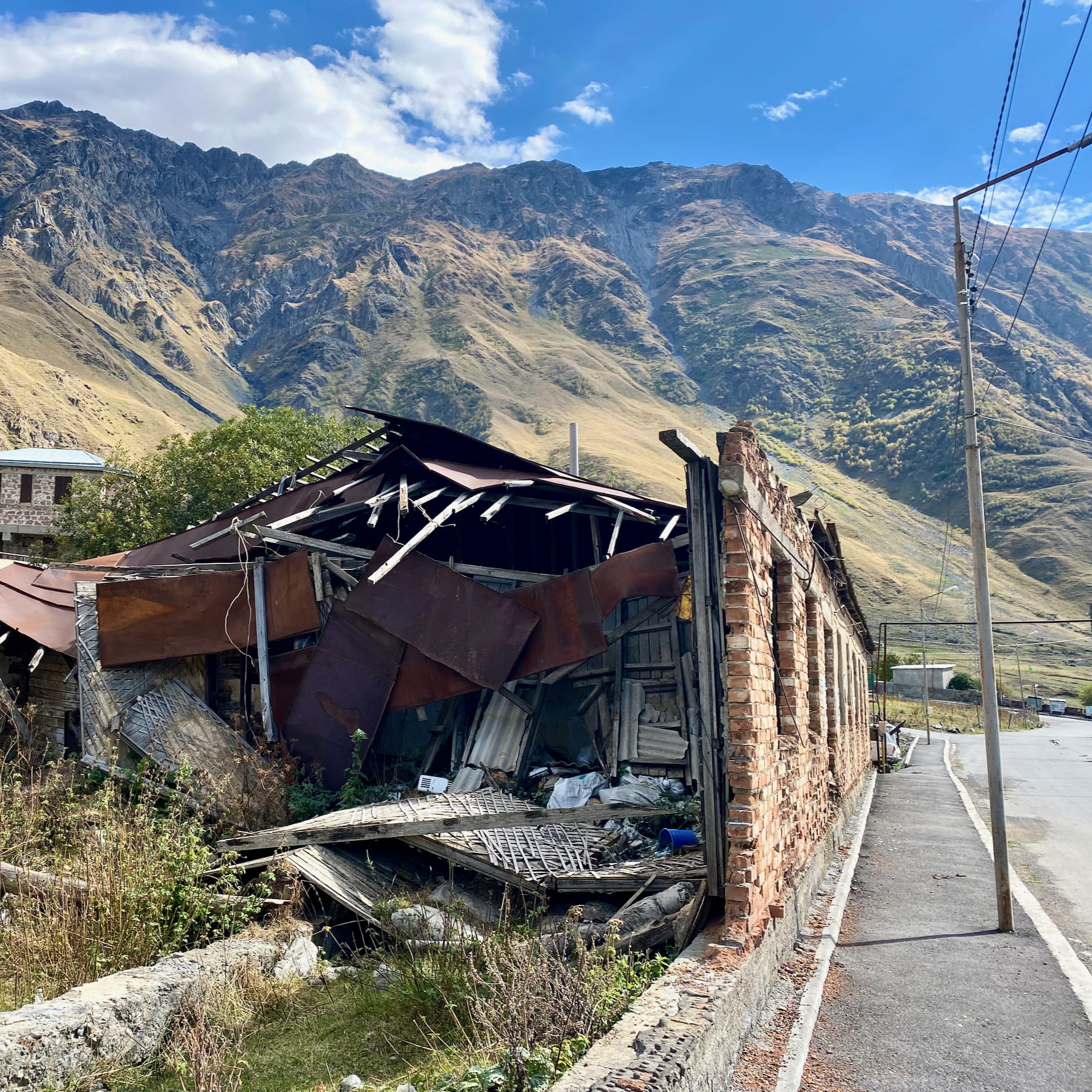
We stayed at the Rooms Hotel Kazbegi. This was a long-debated splurge—not a huge one, w/ Georgian prices, but nicer than our usual budget allowed—but it was worth it. The place was cavernous, and not too crowded, so there were dozens of zones of huge leather couches to sink into and hang out at. Plus just stupidly gorgeous views from the giant deck. If that wasn’t enough, the food was shockingly good. A hotel like this can could get away with crappy grub. But it was the kind of place where even if you order a dish you know well, they will nail it.17 Mad respect. (And killer brunch buffet included.)
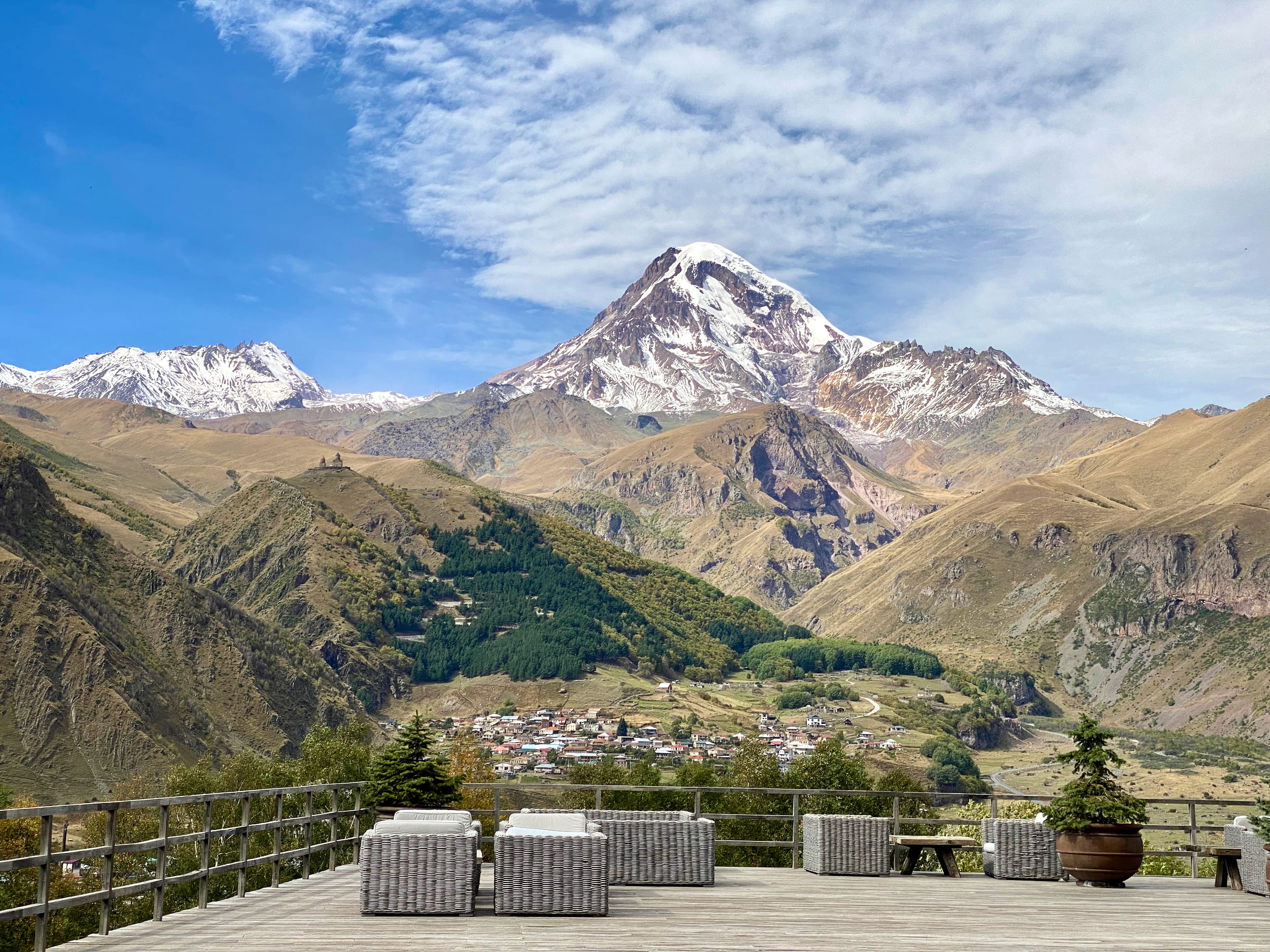
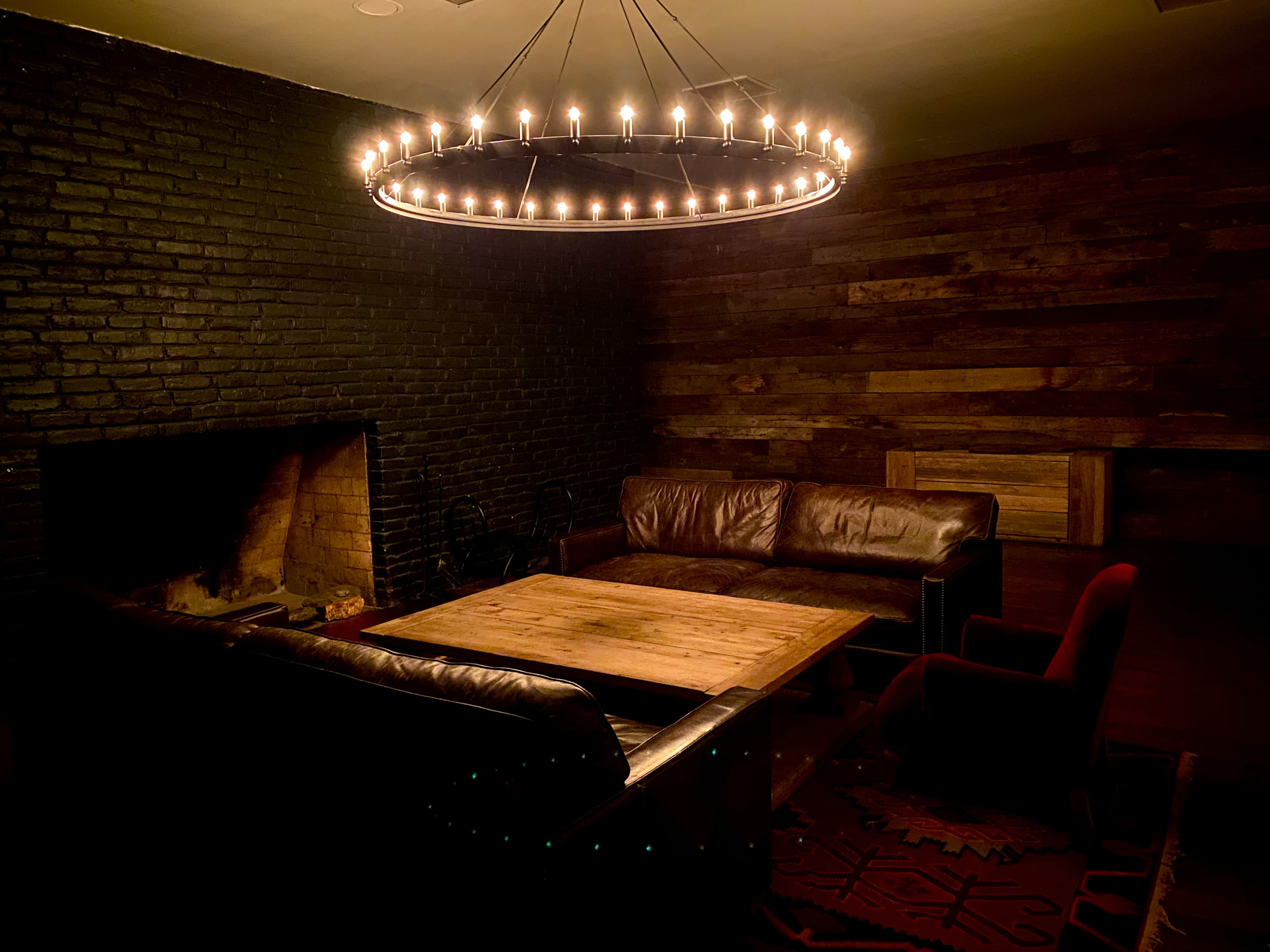
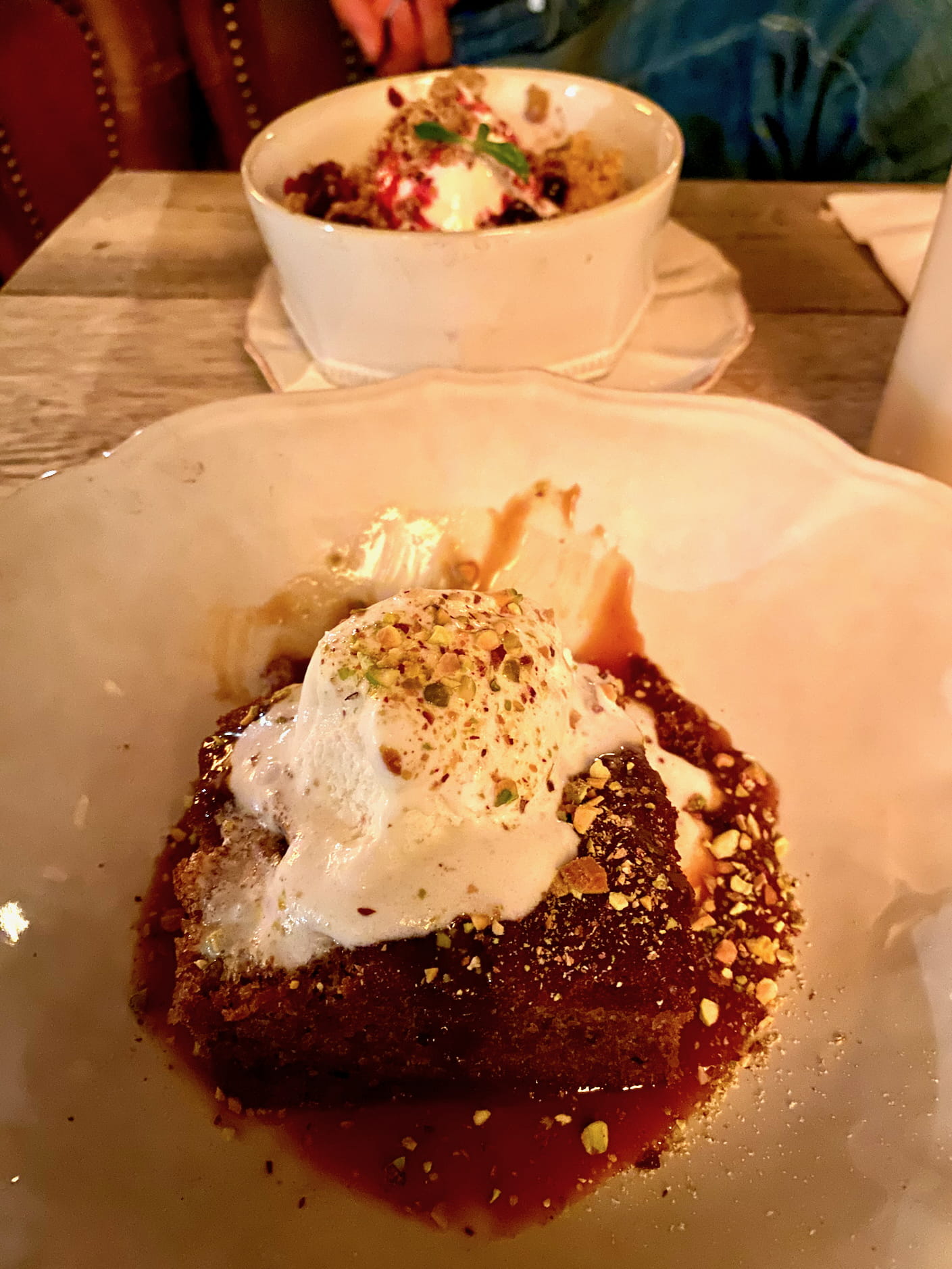
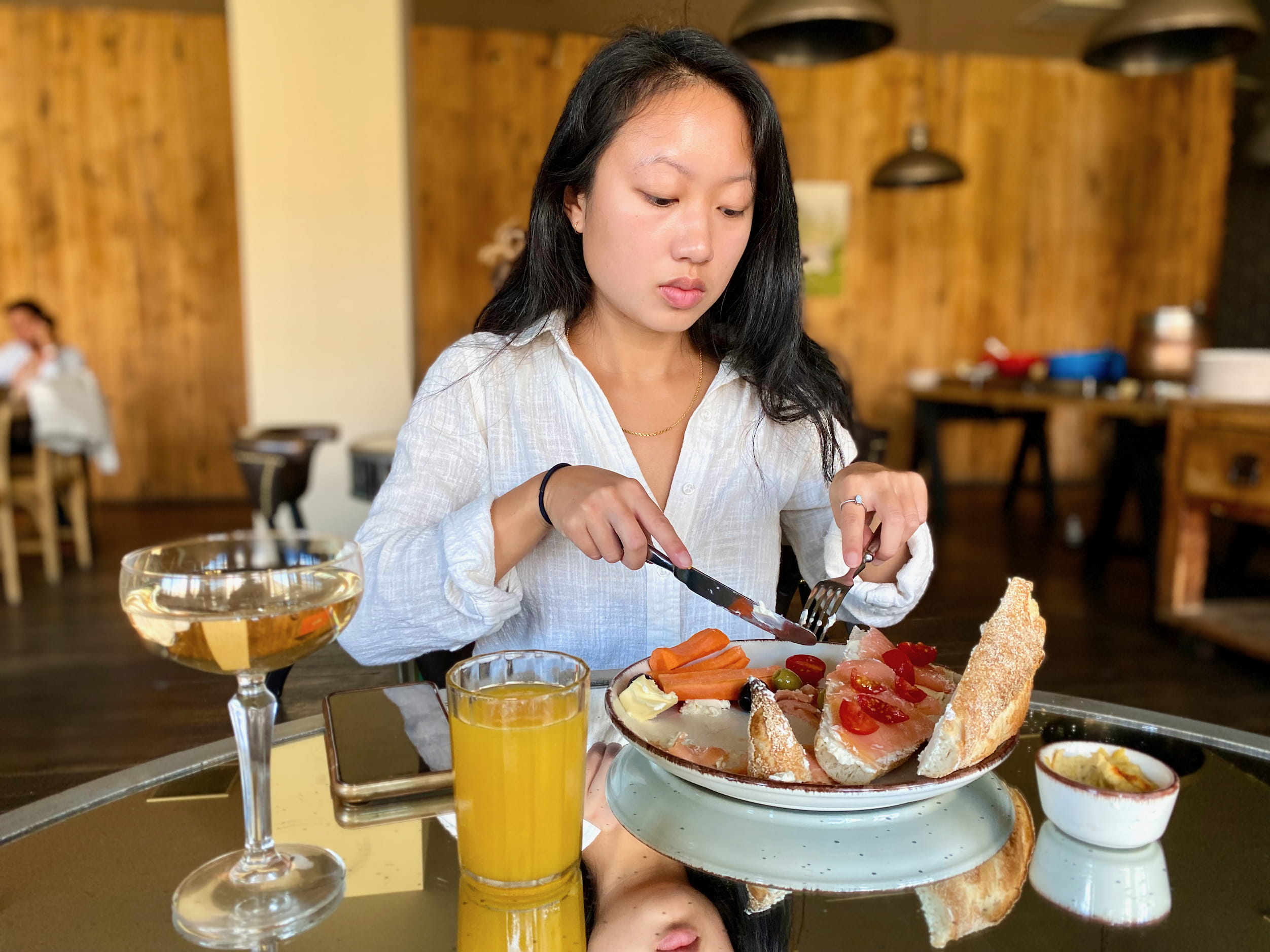
Food pictures are really where my iPhone photography hits its limit. I think it’s mainly because the sensor is just too small for dim lighting, which dinner often entails. Couple that with poor colors and no depth of field, and… well yeah, just trust me on this one.
The only downside was that I got the worst food poisoning I would get the whole year in Tbilisi. Still not sure from what—potentially some fresh mayonnaise from the supermarket? Regardless, this meant I spent the first few days in Kazbegi emergency aborting hikes, and eating the blandest food I could find.
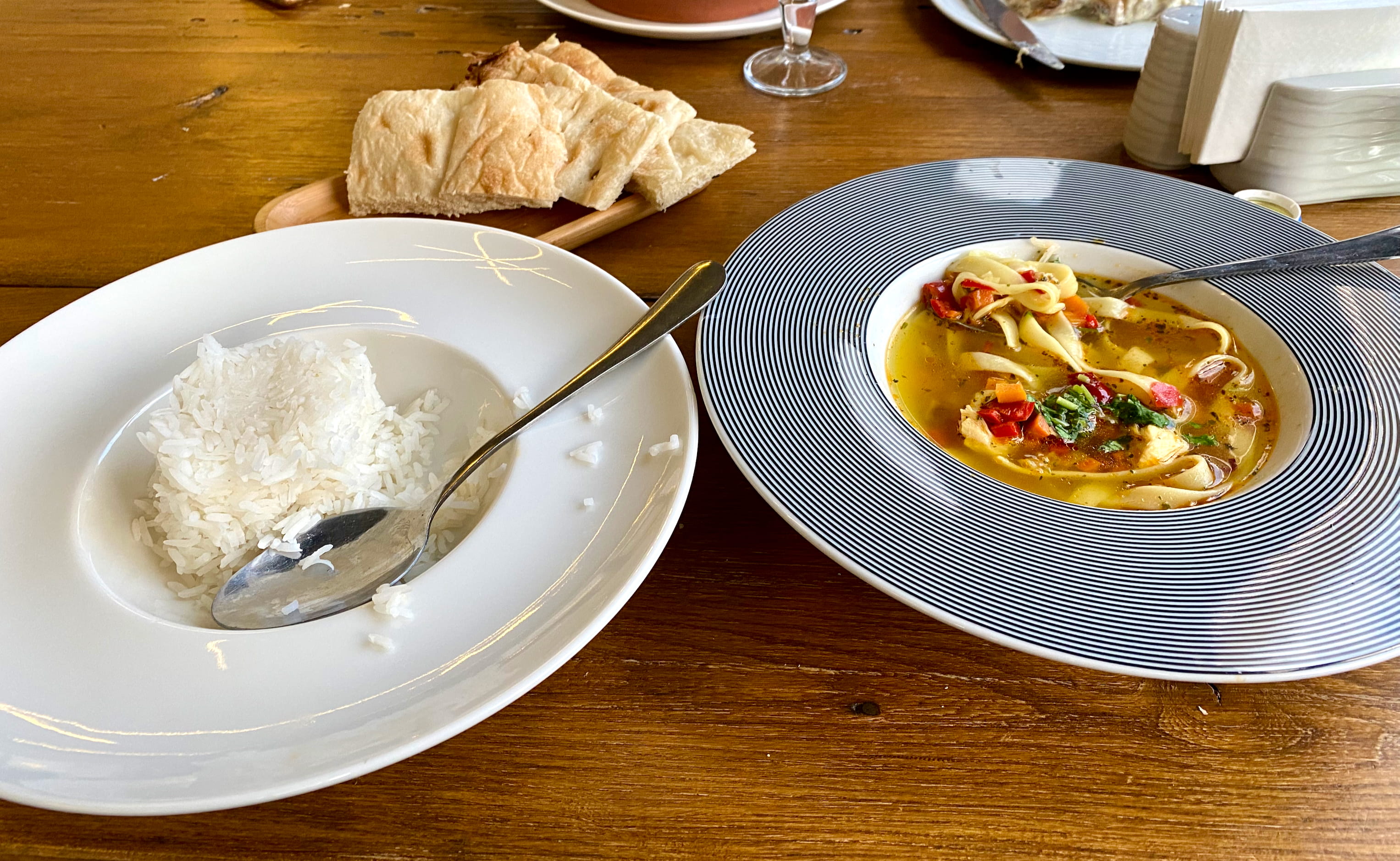
Honestly, I’m just thankful we found a restaurant in town that was open every day and had a good repertoire of simple carbohydrates.
But once I could manage a few consecutive hours away from the bathroom, we were able to try out the main hill walk up to a monastery.
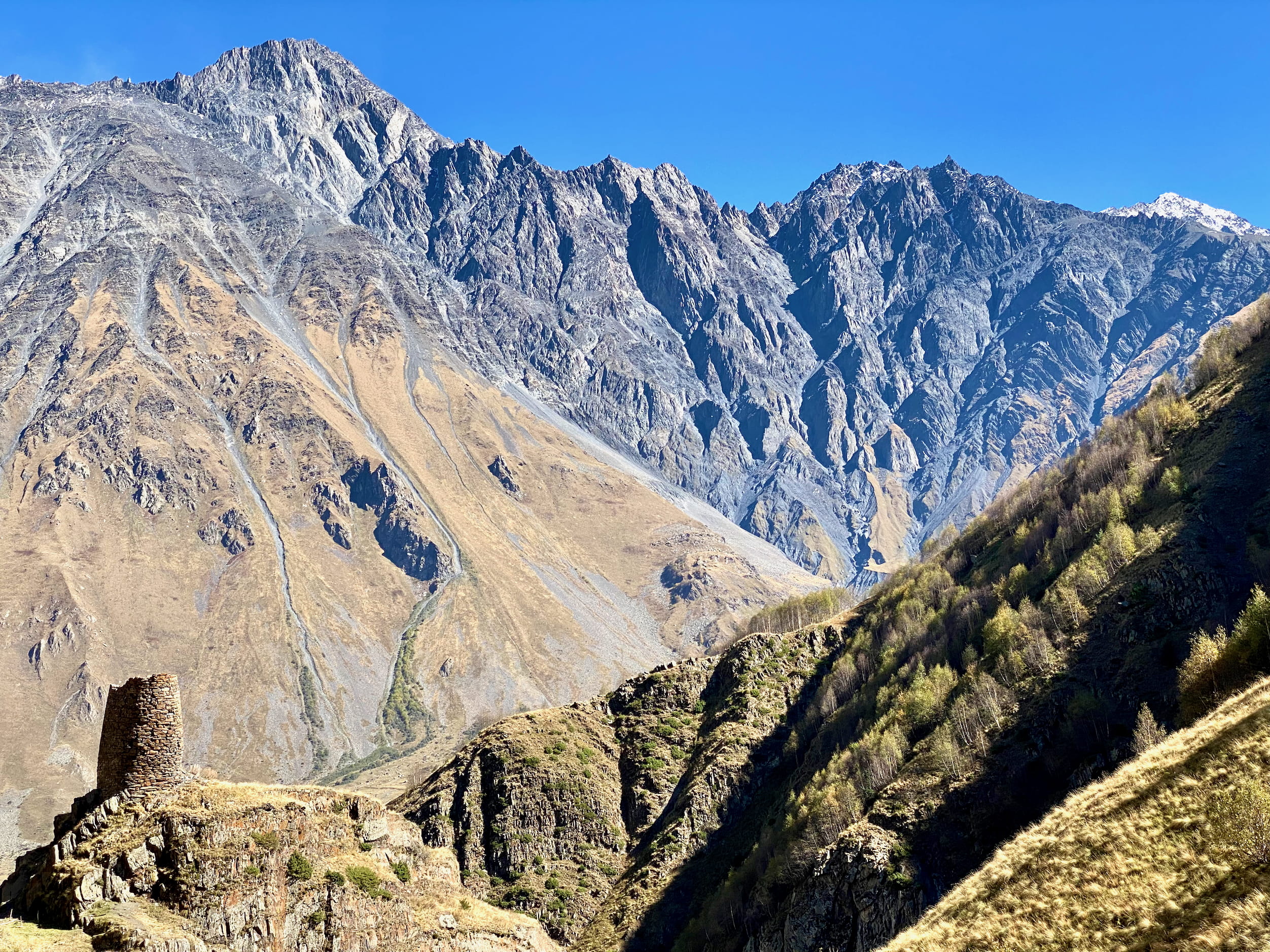
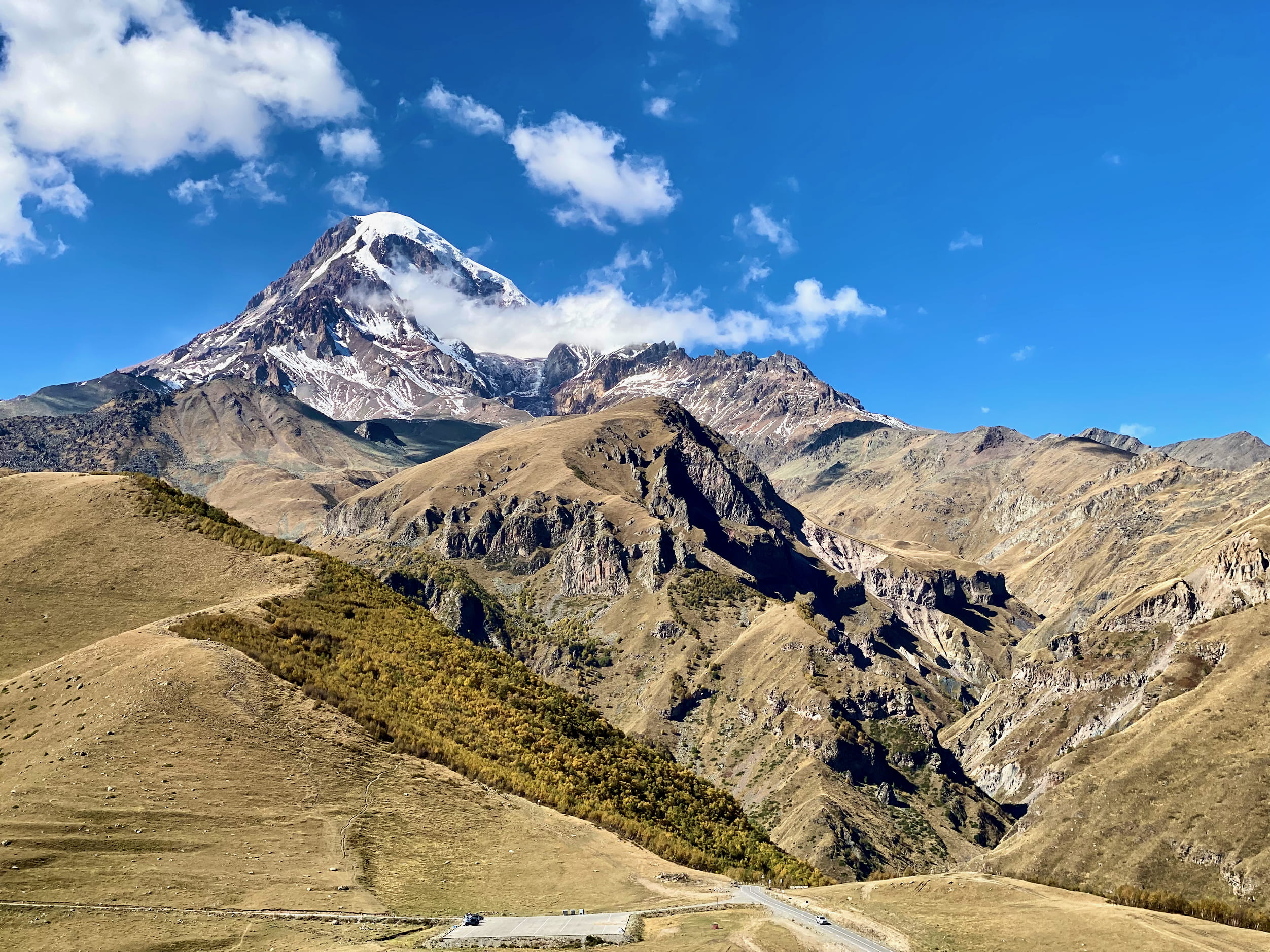
Monastery not pictured. You can see it on a hilltop in the first photo of the Rooms Hotel. Right after the text where I wrote “killer brunch buffet included.” God I sound like a tool.
While we were there, Putin’s announced his draft. Immediately, hundreds of thousands of men fled Russia. Where did they go? Well, since the EU is closed off to Russians, there are a few main exit points: Georgia, Kazakhstan, and Mongola. And in Kazbegi we were just under 7 miles from the Russian border with Georgia.
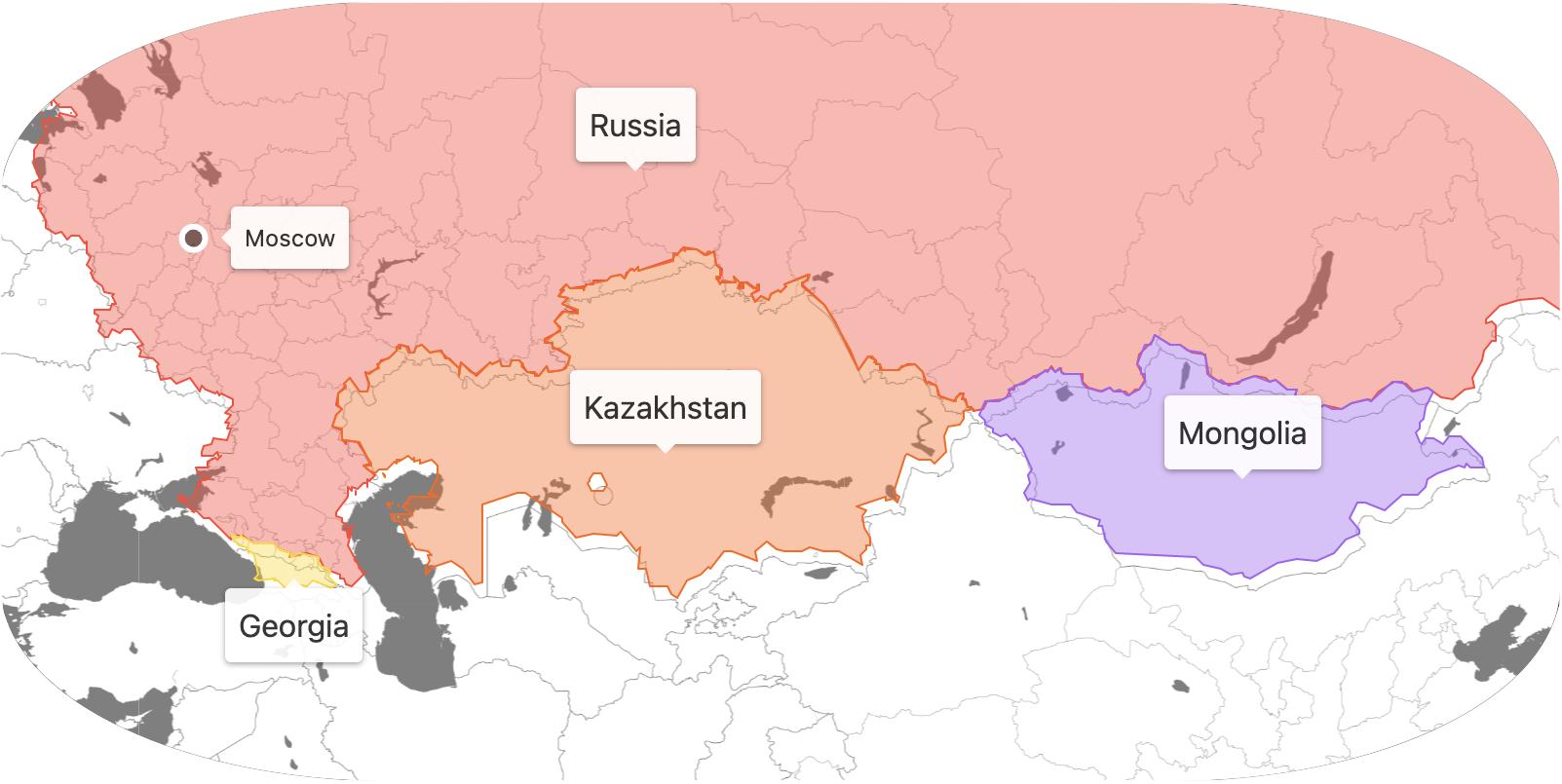
So, we saw them coming in. Cars, by the dozens. We’d pass a parking lot full of Russian plates. The hotel filled up, and clumps of Russians were hanging out in town by the convenience store and the main highway exit. When we’d go back to Tbilisi in a few days, the bars we went to were filled with Russians. Even the hikes got more crowded than normal with young men who seemed a bit out of place.
In the room next to us, we could hear a man rehearsing his segment about the draft for what sounded like the BBC. (Boy, they talk loud.) Apparently, the situation on the Russian side of the border quickly became a nightmare. What started as a few hour wait ballooned into multiple days. Surprisingly, Russian exit customs was letting people through. It sounded like the real problem was getting there from somewhere like Moscow. A straight shot from Moscow to Kazbegi is a 22 hour drive, but police checkpoints throughout Russia prevent you from so obviously hightailing it out of there. So instead, people would drive part of the way, hire a driver or change cars, drive another part of the way, etc.
I found myself glued to the news, whereas friends I talked to in the States were barely aware of the event. It was a great illustration to me of how local one’s interest is.
Another thing it made me reflect on is my gut feelings towards people from countries doing what I perceive to be bad things. After absorbing so much news about Russia and Ukraine over the last year, it felt too easy to look at young military-age Russian men and immediately think ill of them. But seeing them, and even meeting and chatting with them, I immediately realized how silly this was. They were just people. Of course. It made me remember my Russian friend Alexey, who I had lost touch with, but I remember feeling so much in common with him that we’d both remarked it felt like we were the same person born in different countries.
And then, reading about EU countries debating whether to allow Russians fleeing the draft to enter, I was surprised to see Germany was considering it while others weren’t. At first, I had shared the view of the others: dissenters ought to stay inside Russia to increase the odds of protest and rebellion. Sure, the retaliations to protestors in Russia are brutal—immediate imprisonment or on-the-spot draft notices—but that’s life. But seeing Germany mentioned made me think a bit more. Perhaps, when faced with the pressure to (a) support something terrible or (b) ruin your life, a very sensible thing you can do is invent option (c) flee?
Little Observations in Georgia
Now comes the awkward section where I feel an unstoppable compulsion to share photos I took of things I found funny or interesting, but for which the photos inevitably look crappy. I’m trying it at the end this time. Is that better? Who knows. Anyway, here we go.
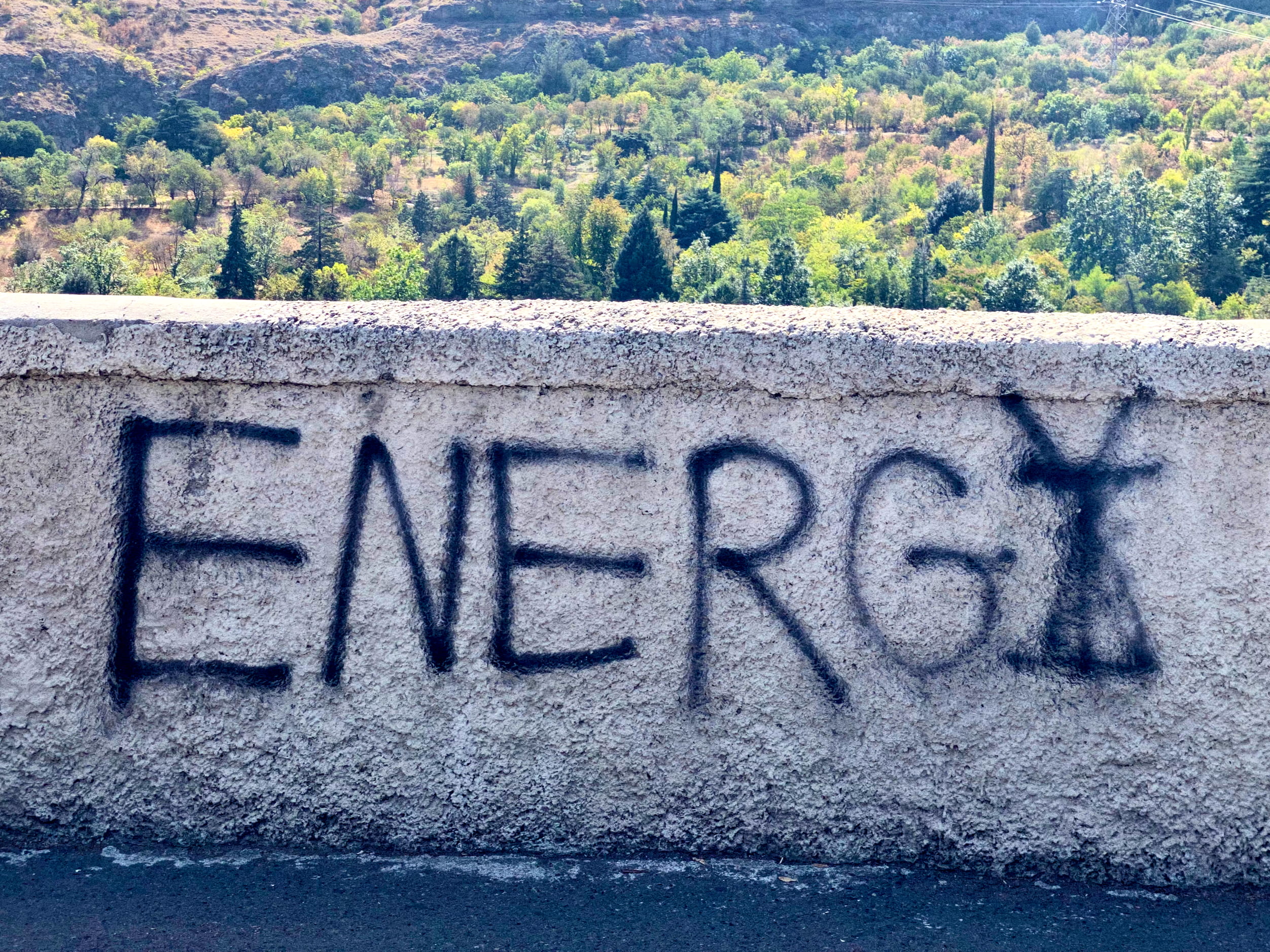
Was this a spell-checking vigilante, or an oh shit moment from the author?
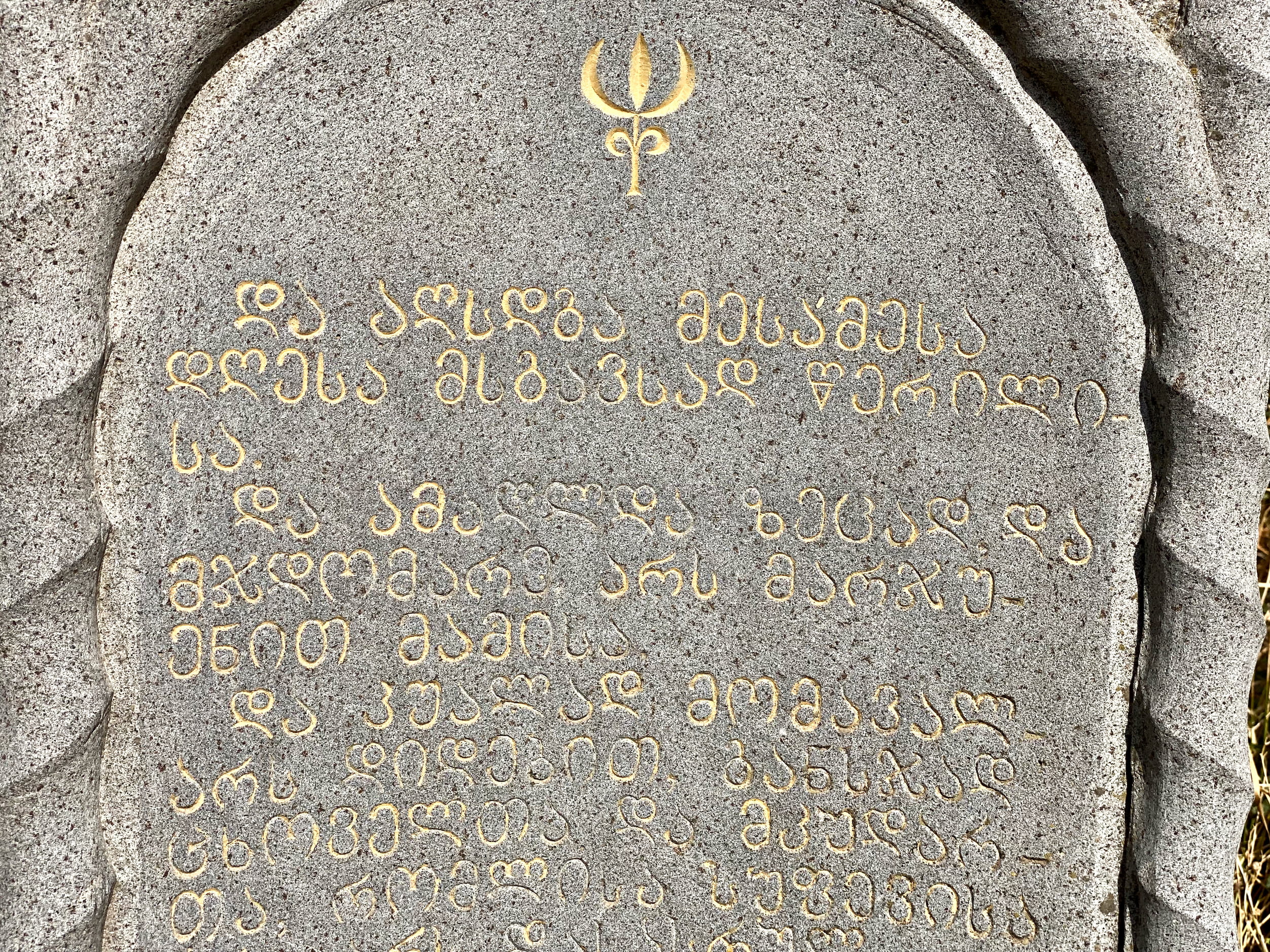
Georgian is written in this beautiful curvy script. An alphabet with 33 letters, it has no upper or lower case. I couldn’t tell from looking whether it’s written left-to-right or right-to-left. (The answer is left-to-right, like English.)
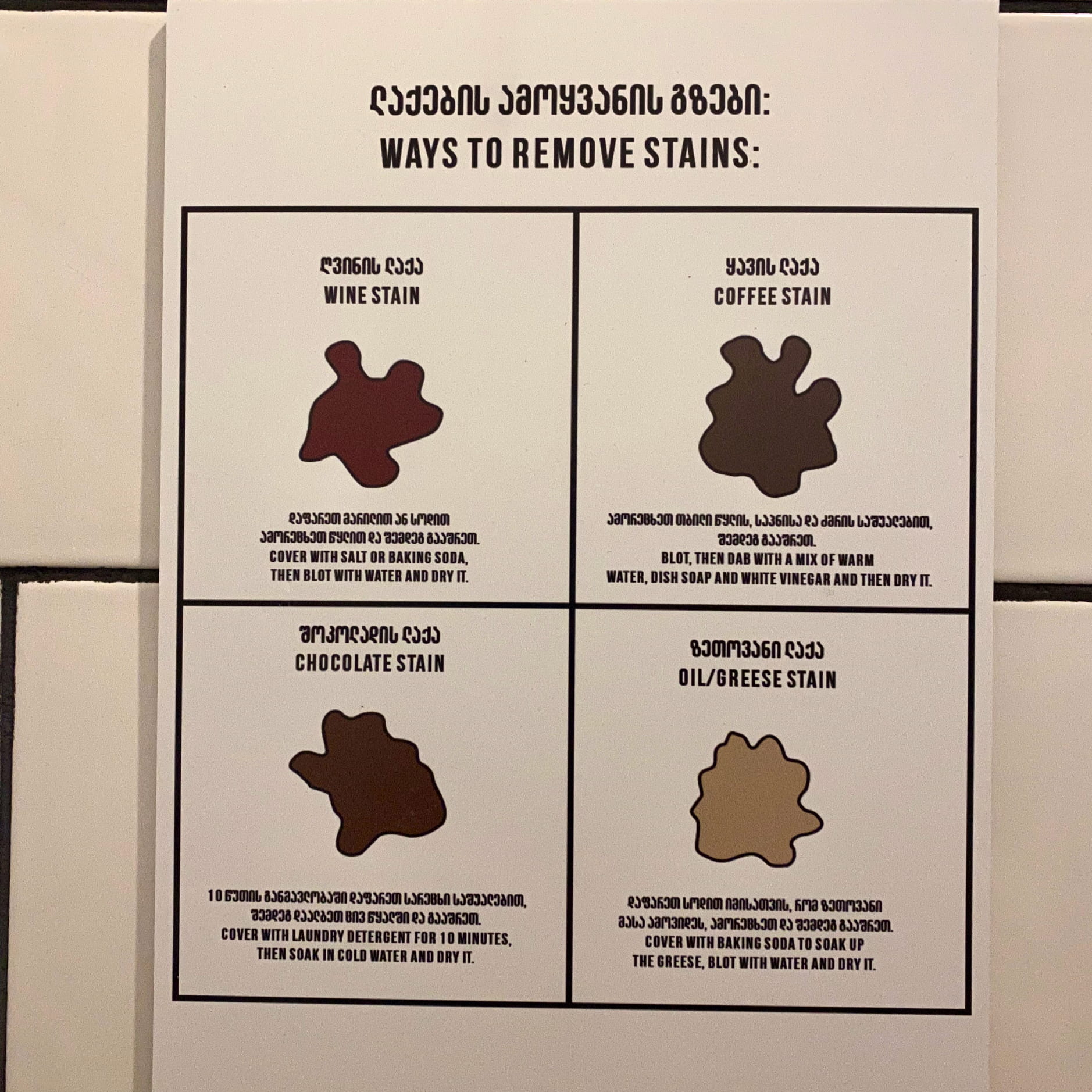
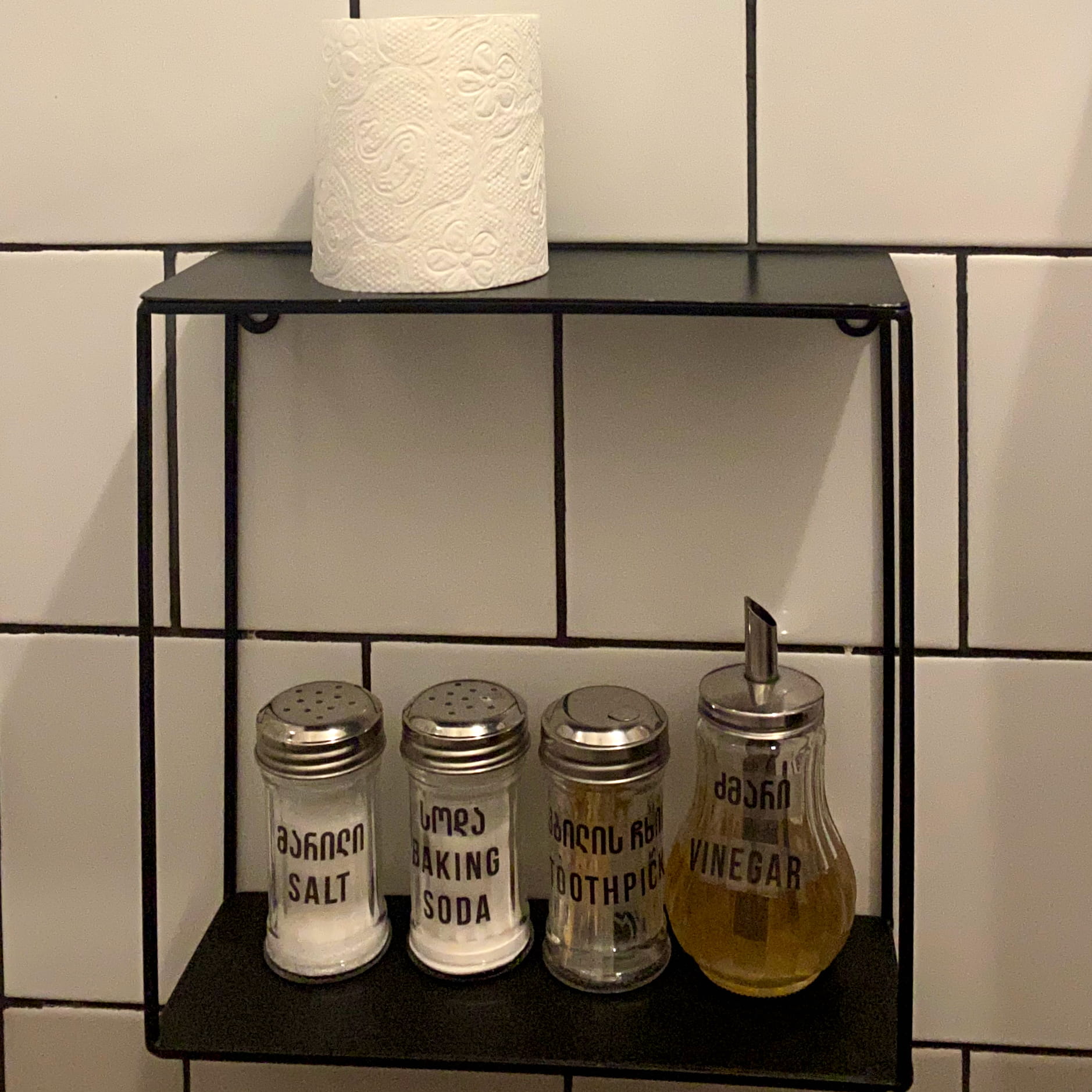
Very cute infographic accompanied by actual tools. Found in a bathroom.
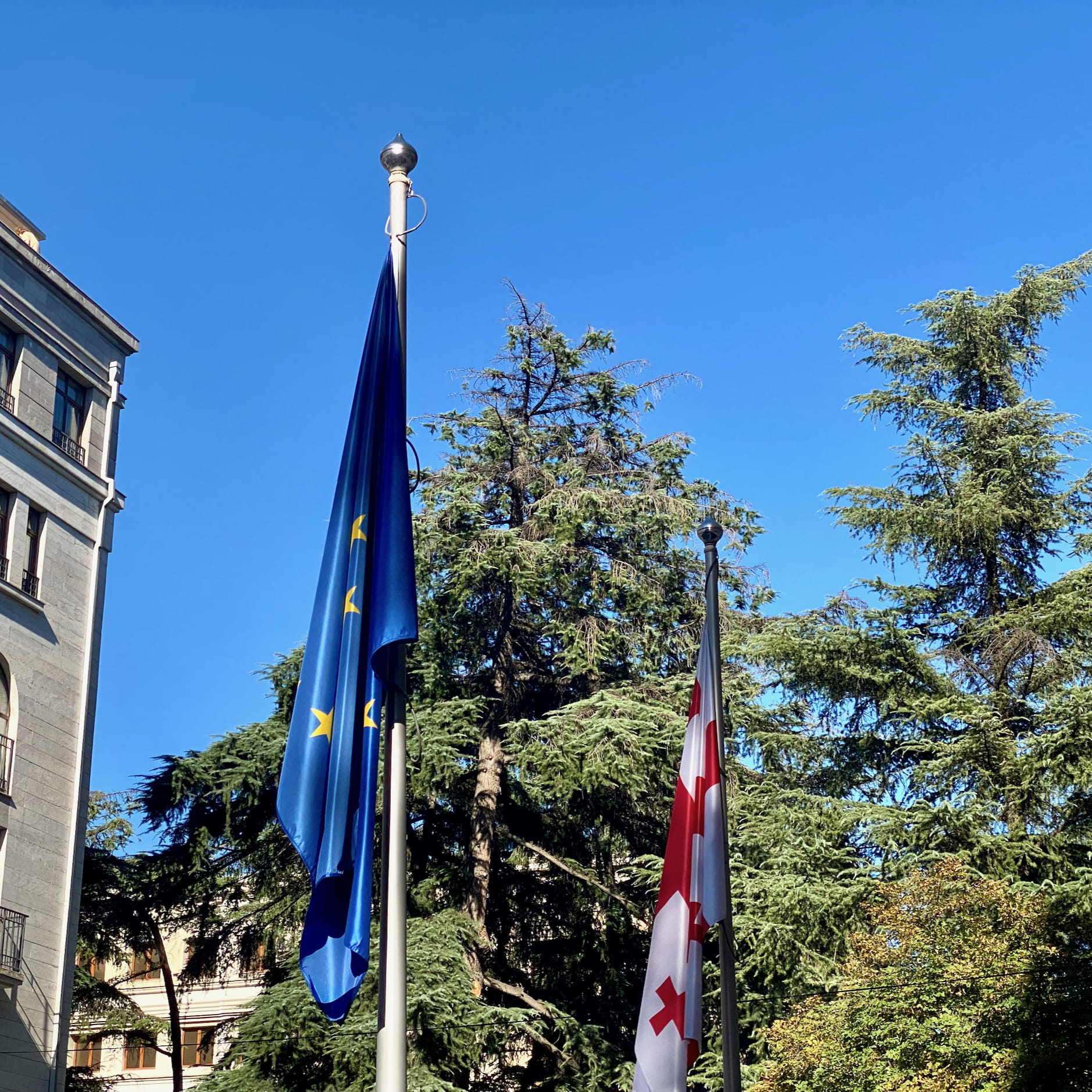
Saw a bunch of EU flags and EU-related things around. Odd, thought I—aren’t we a bit far from the rest of Europe? Turns out basically all of Georgia’s major political parties are pro joining the EU. Makes sense with the whole Russia thing. And I guess the EU wants as many on their team as they can get?
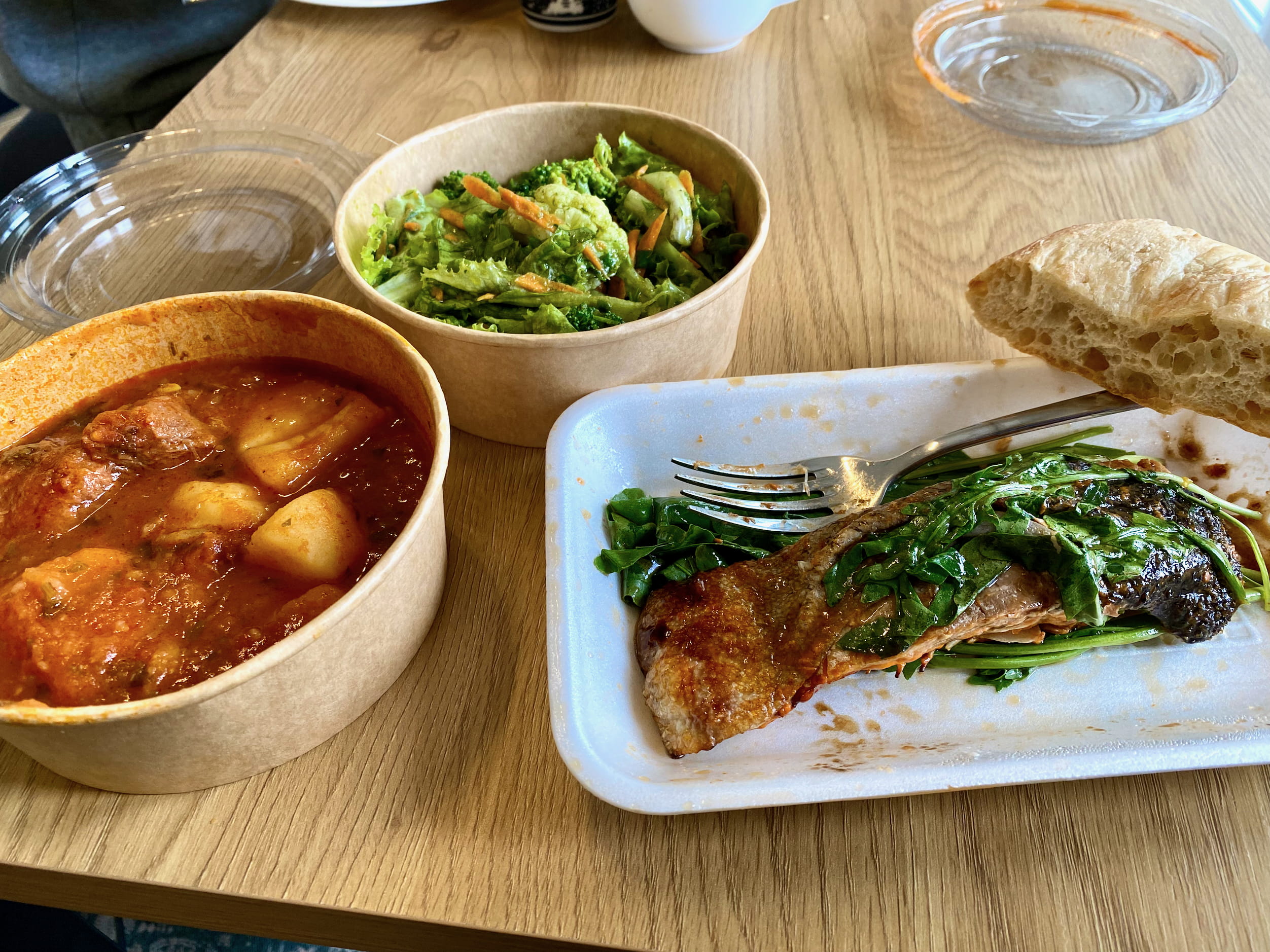
We were introduced to a neighbor of our hosts, who told us about a guy he goes to for food. Apparently for ₾80 (~= $30 USD), he eats for a week. Seemed pretty good to us. We called up the number, arranged a dropoff. Food comes. It’s good, but this is it. One small meal for the two of us. Huh. Oh well. (For context, the best cheese boat we had, which also fed both of us for one meal, was ₾22 ($8.50.))
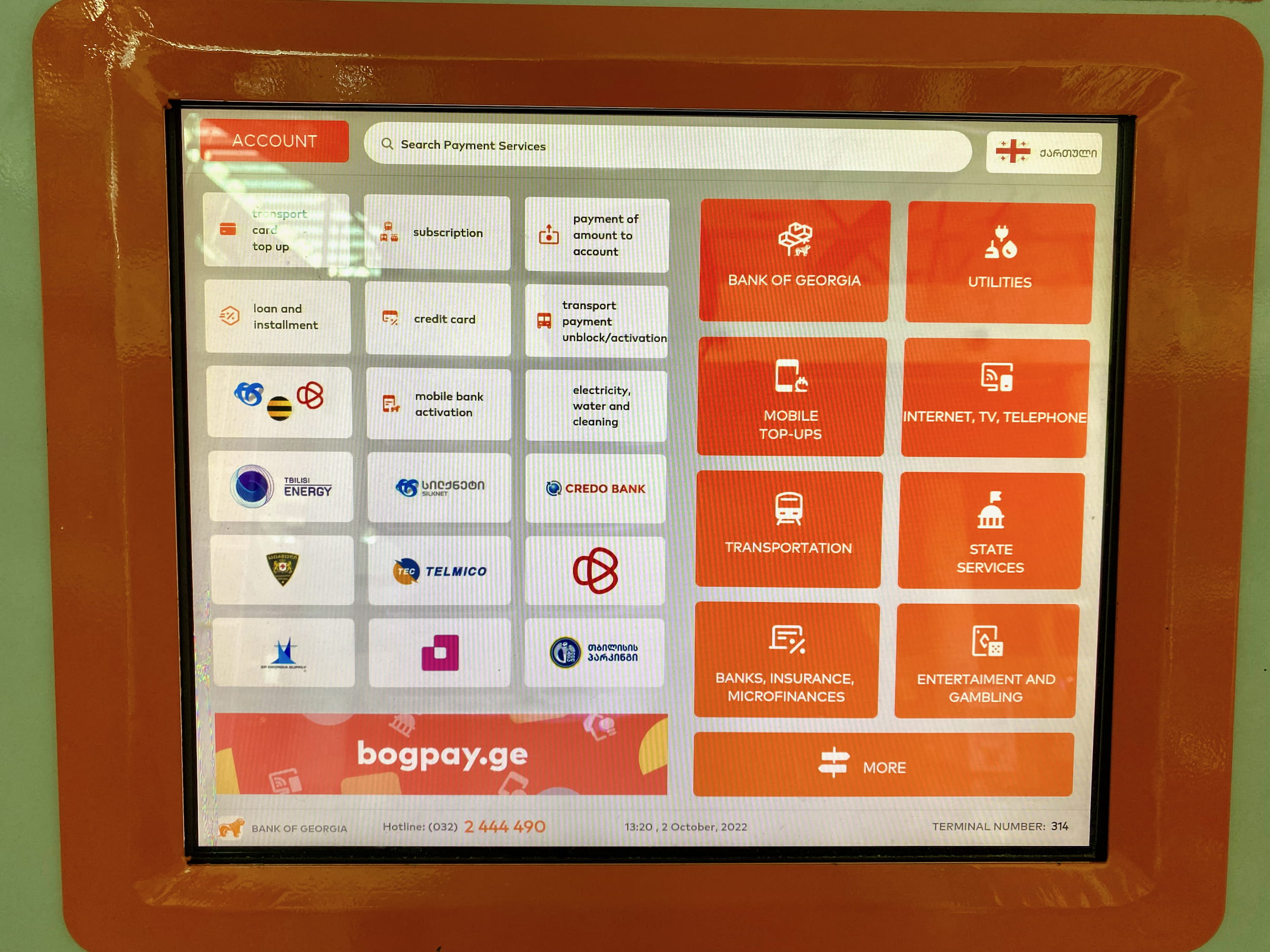
I was impressed by these Bank of Georgia machines. It seemed like you could do everything there. Load up your transit card? Sure. Pay your bills? No problem. Load up your cell phone? Pay off a loan?? Gambling??? Apparently so.
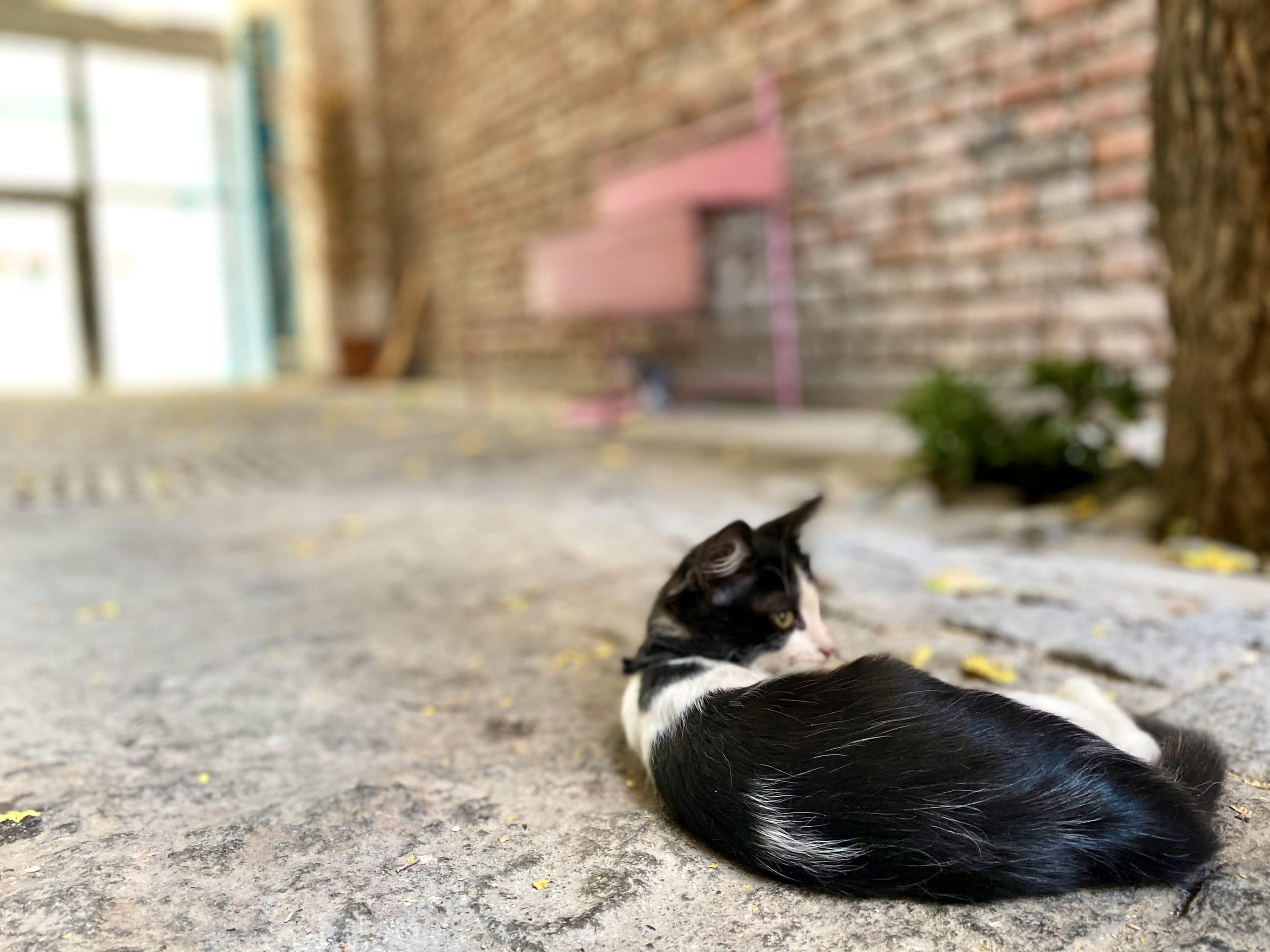
This cat was lying in an alley in a different part of Tbilisi where we stayed when we were on the way out. As we walked down the street, two people dressed like pirates walked past us, and one said to the other, “this is the most touristic part of Tbilisi.” Being there illustrated how much the district you stay in affects your perception of the whole city. Where we went from that new area had zero overlap with where we went from our previous area.
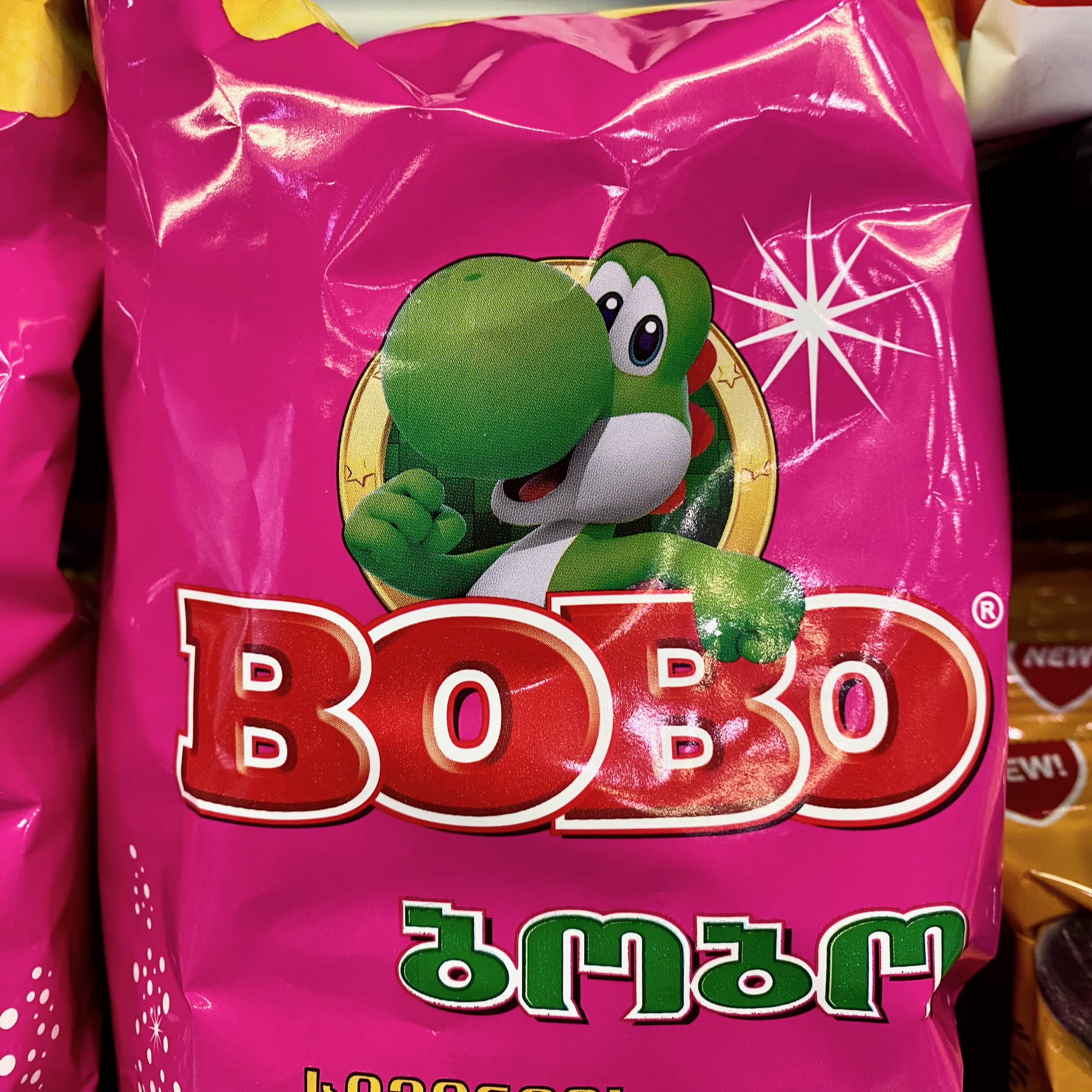
Adding this Yoshi to my collection of blatant copyright violations.
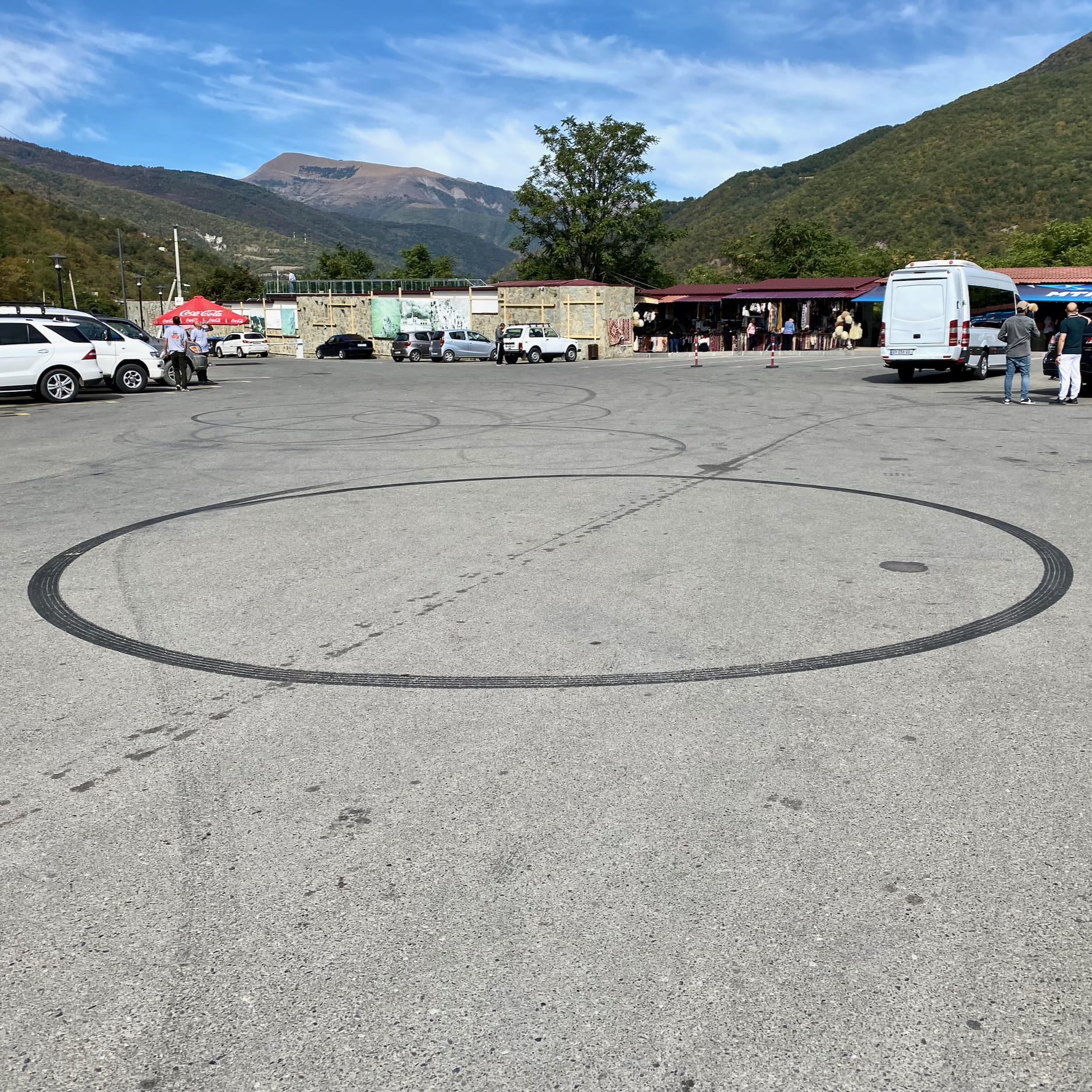
Perfect donut execution.
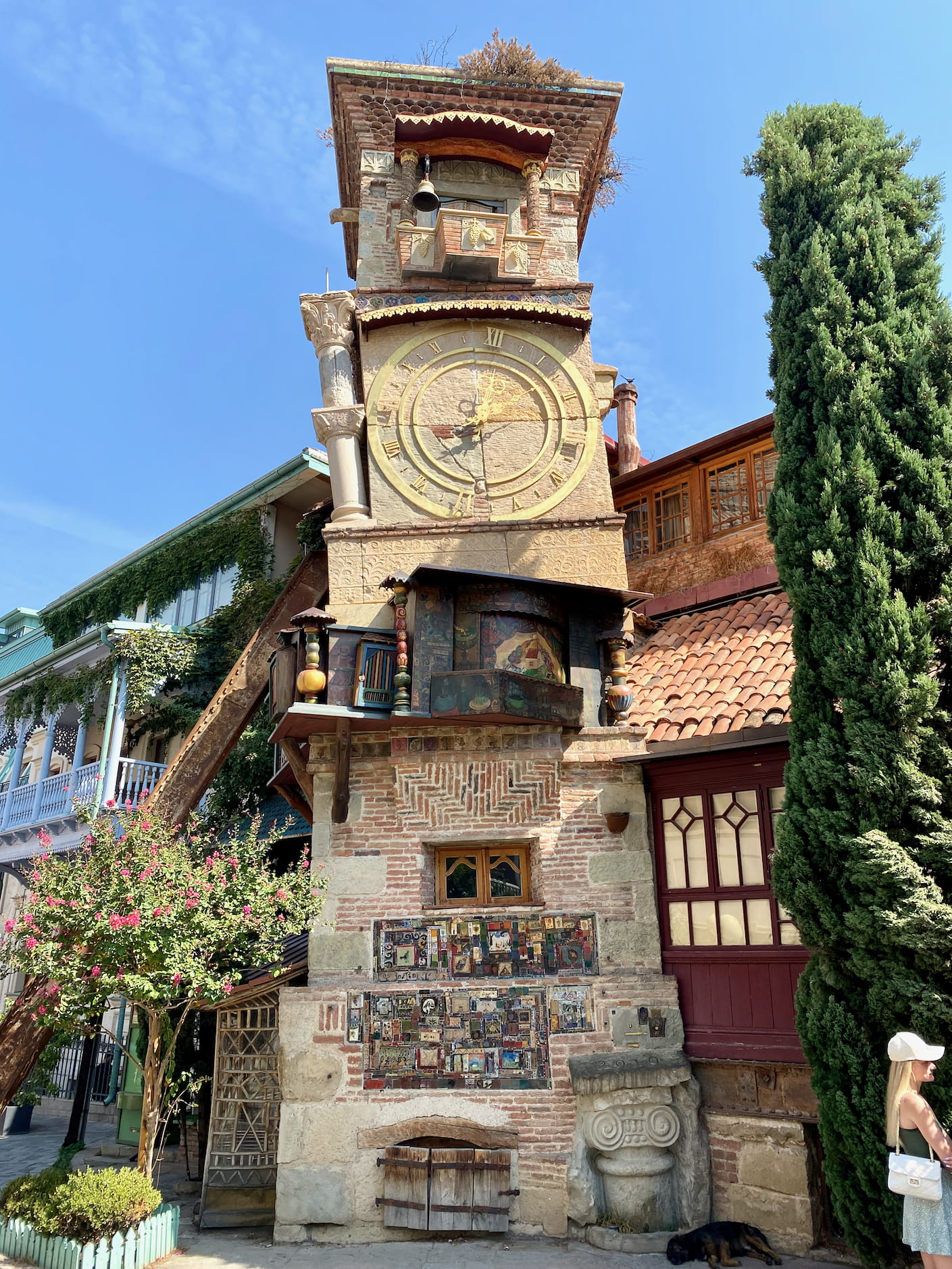
This photo illustrates a funny part of being a tourist: going to tourist locations. This clock was one of the main things we were supposed to go look at in Tbilisi. So we did. It was not special in any way. Why did we go? FOMO. It has become our classic dilemma: do we skip things we highly suspect we won’t care about at risk of missing something quintessential? Our tactic on this trip has been to just spend so long at each place that we have plenty of time to burn on a few stupid tourist things. We’d change our tactics in Vietnam, though.
Footnotes
Huh. Turns out this is where the name “Caucasian” came from, the race I apparently was for half my life until the box I’m supposed to check just became “White.” ↩︎
Also, let’s be real, I’m just lazy. For whatever reason I have no interest in doing research about a place until I’m there. ↩︎
Another small anecdote about the museum which will hopefully help convey this subtle-ish point. The museum exterior had beautiful classic architecture—green gray high arches. And inside, all walkways and walls were made of glass so clean you could easily run into them. (Though note to architects: stop making floors glass, it doesn’t work for dresses or skirts.) Even the bathrooms were the cleanest I have seen in months, with gorgeous floors and tasteful tiles and even cute urinals. But, it (the museum) was totally empty. And the elevators were both stuck on the ground floor and wouldn’t open. Here and there, lights flickered maddeningly. The water coolers all lacked jugs. It felt like there was a big initial investment, but no money for upkeep or continued progress. And so the limited staff were left to try to keep things decaying as slowly as possible. ↩︎
From a combination of all the people I talked to, the vibe I got in many places, and the bit of Wikipedia’ing, Tbilisi’s trajectory felt like growth. Though perhaps a bit shaky. ↩︎
I finally got to ask someone about what it was like in the USSR. He said that old people miss the Soviet days because they remember what was good about it. They liked the feeling of security; that the government would take care of you. (Later, I would mention this to some Belarusians we’d meet, who told me, “Yeah, and that feeling was built on a house of cards.”) After X years of work you were guaranteed an apartment. You may have had to wait in lines for basics like bread and potatoes, but they were so cheap they were effectively free. And while you couldn’t leave the USSR, it was so huge that there were plenty of travel destinations. ↩︎
OK, let’s be real, it might not be twice. We were told that there are 525 grape varietals in Georgia, and roughly 1800 different wines are made. So approximately that much more. ↩︎
While worrying at first, the gas leak was totally worth it because it ended up like something out of a sitcom. First the host was there. Then she had the cleaner come over. Then the host’s brother came. Then their neighbor came over to see what was up. Everybody’s giving advice and opening up windows and telling us not to breathe in the gas but that it’ll be fine soon. The neighbor gave us a recommendation of a local guy to buy some home cooked food from. More on that later. ↩︎
Georgia, as with seemingly everywhere else in the planet, has taxis that scam you. Why is it always taxis?! Also, the Uber wasn’t Uber but one of the other dozen knockoffs I now have on my phone and have forgotten. ↩︎
A note on bridges: the bridges in town, which do have some beautiful architecture, each contain three to five people all trying to sell you boat tours. You will be assaulted minimum once a minute. It’s bizarre and perhaps the only active tourist traps we saw in Tbilisi. ↩︎
There is a fourth downside to Tbilisi, which is that at some point a boy was so intent on putting a huge blue parrot on my shoulder that I had to literally yell at him and speed walk away. ↩︎
I asked a local whether there were any new stations opening up. He said they hadn’t made any new stations since the USSR was running the show. They’d finished a couple that were partway done, and done some renovations, but no new digging. Turns out making subways is mad expensive for a small country. ↩︎
So many churches in Europe seem to be fully converted to tourist havens. The ones in Georgia, though often with their fair share of visitors, were still quite active, and every visit we got to hear beautiful Georgian Orthodox hymns sung inside. ↩︎
If conditions are bad, the trucks can get stopped for more than hours. One driver told us he had a cousin who was stuck for two weeks. He was worried about him, and drove up the country to bring him supplies. When he got there, he found his cousin hanging with a bunch of other truck drivers, who invited them to come drink and eat with them. It turns out they were so well prepared for a long delay that they were having a blast hanging out, grilling meat and drinking beers. (I mean, now that I write that, maybe they weren’t having a blast being stuck for weeks, but you get the idea.) ↩︎
These forbidden country plates gave me the same feeling of looking at Istanbul’s airport’s departures board—just casually seeing flights to Moscow and Tehran, as well as to London and JFK. ↩︎
Our driver also said something really interesting, which was that he felt that the language one speaks affects how they think at the level of identity. ↩︎
Example: pasta: al dente noodles, great brightness to tomatoes, well-aged parmesan, sauce clinging to starch in a holy union, plus the whole flavor and composition is good and interesting but in a way that’s just reserved enough to make you want more. ↩︎